GLOBAL BRIEFING REPORT REVIEW
LEADERS & CEOs

50th anniversary of the g7 APULIA


groupofnations . COM

GLOBAL BRIEFING REPORT REVIEW
LEADERS & CEOs

50th anniversary of the g7 APULIA


groupofnations . COM
Philip Morris International is undergoing a seismic transformation to deliver on a future where cigarettes are replaced by smoke-free alternatives. Italy is one of the fundamental pillars of this transformation.
Brought to you by Philip Morris International.
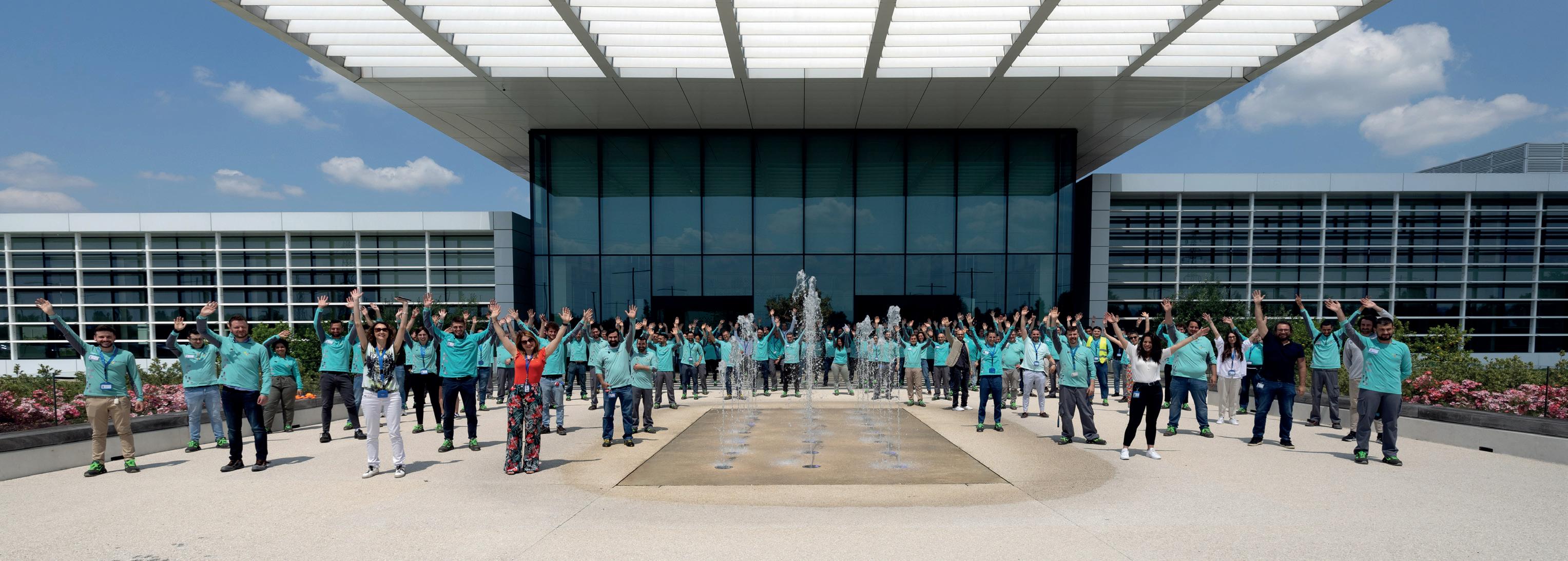

Italy is one of the leading producer of raw Around half of Italy’s annual tobacco production is purchased by PMI.
tobacco in Europe.


PMI signed multiyear agreement with Institutions and Italian farmers for investments of up to 500 million Euros (2023-2027).
Since 2014, PMI made a greenfield investment of over 1.2 billion euro to the Bologna facilities, which today employ more than 2,100 people.
PMI


Italy hosts the PMI Center of Excellence, the Bologna plant, and the PM Institute for Manufacturing Competences – global facilities responsible for prototyping, large-scale production of smoke-free products, and competency center.


PMI annual contribution to the Italian economy is approximately 0.5% of Italy’s total GDP (2022).

By Marco Hannappel (President and Managing Director, Philip Morris Italy, Vice President Southern Europe, Philip
In today’s world, we live with a greater level of uncertainty that calls for more strategic choices from our leading officials and businesses. Just as important as those strategic choices being made is the imperative that we all play our part in supporting them.
Marco Hannappel
chain made up of around 8,000 Italian companies, of which 1,000 are active in the agricultural sector.
President and Managing Director, Philip Morris Italy, Vice President Southern Europe, Philip Morris International
In today’s world, we live with a greater level of uncertainty that calls for more strategic choices from our leading officials and businesses. Just as important as those strategic choices being made is the imperative that we all play our part in supporting them.
The Business Federations of the Group of Seven (B7) includes the leading business and industry federations of G7 countries and represents the voice of business during the G7 initiatives.
The Business Federations of the Group of Seven (B7) includes the leading business and industry federations of G7 countries and represents the voice of business during the G7 initiatives. The work of the B7—supported by a high-profile Advisory Board— culminated with the definition of a B7 final declaration for the G7 presidency, aiming at conveying actionable recommendations to G7 leaders for leading the transitions that are reshaping economies and societies globally.
The work of the B7—supported by a high-profile Advisory Board— culminated with the definition of a B7 final declaration for the G7 presidency, aiming at conveying
actionable recommendations to G7 leaders for leading the transitions that are reshaping economies and societies globally.
As a member of the B7 Advisory Board, I believe that present and future challenges can only be addressed through the implementation of crossfunctional strategies, involving all productive sectors, especially those undergoing profound transformation. We need to focus on the strategic priorities identified by the G7: global value chains, promotion of training and competences, technological innovation and artificial intelligence, and green transitions.
As a member of the B7 Advisory Board, I believe that present and future challenges can only be addressed through the implementation of crossfunctional strategies, involving all productive sectors, especially those undergoing profound transformation.
For our part, I am M very proud to have been asked to participate in the B7 Advisory Board—in continuity with its key participation in the 2021 B20 Italy—and represent in such an international forum the Italian affiliate of Philip Morris International (PMI) and its “Made in Italy” integrated value
We need to focus on the strategic priorities identified by the G7: global value chains, promotion of training and competences, technological innovation and artificial intelligence, and green transitions.
For our part, I am very proud to have been asked to participate in the B7 Advisory Board—in continuity with its key participation in the 2021 B20 Italy—and represent in such an international forum the Italian affiliate of Philip Morris International (PMI) and its “Made in Italy” integrated value chain made up of around 8,000 Italian companies, of which 1,000 are active in the agricultural sector.
In its global transformation, PMI identifies Italy as one of its fundamental pillars, where an integrated value chain undergirds its operations. This PMI Italian value chain starts from the seed of the tobacco plant, continues with the large-scale production of smoke-free products (which are then distributed by leading logistics partners to a very extensive network of resellers), and ends with post-sales digital services and recycling programs for its devices
In its global transformation, PMI identifies Italy as one of its fundamental pillars, where an integrated value chain undergirds its operations. This PMI Italian value chain starts from the seed of the tobacco plant, continues with the large-scale production of smoke-free
In fact, Italy is the leading producer of raw tobacco in Europe; around half of Italy’s annual production is purchased directly from Philip Morris thanks to agreements with institutions and

business associations. The multiyear agreement signed with Institutions and farmers associations—most recently renewed in March of 2023 for 2023-2027—provides for investments of up to 500 million euro in five years, guaranteeing commercial predictability for Italian tobacco farmers. Since the early 2000s, the company has supported over 1,000 Italian companies in developing innovative agricultural management models, generating investments in agriculture for a total of around 2 billion euro.1
products (which are then distributed by leading logistics partners to a very extensive network of resellers), and ends with post-sales digital services and recycling programs for its devices.
business associations. The multiyear agreement signed with Institutions and farmers associations—most recently renewed in March of 2023 for 2023-2027—provides for investments of up to 500 million euro in five years, guaranteeing commercial predictability for Italian tobacco farmers. Since the early 2000s, the company has supported over 1,000 Italian companies in developing innovative agricultural management models, generating investments in agriculture for a total of around 2 billion euro.1
The over 2,100 people who work in Bologna produce products that are exported to more than 50 markets worldwide, with an export value higher3 than the one of olive oil or seasoned cheese in Italy. Overall, this value chain generated employment for approximately 41,000 people throughout the country and accounted for approximately 0.5% of Italy’s total gross domestic product (GDP) in 2022.4
In fact, Italy is the leading producer of raw tobacco in Europe; around half of Italy’s annual production is purchased directly from Philip Morris thanks to agreements with institutions and business associations. The multiyear agreement signed with Institutions and farmers associations—most recently renewed in March of 2023 for 20232027—provides for investments of up to 500 million euro in five years, guaranteeing commercial predictability for Italian tobacco farmers. Since the early 2000s, the company has supported over 1,000 Italian companies in developing innovative agricultural management models, generating investments in agriculture for a total of around 2 billion euro.1
Italy also hosts the Philip Morris International Center of Excellence at a global level for the prototyping and large-scale production of smokefree tobacco products and for staff training. The result of a greenfield investment of over 1.2 billion euro since 20142, the Bologna plant is now PMI’s lead site where industrial processes to produce innovative products are defined. The knowledge developed there is then exported abroad as a fundamental asset in the reconversion phase of the group’s other production facilities.
Italy also hosts the Philip Morris International Center of Excellence at a global level for the prototyping and large-scale production of smokefree tobacco products and for staff training. The result of a greenfield investment of over 1.2 billion euro since 20142, the Bologna plant is now PMI’s lead site where industrial processes to produce innovative products are defined. The knowledge developed there is then exported abroad as a fundamental asset in the reconversion phase of the group’s other production facilities.
The over 2,100 people who work in Bologna produce products that are exported to more than 50 markets worldwide, with an export value higher3 than the one of olive oil or seasoned cheese in Italy. Overall, this value chain generated employment for approximately 41,000 people throughout the country and accounted for approximately 0.5% of Italy’s total gross domestic product (GDP) in 2022.4
tobacco products and for staff training. The result of a greenfield investment of over 1.2 billion euro since 20142, the Bologna plant is now PMI’s lead site where industrial processes to produce innovative products are defined. The knowledge developed there is then exported abroad as a fundamental asset in the reconversion phase of the group’s other production facilities.
The Philip Morris Institute for Manufacturing Competences (IMC), the company’s advanced competence center for Industry 4.0, was launched in June 2022 within the Bologna industrial site. In 2023, thanks to partnerships with universities, polytechnics, national and local institutions, and other competence centers, more than 20,000 hours of training were provided not only to people who worked in and with Philip Morris and its value chain, but also to other economic, business, and institutional stakeholders.
Italy also hosts the Philip Morris International Center of Excellence at a global level for the prototyping and large-scale production of smokefree

The over 2,100 people who work in Bologna produce products that are exported to more than 50 markets worldwide, with an export value higher3 than the one of olive oil or seasoned cheese in Italy. Overall, this value chain generated employment for approximately 41,000 people throughout the country and accounted for approximately 0.5% of Italy’s total gross domestic product (GDP) in 2022.4
The Philip Morris Institute for Manufacturing Competences (IMC), the company’s advanced competence center for Industry 4.0, was launched in June 2022 within the Bologna industrial site. In 2023, thanks to partnerships with universities, polytechnics, national and local institutions, and other competence centers, more than 20,000 hours of training were provided not only to people who worked in and with Philip Morris and its value chain, but also to other economic, business, and institutional stakeholders.
The Philip Morris Institute for Manufacturing Competences (IMC), the company’s advanced competence center for Industry 4.0, was launched in June 2022 within the Bologna industrial site. In 2023, thanks to partnerships with universities, polytechnics, national and local institutions, and other competence centers, more than 20,000 hours of training were provided not only to people who worked in and with Philip Morris and its value chain, but also to other economic, business, and institutional stakeholders.
To close out the global value chain, we must consider the end of a product’s life cycle. Within Philip Morris’s objective to achieve ambitious standards of waste recycling for a circular economy, the company recently presented a new initiative in Italy aimed at recycling up to 500,000 smoke-free devices by 2024,
To close out the global value chain, we must consider the end of a product’s life cycle. Within Philip Morris’s objective to achieve ambitious standards of waste recycling for a circular economy, the company recently presented a new initiative in Italy aimed at recycling up to 500,000 smoke-free devices by 2024,
To close out the global value chain, we must consider the end of a product’s life cycle. Within Philip
“PMI’s smoke-free transformation serves as a catalyst to strengthen our global value chain, by making it more competitive as well as sustainable.”
“PMI’s smoke-free transformation serves as a catalyst to strengthen our global value chain, by making it more competitive as well as sustainable.”
PMI’S SMOKE-FREE TRANSFORMATION SERVES AS A CATALYST TO STRENGTHEN OUR GLOBAL VALUE CHAIN, BY MAKING IT MORE COMPETITIVE AS WELL AS SUSTAINABLE.
with a target of an average recovery of over 80% of the raw materials present in the devices. These raw materials that are recovered and recycled are considered essential for many industrial activities.
with a target of an average recovery of over 80% of the raw materials present in the devices. These raw materials that are recovered and recycled are considered essential for many industrial activities.
Morris’s objective to achieve ambitious standards of waste recycling for a circular economy, the company recently presented a new initiative in Italy aimed at recycling up to 500,000 smoke-free devices by 2024, with a target of an average recovery of over 80% of the raw materials present in the devices. These raw materials that are recovered and recycled are considered essential for many industrial activities.
PMI’s smoke-free transformation serves as a catalyst to strengthen our global value chain, by making it more competitive as well as sustainable. I believe that the work carried out by the B7 underlines the need to enhance value chains, make them safer, closer, and more resilient to external shocks.
PMI’s smoke-free transformation serves as a catalyst to strengthen our global value chain, by making it more competitive as well as sustainable. I believe that the work carried out by the B7 underlines the need to enhance value chains, make them safer, closer, and more resilient to external shocks.
PMI’s smoke-free transformation serves as a catalyst to strengthen our global value chain, by making it more competitive as well as sustainable. I believe that the work carried out by the B7 underlines the need to enhance value chains, make them safer, closer, and more resilient to external shocks.
To build successful global value chains, common rules and principles among G7 countries and with extra-G7 countries must be defined—this is essential so that dependencies in critical sectors can be addressed through coordinated policy actions and collaborative efforts. Existing barriers to trade and in investment must be eliminated, while new barriers should not be adopted.
To build successful global value chains, common rules and principles among G7 countries and with extra-G7 countries must be defined—this is essential so that dependencies in critical sectors can be addressed through coordinated policy actions and collaborative efforts. Existing barriers to trade and in investment must be eliminated, while new barriers should not be adopted.
When all is said and done, the long-term partnership model between private organizations and the public sector will enable value chains—and the entities that compose them— to respond effectively to present and future economic and geopolitical crises.
Brought to you by Philip Morris International.
Brought to you by Philip Morris International.
To build successful global value chains, common rules and principles among G7 countries and with extra-G7 countries must be defined—this is essential so that dependencies in critical sectors can be addressed through coordinated policy actions and collaborative efforts. Existing barriers to trade and in investment must be eliminated, while new barriers should not be adopted. When all is said and done, the long-term partnership model between private organizations and the public sector will enable value chains—and the entities that compose them— to respond effectively to present and future economic and geopolitical crises. Brought to you by Philip Morris International. ■
When all is said and done, the long-term partnership model between private organizations and the public sector will enable value chains—and the entities that compose them— to respond effectively to present and future economic and geopolitical crises.



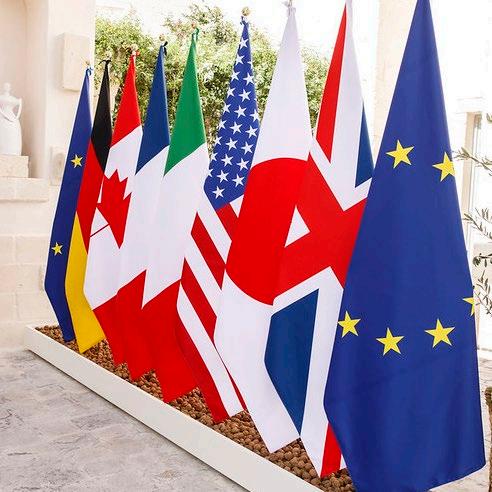


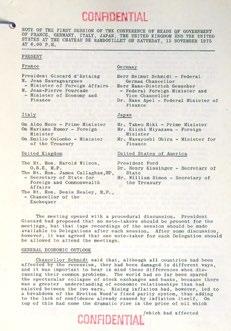



As the airline that connects more countries than any other, Turkish Airlines offers the opportunity of discovering world’s connection center Istanbul and its unique wonders with stopover service for passengers with lengthy transfer times.

At least 72 hours before their first flight, passengers can make a reservation on www.turkishairlines.com with the PNR and surname information or by sending their requests to the e-mail address corresponding to their country of departure on the website.
Turkish Airlines invites passengers to discover unique wonders of Istanbul with complementary stopover accommodation service.

For passengers with a voluntary connection period of at least 20 hours in Istanbul, Turkish Airlines provides 1-night stay in a 4-star hotel for Economy Class and 2 nights stay in a 5-star hotel for Business Class. Passengers will also have the option of staying at contracted hotels with special prices starting from 49 USD.

Transfer passengers from 66 countries* experienced the privilege of discovering Istanbul with stopover service so far. For more people to explore Istanbul, stopover service will be expanded with 29 new countries** until the end of 2023.
Terms and conditions apply, visit turkishairlines.com
*66 countries (departure point): Algeria, Angola, Argentina, Australia, Azerbaijan, Bangladesh, Belarus, Belgium, Brazil, Canada, China, Colombia, Croatia, Denmark, Egypt, Estonia, Ethiopia, Finland, Georgia, Ghana, Greece, India, Iran, Ireland, Italy, Ivory Coast, Japan, Jordan, Kazakhstan, Kenya, Kuwait, Latvia, Lebanon, Lithuania, Malaysia, Mauritius, Mexico, Morocco, Nepal, Netherlands, Nigeria, Norway, Oman, Pakistan, Panama, Poland, Portugal, Qatar, Romania, Russia, Saudi Arabia, Serbia, South Africa, South Korea, Spain, Sweden, Switzerland, Tanzania, Thailand, Tunisia, Ukraine, United Arab Emirates, United Kingdom, United States of America and Venezuela.
**Planned 29 countries (departure point): Austria, Bahrain, Bosnia and Herzegovina, France, Germany, Hong Kong, Hungary, Indonesia , Israel, Kosovo, Luxembourg, Macedonia, Maldives , Mali, Malta, Mauritania, Mongolia , Mozambique, New Zealand , Philippines, Senegal, Seychelles, Singapore , South Sudan, Sri Lanka , Taiwan, Tajikistan, Vietnam and Zambia.

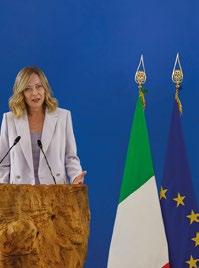

Chris Atkins PUBLISHER, CEO & FOUNDER
Dear Valued Readers,
As we unveil our 28th issue, the G7 Italy 2024 Global Briefing Report Review, I am filled with a sense of pride and responsibility. Over the years, we have endeavored to present you with comprehensive, insightful, and timely analyses of the world’s most significant international forums, and this edition is no exception.
Italy, with its rich tapestry of history and innovative spirit, plays a pivotal role in the G7. In this issue, we delve deep into the discussions, debates, and decisions that are shaping the world under Italy’s G7 presidency. From intricate economic dynamics to pressing global challenges, we offer an unparalleled view into the heart of these high-level meetings.
We understand the importance of accurate, unbiased, and impactful reporting, especially
when covering events of such magnitude. Our dedicated team of writers, analysts, and field reporters have worked tirelessly to ensure every piece of information presented is both enlightening and actionable.
This is more than just a report. It is a testament to the interconnectedness of our world, the challenges we face, and the collaborative spirit with which we can overcome them. We hope it serves as a valuable resource, providing clarity amidst the complex world of international relations and policy-making.
Thank you for your continued trust and readership. As always, we remain committed to informing, educating, and inspiring you. Here’s to many more editions of global understanding and collaboration.
Warm regards






As the world grapples with the urgent need to mitigate climate change and adhere to the 1.5-degree Celsius target outlined in the Paris Agreement, the demand for robust and high-integrity carbon markets has never been more critical. Despite the potential of naturebased solutions (NBS) and carbon credits to drive substantial reductions in greenhouse gas emissions, only a meager 6.4% of existing environmental credits are likely to meet the Core Carbon Principles and guidelines set forth by the Voluntary Carbon Markets Integrity Initiative (VCMI). This glaring shortfall underscores the pressing need for increased investment to enhance capacity, transparency, and traceability in the carbon markets.
Carbon markets offer a powerful mechanism to drive investment into
climate mitigation projects, particularly those based on natural solutions such as reforestation, biochar production, hemp cultivation, and seaweed farming. These initiatives not only sequester carbon but also provide co-benefits such as biodiversity conservation, improved water quality, and enhanced livelihoods for local communities. However, to unlock their full potential, significant investment is required to scale up these projects and ensure their integrity.
The current landscape of carbon credits reveals a stark disparity between supply and demand. The primary challenge lies in the credibility and effectiveness of these credits. According to recent analyses, only a small fraction of issued credits are likely to conform to the stringent criteria necessary for high-integrity carbon
offsets. This issue is compounded by the need for robust Monitoring, Reporting, and Verification (MRV) systems to ensure transparency and accountability.
The Corporate Sustainability Reporting Directive (CSRD) and other emerging standards mandate comprehensive audit trails at the project level, requiring high levels of traceability and data on co-benefits. This necessitates advanced technological solutions and significant capacity-building efforts.
To address these challenges, strategic investment in capacity building is essential. Philanthropic funding, along with support from multilateral development banks (MDBs) and other financial institutions, can play a pivotal role. According to the Voluntary Carbon Markets Integrity
Initiative (VCMI), there are several key areas where investment can make a substantial impact:
1. Policy and Regulatory Frameworks: Strengthening national policies and regulations to create an enabling environment for carbon markets is crucial. This includes aligning with international standards and ensuring consistency across jurisdictions.
2. Institutional Strengthening and Governance: Developing robust institutional frameworks and governance structures to oversee carbon market activities is vital. This includes capacity building for government agencies, establishing inter-ministerial coordination mechanisms, and fostering public-private partnerships.
3. Knowledge and Capacity Building: Investing in training and education for stakeholders across the carbon market value chain is essential. This includes building technical expertise in MRV, enhancing understanding of market dynamics, and fostering innovation in carbon sequestration technologies.
4. Project Implementation and Financing: Providing financial support for the development and implementation of high-quality carbon projects is crucial. This includes de-risking investments through mechanisms such as credit insurance for carbon forwards and creating long-term offtake agreements to ensure market stability.
Enhancing Market Integrity
Ensuring the integrity of carbon markets is paramount to their success. The establishment of Core Carbon Principles (CCPs) and the implementation of guidelines by bodies such as the VCMI and the Integrity Council for the Voluntary Carbon Market (ICVCM) are essential steps in this direction. These principles emphasize transparency, additionality, permanence, and the avoidance of double counting. The role of auditing in sustainability reporting cannot be overstated.

ONE OF THE MOST EFFECTIVE NATUREBASED SOLUTIONS, REFORESTATION, INVOLVES PLANTING TREES ON DEGRADED LAND TO SEQUESTER CARBON AND RESTORE ECOSYSTEMS.
Rigorous audit processes and verification mechanisms are necessary to validate the environmental and social impacts of carbon projects. This includes leveraging advanced technologies such as blockchain for traceability and using remote sensing and AI for monitoring and verification.
Reforestation and egenerative
Reforestation: One of the most effective nature-based solutions, reforestation, involves planting trees on degraded land to sequester carbon and restore ecosystems. Investing in large-scale reforestation projects can significantly enhance carbon stocks while providing biodiversity and socio-economic benefits. Successful examples include the Great Green Wall in Africa and the Trillion Trees Initiative, which aim to restore millions of hectares of degraded land.
Regenerative Agriculture: This approach focuses on farming practices that restore soil health, increase biodiversity, and sequester carbon. Techniques such as cover cropping, no-till farming, and agroforestry not only capture carbon but also improve water retention and crop resilience. Investment in regenerative agriculture can transform food systems, making them more sustainable and climateresilient. If you haven’t seen Kiss the Ground and Commend Ground documentaries - check them out as soon as possible.
Green Bonds: These are financial instruments designed to raise capital for projects with environmental benefits. Green bonds have become a critical tool for financing large-scale NBS projects. They provide a reliable source of funding for initiatives such as renewable energy, energy efficiency, and sustainable agriculture. The green bond market has grown exponentially, with issuances reaching record levels in recent years.
Blue Bonds: Blue bonds specifically finance marine and coastal conservation projects. These bonds support initiatives like coral reef restoration, sustainable fisheries, and marine protected areas. By addressing the health of ocean →
→ ecosystems, blue bonds play a crucial role in mitigating climate change and preserving biodiversity.
Several innovative projects and financial instruments are setting new benchmarks in the carbon markets:
Biochar Production: Biochar, a form of charcoal produced from organic waste, is gaining traction for its ability to sequester carbon while improving soil health. Investments in biochar projects are increasing, driven by their potential for scalability and multiple co-benefits.
Hemp Cultivation: Hemp is emerging as a promising crop for carbon sequestration due to its fast growth rate and high biomass yield. Investment in hemp-based carbon credits is growing, supported by advancements in cultivation techniques and processing technologies.
Seaweed Farming: Seaweed farming is being recognized for its potential to sequester carbon and mitigate ocean acidification. Investments in seaweedbased carbon credits are on the rise, supported by research into its ecological benefits and commercial viability.
Pulsora and EcoAdvis Partnership:
This promising collaboration leverages blockchain technology to enhance sustainability reporting and emissions tracking. Through the EcoSpera platform, detailed audit trails can be maintained down to the individual plant level, providing unprecedented transparency and traceability. Satellite imagery with 1.5-meter resolution further enhances the accuracy and reliability of data collection. You can read more about this at www.futureinsight.green
The Path Forward
To achieve the 1.5-degree Celsius target and ensure the sustainability of our planet, it is imperative to scale up investment in high-integrity carbon markets. This requires a concerted effort from governments, financial institutions,

BY FOSTERING INNOVATION, ENHANCING CAPACITY, AND ENSURING TRANSPARENCY, WE CAN UNLOCK THE FULL POTENTIAL OF NATUREBASED SOLUTIONS AND DRIVE MEANINGFUL CLIMATE ACTION.
philanthropic organizations, and private sector stakeholders. By fostering innovation, enhancing capacity, and ensuring transparency, we can unlock the full potential of nature-based solutions and drive meaningful climate action.
The need for high-quality carbon credits that meet stringent integrity criteria is more pressing than ever. With only a fraction of current credits likely to achieve this standard, significant investment in capacity building and technological innovation is essential. By aligning efforts across the global community and leveraging the unique strengths of each stakeholder, we can create a robust and effective carbon market that supports sustainable development and climate resilience.
VCMI Releases New Framework: The Voluntary Carbon Markets Integrity Initiative has released its latest framework to guide the development
0f high-integrity carbon markets. This framework emphasizes transparency, accountability, and inclusivity, providing a comprehensive set of guidelines for market participants.
for Carbon Projects: The United NationsDevelopment Programme (UNDP) has announced a substantial funding initiative to support carbon market projects in developing countries. This funding aims to enhance capacity, improve MRV systems, and promote sustainable development.
Reporting Standards: The European Union has introduced new regulations under the Corporate Sustainability Reporting Directive (CSRD) to enhance the transparency and credibility of sustainability reports. These regulations require detailed audit trails and verification processes, ensuring the integrity of reported data. It has now been extended with the Corporate Sustainability Reporting Due Diligence Directive (CSRDDD) and it is already being implemented.
A new Blue Bond initiative has been launched to support marine conservation projects that generate carbon credits. This initiative aims to attract investment by offering financial incentives and promoting the ecological benefits of marine ecosystems.
Gain Traction: Biochar projects are gaining momentum with increased investment and technological advancements. These projects offer a scalable solution for carbon sequestration and soil health improvement, attracting interest from both public and private sectors. By staying ahead of these developments and supporting highintegrity carbon markets, we can collectively drive the transition to a sustainable and resilient future. We need to focus on financing nature based high quality projects and help nature. ■ ecoadvis.com/join

Chartered Professional Accountants (CPAs) can help your organization make more informed decisions — and increase resilience — in the face of climate change.
How? By identifying climate-related risks and opportunities. By estimating financial impacts and performing scenario analyses. By advising on long-term business performance.
Need a strategic response to climate change? Enlist a CPA.
In the heart of every seed lies the potential for incredible growth. Just as the moringa seed holds the promise of nourishment and renewal, our platform lays the groundwork for a sustainable future.




With the world's first global standard for environmental credit, from plant to seed, we're not just planting seeds—we're nurturing the very foundation of environmental stewardship.


Join us in sowing the seeds of change, where every credit supports verified, tangible environmental regeneration. Together, we can cultivate a greener, more sustainable world. From the ground up, let's build a legacy of growth and resilience for generations to come.













The bloom of the moringa flower is a testament to what can be achieved when we commit to nurturing our environment. It symbolizes the flourishing beauty and tangible benefits that stem from our dedication to sustainability and regenerative practices.


Our platform is more than a bridge between intention and action; it's a catalyst for real-world change. Through our comprehensive audit trail, from seed to standard, we ensure that every environmental credit contributes to a healthier, more vibrant planet.

This is the power of transformation, visible in the vibrant petals of the moringa and felt through the positive impact of each credit. Embrace the beauty of making a difference. Together, we're not just growing flowers—we're cultivating a legacy of environmental regeneration and hope for future generations.
Start Your Journey with a Seed of Change
Read more: https://www.ecospera.com/join/



In a world where environmental consciousness shapes consumer preferences, the hospitality industry stands at the forefront of a significant transformation. This sector, historically associated with luxury and comfort, now faces the urgent need to integrate sustainability into its core operations.
As travelers increasingly seek experiences that align with their values, embracing green practices becomes not just an ethical choice, but a competitive necessity.
This article delves into the industry’s journey towards sustainability, exploring the challenges, opportunities, and pioneering examples that highlight the potential for luxury and environmental stewardship to coexist harmoniously.
Over two decades in the sustainable hospitality sector reveal a landscape transformed by evolving consumer expectations and a profound
understanding of our environmental impact. This journey from traditional luxury to green luxury underscores an industry-wide shift towards practices that honor ecological stewardship without compromising on the quality of the guest experience.
The initial reluctance to adopt green practices stemmed from misconceptions about cost and guest satisfaction. However, pioneering establishments soon demonstrated that sustainable operations could reduce long-term expenses and enhance brand reputation. Innovations such as rainwater harvesting, solar energy, and zero-waste kitchens have set new benchmarks, proving sustainability’s viability and profitability.
One of the persistent challenges has been the significant initial investment required for sustainable technologies.
Yet, with advancements in green technology and increased availability of funding options, these hurdles are becoming surmountable. Operational disruptions, another major concern, are addressed through strategic planning and staff training, ensuring a seamless transition to greener practices.
Elevating consumer awareness has been crucial. Early on, the demand for sustainable options was limited, but today, informed travelers actively seek out eco-friendly accommodations. This shift has been driven by targeted marketing, transparent communication about sustainability efforts, and engaging guests in these initiatives.
Reflecting on the past twenty years, it’s clear the hospitality industry’s journey towards sustainability is not just about environmental responsibility but also about redefining luxury in the 21st
century. As we look to the future, the continuous evolution of sustainable practices will remain key to meeting the dynamic expectations of travelers and preserving our planet for generations to come.
Expanding the original article to include detailed insights on the Michelin Green Star and ISO 21401, alongside the implications of the EU’s Corporate Sustainability Reporting Directive (CSRD) and the European Sustainability Reporting Standards (ESRS), offers a holistic view of the sustainability trajectory in the hospitality sector. The updated narrative delves into the criteria and impact of these certifications and standards, providing a richer understanding of their role in promoting sustainable practices.
The Hospitality Industry’s Path Forward
The hospitality industry is at a pivotal moment, where the convergence of regulatory frameworks and voluntary certifications is reshaping the landscape of sustainable operations. The integration of global sustainability goals into business practices is now a paramount objective, driven by consumer demand, environmental imperatives, and legislative mandates.
Green Star and ISO 21401: Pioneers
The Michelin Green Star represents the pinnacle of sustainable gastronomy, awarded to restaurants that demonstrate exemplary commitments to sustainability. Criteria for this prestigious recognition include the sourcing of ingredients, the use of seasonal produce, efficient waste management systems, and a strong commitment to ethical and environmental standards. Since its inception in 2020, the Michelin Green Star has highlighted the efforts of restaurants working closely with local producers, employing regenerative methods, and engaging in charitable and educational projects to promote sustainability(60†source)(61†source).
ISO 21401, on the other hand, provides a framework for sustainable management within the tourism sector, focusing on environmental, social, and economic
practices. It guides tourism accommodations on implementing sustainable practices that minimize their environmental impact while enhancing efficiency and stakeholder relationships.
The EU’s CSRD and ESRS are setting new precedents in sustainability reporting, requiring a broad array of companies to disclose their social and environmental impacts. These frameworks aim to bring sustainability reporting to the same standard as financial reporting, ensuring transparency and comparability.
The ESRS, in particular, emphasize the principle of double materiality, requiring disclosures on a wide range of topics following thorough materiality assessments. These standards are not only reshaping how companies report on sustainability but also how they integrate sustainable practices intotheir core operations(46†source) (47†source)(48†source).
For the hospitality industry, these developments signal a shift towards more rigorous sustainability practices and reporting. Adapting to the CSRD and ESRS will require businesses to assess and report on a range of environmental, social, and governance matters, from the governance of sustainability topics to the impacts, risks, and opportunities across their value chain. This aligns with the criteria set by the Michelin Green Star and ISO 21401, further emphasizing the industry’s move towards comprehensive sustainability.
Defining a new era for hospitality
The intersection of voluntary certifications like the Michelin Green Star and ISO 21401 with regulatory mandates such as the CSRD and ESRS is defining a new era for the hospitality industry. This convergence underscores a growing commitment to sustainability that transcends traditional boundaries, embodying a comprehensive approach to environmental stewardship, social

THE MICHELIN GREEN STAR REPRESENTS THE PINNACLE OF SUSTAINABLE GASTRONOMY, AWARDED TORESTAURANTS THAT DEMONSTRATE EXEMPLARY COMMITMENTS TO SUSTAINABILITY.
responsibility, and governance. As the industry continues to evolve, these frameworks will play a crucial role in shaping its sustainable future.
Villa Petriolo: A Model of Sustainable Luxury in the Heart ofTuscany
Nestled amidst the rolling hills of Tuscany, Villa Petriolo stands as a paragon of sustainable luxury, seamlessly blending the rich heritage of Italian agriturismo with cutting-edge environmental stewardship. This article explores the transformative journey of Villa Petriolo, showcasing its commitment to sustainability, the innovative practices it has adopted, and the broader implications of its success for the hospitality industry.
Embracing Sustainability with Tradition
Villa Petriolo, a centuries-old estate, has embarked on an ambitious quest to infuse sustainability into the fabric of its operations without sacrificing →
→ its historical essence. The estate’s approach is holistic, extending from the PS Ristorante, which champions a farm-to-table philosophy, to the SPA Mater, offering treatments with organically sourced products. The estate manager and key personnel have navigated the challenges of integrating modern eco-friendly technologies into the villa’s historic framework, achieving a harmonious balance between preserving tradition and embracing innovation. Initiatives include utilizing solar energy, water recycling systems, and organic farming practices that honor the villa’s legacy while safeguarding the environment.
The transition to sustainability was fraught with challenges, from integrating eco-friendly technologies into the villa’s historical architecture to managing the economic implications of such investments. However, Villa Petriolo turned these challenges into opportunities for growth and innovation, demonstrating that with patience, persistence, and community engagement, it is possible to achieve a sustainable business model that respects tradition while looking forward.
The Villa’s journey underscores several key lessons for the hospitality industry:
• Patience and Persistence: Transitioning to sustainable practices is a gradual process that requires time, effort, and adaptation.
• Community Engagement: Building strong relationships with local producers and the community is crucial for a sustainable business model.
• Balancing Tradition and Innovation: It is possible to preserve historical integrity while embracing modern sustainability practices.
Villa Petriolo’s sustainability initiatives have had profound environmental, social, and economic impacts:
• Environmental Impact: The adoption of solar power and sustainable farming practices has led to a significant
reduction in carbon emissions and water usage.
• Social Impact: Focusing on local sourcing and employment has bolstered the local economy, increased job satisfaction, and strengthened community ties.
• Economic Impact: Despite the high initial investments, the return on investment has been positive, with an increase in guest bookings attributed to the villa’s reputation as a sustainable luxury destination.
Villa Petriolo’s journey towards sustainability offers a compelling case study of how luxury and environmental stewardship can coexist. Through innovative solutions, a commitment to the community, and respect for tradition, Villa Petriolo has set a new benchmark for sustainable luxury in the hospitality industry. Its success story illustrates that embracing sustainability is not only beneficial for the environment but can also enhance guest experiences, support local communities, and contribute to the economic viability of luxury estates. Villa Petriolo stands as a beacon of inspiration, proving that with vision and dedication, it is possible to chart a sustainable future for luxury hospitality.
Concluding this article on sustainability in the hospitality industry, we reflect on the journey from the foundational challenges and opportunities outlined, through the evolving landscape of certifications and standards, to the inspiring case study of Villa Petriolo. This progression underscores a pivotal shift in the industry towards embracing and implementing sustainable practices at every level.
Villa Petriolo, with its commitment to sustainable agriculture, renewable energy, and community engagement, exemplifies the tangible impact that dedication to sustainability can have. It’s a testament to the hospitality industry’s potential to innovate and lead by example in the broader quest
VILLA PETRIOLO, WITH ITS COMMITMENT TO SUSTAINABLE AGRICULTURE, RENEWABLE ENERGY, AND COMMUNITY ENGAGEMENT, EXEMPLIFIES THE TANGIBLE IMPACT THAT DEDICATION TO SUSTAINABILITY CAN HAVE. IT’S A TESTAMENT TO THE HOSPITALITY INDUSTRY’S POTENTIAL TO INNOVATE AND LEAD BY EXAMPLE IN THE BROADER QUEST FOR ENVIRONMENTAL STEWARDSHIP AND SOCIAL RESPONSIBILITY.
for environmental stewardship and social responsibility.
As we look to the future, the insights gleaned from these discussions illuminate a path forward marked by increased transparency, accountability, and a deep-seated commitment to the planet and its people. The hospitality industry, with its global reach and influence, is uniquely positioned to drive meaningful change, leveraging certifications like the Michelin Green Star, adhering to comprehensive standards such as ISO 21401, and aligning with rigorous reporting directives like the CSRD and ESRS.
The journey towards sustainability is complex and ongoing, but through collective effort, innovation, and a shared vision, the hospitality industry can continue to evolve, setting new benchmarks for excellence and sustainability. Villa Petriolo stands as a testament to the hospitality industry’s potential for embracing ethical luxury while contributing positively to the environment and local communities. Their commitment serves as an inspiring model for others in the sector. For a deeper understanding of their sustainability journey, visit Villa Petriolo’s website.
A new project is rising as well in this heart of Italy, in the same area as the renaissance started in Firenze, we are now embarking on a journey with an

even higher standard, going further than ever. In Italian we call it Lusso Verde, or Green Luxury.
Lusso Verde - A new renaissance for hospitality and sustainability In the coming months the full Lusso Verde project will be revealed. It is setting new standards for hospitality and sustainability, going further than any certification or standards have gone, without compromise for nature and the environment.
Lusso Verde is a co-operative founded on the rich history of Italian hospitality, going all the way back to the year 990 when Archbishop Sigeric walked from Canterbury to Rome to speak with the
pope, on what’s called Via Francigena.
The first project under the Lusso Verde umbrella is rocking with one of the deepest things in Italian culture, the coffee. In Italy there are around 50.000 coffee bars and Italians consume on average almost 6 kg of coffee per year, or almost 2,5 cups every day, all year around.
This becomes almost 8 million tons of CO2 emissions and the Lusso Verde project on coffee has the ambition to compensate every single ton by 2030. It will demand new production methods and new ways to compensate for the emissions. You are invited to follow the development at lussoverde.it. ■ ecoadvis.com/join


• Michelin Guide’s explanation of the Green Star criteria provides insight into the rigorous evaluation process focused on sustainability practices within the gastronomy sector(60†source)(61†source).
• ISO 21401:2018, which outlines the requirements and guidelines for sustainability management in tourist accommodations, enhancing their environmental, social, and economic impacts, you can refer to the official ISO website: ISO 21401:2018
• The European Commission details the CSRD’s scope and objectives, emphasizing the integration of sustainability reporting with financial reporting(46†source).
• KPMG and PwC offer analyses on the ESRS, highlighting the standards’ focus on double materiality and the broad range of topics covered(47†source)(48†source).

CLIMATE CHANGE IS ONE OF THE MOST CRITICAL CHALLENGES HUMANITY FACES TODAY. THE YEAR 2023 AND THE FIRST HALF OF 2024 WERE MARKED BY UNPRECEDENTED TEMPERATURES AND EXTREME WEATHER EVENTS ACROSS THE GLOBE. JANUARY 2024 RECORDED THE HOTTEST JANUARY EVER, WITH AN AVERAGE SEA SURFACE TEMPERATURE OF 20.97°C, SURPASSING THE PREVIOUS RECORD SET IN 2016. THESE ENVIRONMENTAL DISRUPTIONS DIRECTLY IMPACT OUR ECOSYSTEMS, HUMAN LIVES, AND PRODUCTION PROCESSES, ULTIMATELY AFFECTING GLOBAL DEVELOPMENT AND SECURITY. ADDRESSING CLIMATE CHANGE HAS THUS BECOME AN URGENT IMPERATIVE FOR EVERY NATION AND ITS PEOPLE.
As a brand committed to sustainable development, AkzoNobel has prioritized innovation to provide solutions that combat global climate change. Built on a foundation of passion and dedication, AkzoNobel’s R&D team relentlessly pushes boundaries to create new, high-quality, aesthetically pleasing, safe, and sustainable surface solutions. In 2023, AkzoNobel embarked on comprehensive improvements and
innovations driven by a shared ambition: to paint the future and collaboratively build a vibrant, colorful, and sustainable world for future generations.
As a leading global provider of surface products and solutions, AkzoNobel’s product range spans various economic sectors, including industry, production, services, and residential use.
AkzoNobel’s innovations significantly influence industry transformations and the lives of customers, as demonstrated by the following achievements:
In the Beverage Industry:
In November 2023, AkzoNobel introduced Accelstyle, a new generation of coatings technology compliant with FDA and EU regulations. This innovation enables beverage can manufacturers to offer products with surfaces free from bisphenol, styrene, and PFAS. The new products, Accelstyle 100 and 200, allow manufacturers to switch to coatings that do not contain harmful substances, particularly those linked to cancer, while maintaining commercial viability.
Expanding Our Sustainable Impact
Additionally, AkzoNobel’s bisphenolfree products reduce carbon emissions
THE DECORATIVE PAINT SECTOR, REALWORLD TESTS HAVE SHOWN THAT AKZONOBEL’S DULUX PROFESSIONAL WEATHERSHIELD EXPRESS IMPROVES APPLICATION PRODUCTIVITY BY 30% COMPARED TO TRADITIONAL THREE-COAT SYSTEMS, SAVES 20% OF TIME, AND REDUCES MATERIAL CONSUMPTION BY 15%.
by up to 26% compared to previous epoxy-based products. This means that with Accelstyle, AkzoNobel achieves the dual goals of protecting users and minimizing environmental impact.
In aviation, AkzoNobel developed a new paint for Brazilian manufacturer Embraer’s Profit Hunter E195-E2 aircraft, called Tech Eagle, unveiled at the 2023 Dubai Airshow. AkzoNobel’s color experts provided the ideal paint palette aligned with Embraer’s vision. The skilled team at MAAS then completed the aircraft painting in 15 days, turning the idea into reality.
On the ground, AkzoNobel became the first supplier of bio-based interior coatings for KIA Motors. The interior paint for the EV9, KIA’s new electric SUV, made entirely from AkzoNobel’s pine resin, meets all color and functional requirements, including UV protection, air cooling, temperature regulation, and scratch resistance.
Pursuing a philosophy of perfect surfaces that are not only beautiful but also meet quality, impact, efficiency, and sustainability criteria, AkzoNobel sets high expectations for its R&D team. This team is tasked with delivering digital solutions that streamline processes and increase profitability,

helping auto repair shops work smarter and more sustainably. Refinish+ is the outcome of this effort—a comprehensive set of solutions from Sikkens Vehicle Refinishes for repairing the entire paint layer on vehicles, from restoring the original color, reducing drying time and volatile organic compounds (VOC) emissions to lowering carbon emissions on the vehicle body.
AkzoNobel’s approach to sustainable development is guided by the principle of reducing consumption and increasing durability. AkzoNobel pioneered the introduction of Interpon D1036 Low-E, a product that can cure at temperatures as low as 150°C, 25% faster than conventional powder coatings, thereby reducing energy consumption by 20%
during production. Products using Interpon D-approved coating techniques can be warranted for up to 30 years for exterior architectural applications, supporting sustainable construction trends, cost savings, and resource conservation.
In the decorative paint sector, real-world tests have shown that AkzoNobel’s Dulux Professional Weathershield Express improves application productivity by 30% compared to traditional three-coat systems, saves 20% of time, and reduces material consumption by 15%.
In sectors closely linked to daily life, AkzoNobel has successfully applied →

→ bio-based PureAir technology to improve indoor air quality and Keep Cool technology to reduce building surface temperatures by up to 5°C.
Hearts Turned to the Community
Beyond my passion for creating surface solutions and adding color to life, thousands of AkzoNobel employees worldwide share a big dream: to join hands in building a better world. For nearly a decade, AkzoNobel has partnered with International SOS in numerous social programs. The “Let’s Colour” initiative aims to reduce youth unemployment through soft skills education, vocational training, and innovation, and has been successfully implemented in countries like Argentina, Belgium, China, Russia, Brazil, Nigeria, South Africa, Pakistan, and Indonesia. Besides job and entrepreneurship training, the program focuses on character and capability development. For example, in Banda Aceh and Meulaboh, Aceh Province, Indonesia, young people are trained to make furniture from wood and iron or learn about constructing nursery structures.
Another initiative, YouthCan!, in collaboration with SOS, reaches out to orphans, providing them with essential language skills to communicate with the world and opening up new job opportunities. In India alone, over 3,500 underprivileged youth have been trained at AkzoNobel India’s Paint Academy, and this number continues to grow as training activities expand worldwide.
Notably, these community contributions, regardless of time or place, always receive enthusiastic support from passionate hearts. I am deeply moved by the images of Indian AkzoNobel employees painting community halls and ten family homes at SOS Children’s Village Greenfield in Faridabad. Similarly, in Indonesia, AkzoNobel employees joined hands to renovate five foster homes and kindergartens at SOS Children’s Village in Jakarta. These foster homes received vibrant, inspiring murals, creating a friendly space for children to grow and create. Dulux EasyClean Anti-Virus was used to ensure the projects were sustainable
and provided a safe, healthy environment for the children. Once again, a dual goal achieved by AkzoNobel!
Renovating community projects has become a hallmark of AkzoNobel’s social efforts. In Vietnam, repainting historically significant local lighthouses like Dai Lanh, Vung Tau, and Cu Lao Xanh has been well-received by local residents and the young Vietnamese community. The short film ‘Eyes of the Sea,’ integrating the refurbishment of Dai Lanh Lighthouse into a heartwarming family story, garnered over 13 million views, linking Dulux Weathershield with the image of lighthouse guardians in this tropical country. The message of joining hands to protect lighthouses was also spread to young Vietnamese.
As mentioned, addressing global climate change is urgent, requiring AkzoNobel and other businesses to be resolute. Based on the Paris Agreement, AkzoNobel is decisively pursuing sustainability indicators,

“PAINT THE FUTURE” WILL SERVE AS THE FOUNDATION AND MOTIVATION FOR AKZONOBEL TO PUSH BEYOND LIMITS. OUR INNOVATIVE ACTIVITIES WILL BE BUILT ON THREE MAIN PILLARS THAT DEFINE OUR IDENTITY: INNOVATION, SUSTAINABILITY, AND PEOPLE.
including reducing carbon emissions by 50% in its operations, reducing carbon emissions by 50% across the value chain, and circulating 100% materials by minimizing, reusing, and recycling. AkzoNobel also aims for 50% of its revenue to come from sustainable solutions.
Achieving these goals is a journey. In 2023, compared to 2018, AkzoNobel
reduced absolute energy consumption in its operations by 4% and relative energy consumption by 7%. Similarly, all production sites in North America and Europe and all AkzoNobel locations in Latin America now operate on 100% renewable electricity. This milestone follows a 48% reduction in landfill waste.
These figures are not the final destination. AkzoNobel employees must continue to innovate, improve, and remain determined, always keeping their hearts focused on the community and Mother Nature to take timely and practical actions.
Since its foundation in 1792, AkzoNobel has positioned itself as a brand that brings color to spaces, protecting vital values in life: family bonds, creativity, social development, and community cohesion. AkzoNobel’s mark can be found in projects deep underground, in homes, cities, transportation means, and even spacecraft. Each layer of paint tells a story, just as each person is a marvel of creation. AkzoNobel believes that opening up a world full of potential is built on the most basic foundation
everyone has access to: the colors of life. As Zen masters often advise, living mindfully, recognizing, capturing, and cherishing the most beautiful moments around us in the present is the key to opening up a bright future. AkzoNobel’s future path will be guided by the slogan “Paint the Future.”
“Paint the Future” is not just an internal goal for AkzoNobel; it’s a call to action for the world. As we strive to accelerate the transition to a sustainable economy, the need for an innovation ecosystem becomes paramount. In a constantly evolving world, sustainable development hinges on building connections, fostering collaboration, and inspiring positive change. This collective effort, extending from local communities to global partnerships, is crucial for achieving climate goals |and meeting basic human needs—all for the benefit of tomorrow’s world.
“Paint the Future” will serve as the foundation and motivation for AkzoNobel to push beyond limits. Our innovative activities will be built on three main pillars that define our identity: Innovation, Sustainability, and People. Imagine starting your day not with routine tasks but with dreams of contributing to a better world where each of us is a vibrant piece in the mosaic of a brighter future. Wouldn’t your day be more wonderful?
Energy Efficiency: Our Weathershield range with KeepCool™ Technology uses special pigments to reflect infrared heat, keeping exterior walls cooler by up to 5°C.
Through our Waterway program, we continued transitioning woodcare and trim paints to water-based technology, making up more than half of our volume in Decorative EMEA in 2022.
Circular Solutions: We scaled up the use of bio-based renewable raw materials in our wood finishes for the furniture market. →

Collaborative Innovation:
The Collaborative Sustainability Challenge brought together partners from across the value chain to jointly tackle carbon reduction challenges.
Sustainable Portfolio for Circular Solutions
Reduced Materials Use: We developed a unique integrated 2-coat system designed to reduce material use and improve productivity while delivering the same superior performance as the conventional 3-coat system.
Renewable Materials: We began using bio-based binders in our decorative paints.
Recycled Materials: Our decorative paint containing recycled postconsumer waste paint was
About Akzonobel
rolled out in several European countries under the Sikkens and Dulux brands.
Data-driven Paint: Sprayvision’s technology saves time and improves coverage, reducing waste by tailoring applications to the needs of surfaces and assessing the quality of the application before the paint has even dried.
Sustainable Portfolio for Health and Well-being
Improved Indoor Air Quality:
We developed a bio-based paint designed to protect walls from harmful pollutants, ensuring cleaner indoor air and healthier homes.
Reduced Harmful Substances:
We launched a new food packaging coating free from BPA, including Aqualure G150.
Safer Handling: Our new exterior wood finish primer for high moisture MDF is safer for users as it contains fewer substances of concern.
Innovation for Safer Work: Aerones’ robot inspects and performs maintenance on wind turbine blades from the ground, eliminating the need for technicians to carry out hazardous work at great heights.
By embracing these innovations, AkzoNobel is committed to making a tangible difference. Our journey is one of continuous improvement and unwavering dedication to our communities and the environment. Together, with “Paint the Future” as our guiding principle, we can build a sustainable and vibrant world for future generations. ■
We supply the sustainable and innovative paints and coatings that our customers, communities –and the environment – are increasingly relying on. That’s why everything we do starts with People. Planet. Paint. Our world class portfolio of brands – including Dulux, International, Sikkens and Interpon – is trusted by customers around the globe. We are active in more than 150 countries and have set our sights on becoming the global industry leader. It’s what you’d expect from a pioneering paints company that’s committed to science-based targets and is taking genuine action to address globally relevant challenges and protect future generations.
For more information, please visit www.akzonobel.com

Pamela Phua has been General Director of AkzoNobel Decorative Paints Vietnam since 2017. At the beginning of 2021, she was appointed to be Product Management Director, Decorative Paints - SESA, being instrumental in developing and maintaining a product portfolio that satisfies market demands and maximizes margins at competitive costs.
Before moving to head Vietnam Paints business, Pamela was the BU R&D Director & Global Director, Exterior Walls. In her 18 years stint in R&D, she has driven the business with new technology development and product implementation across the region, especially in Vietnam market and has successfully launched many innovative products including Dulux Weathershield / Powerflexx, Dulux Pentalite, Dulux Wash & Wear / EasyClean, Dulux Inspire/ Catylac by Dulux and Aquatech.
In her global capacity, Pamela implements the functional and production innovation strategy for exterior wall paint. She spearheads the RD&I functional excellence, standards and capability, and the efficient delivery of processes as the approved standards and processes across the globe.
Together with a special passion for sustainable development, she has led her teams to innovate paintings products and solutions through increasingly sustainable benefits for AkzoNobel customers and the environment. She also actively gets involved in sustainable activities in projects to create inspiring living spaces for local communities and to promote green architecture trends.
Pamela’s expertise and experience has been instrumental in the setting up of industry standards in Singapore. She is the President and Technical Chairperson for the Singapore Paint Industry Association and a management member in the Chemical Standards Council of Singapore. She contributed to the development of various Singapore Standards such as SS 345 (Specification for emulsion paints for decorative paints), SS500 (Specification for elastomeric wall coatings), SS150 (Specification for Emulsion Paints for Decorative purposes), SS 579 (Specification for water- based sealer for interior and exterior uses) and many others. Pamela currently leads Working Group for Fine Ceramics (for photocatalysis) and Waterbased Standards and participates in the Working Group for Energy Efficient Coatings. She is also an A*Star certified auditor for accredited laboratories in Singapore.
With a special passion for sustainable development, Pamela is actively involved in projects to create inspiring living spaces for local communities and to promote green architecture trends. She is an author for the G7&G20 summit publication advocating green developments. She is also a keynote speaker in United Nation climate Change Conferences.
Email: Pamela.phua@akzonobel.com
Mobile: +65 90279663
Address: AkzoNobel House, 3 Changi Business Park Vista, #05-01 SDingapore 486051
Whether you’re seeking quality time with loved ones, or simply craving that feeling of the sand beneath your feet, our team are waiting to welcome you to our island homes. With five luxury resorts in Maldives and a beautiful beach retreat on the east coast of Sri Lanka, we’ll make sure that your dream vacation is well worth the wait.
sunsiyam.com

Sun Siyam Iru Fushi Maldives
Sun Siyam Olhuveli Maldives
Sun Siyam Vilu Reef Maldives
Sun Siyam Iru Veli Maldives
Sun Siyam Pasikudah Sri Lanka
Siyam World, Maldives

Giorgia Meloni PRIME MINISTER, ITALY
I am very proud, it is an honour twice over for me to welcome you, in my capacity as both Prime Minister of the Italian Republic and current President of the Group of Seven. This is the seventh time Italy has had the responsibility of leading this forum, which will celebrate its 50th anniversary in 2025. Over these last decades, it has clearly taken on an irreplaceable role in managing global crises, and primarily those that endanger our freedom and our democracies.
Italy decided to host the Leaders’ Summit in Puglia, and this was by no means a random choice. We chose this location because Puglia is a region in the south of Italy, and the message we want to send out is that the G7 under the Italian Presidency wants to strengthen its dialogue with nations in the Global South. We made this decision because Puglia has historically acted as a bridge between East and West. It is a land of dialogue in the centre of the Mediterranean, that ‘Middle Sea’ connecting the world’s two major maritime areas: the Atlantic on one side, and the Indo-Pacific on the other. That sea is also represented in the logo that Italy has chosen for its G7 Presidency, together with another symbol of our identity: a centuries-old olive tree, with its
strong roots and its lush foliage looking to the future. Among the leaves, there are seven olives representing our nations and their cooperation on major global challenges. All these symbols provide an overview of the Italian Presidency’s objectives: on the one hand, to clearly highlight what unites us and strengthen our cooperation, and, on the other, to be able to talk with everyone. In other words, the G7 is not a fortress closed off to others which perhaps has to defend itself in some way; it embodies values that we open up to the world in order to foster shared development.
There are many items on the agenda for our working sessions. We will of course have the opportunity for plenty of in-depth discussion over the next two days, covering what has become a very full programme. We will of course be talking about the ongoing crises, starting with Ukraine and the Middle East. We will build on the work by the Japanese Presidency, moving forward with regard to both the need to create robust and controllable supply chains and what is probably the most complex challenge of our time: the advent of generative Artificial Intelligence.
There is clearly the need to seize the opportunities presented by this challenge, while governing its risks. We will once again be discussing the importance of our increased focus on the Indo-Pacific and, as you know, the Italian Presidency also wanted to devote significant attention to a continent that is crucial for all our futures: Africa. With its difficulties and opportunities, Africa needs a different approach from us than the one we have often shown in the past. Another key issue the Italian Presidency has prioritised is also linked to Africa, and not only to Africa, and that is the matter of migration and the increasingly concerning role of human trafficking organisations that are exploiting desperate human beings.
So, there is a lot of work to do, but I am certain our discussions over he next two days will be able to deliver tangible and measurable results. I therefore wish to sincerely thank all of you for being here. It is a source of pride for us and the whole of Italy to host you, and I hope that, despite working a lot over the next two days, you will nevertheless also get a taste of the hospitality for which Italy is famous the world over. Thank you.
Italy decided to host the Leaders’ Summit in Puglia, and this was by no means a random choice. We chose this location because Puglia is a region in the south of Italy, and the message we want to send out is that the G7 under the Italian Presidency wants to strengthen its dialogue with nations in the Global South.

Rt. Hon. Justin Trudeau PRIME MINISTER, CANADA
The Prime Minister, Justin Trudeau, today concluded his first day at his eighth G7 Leaders’ Summit, this year in Apulia, Italy, where he met with leaders from around the world to discuss pressing global issues. Shared challenges require shared solutions, and together with international partners, Canada is working to build a better, fairer future with security, stability, and prosperity.
At the G7 Summit, Prime Minister Trudeau participated in G7 working sessions to strengthen security and stability around the world, particularly in Ukraine and the Middle East. In meetings with G7 partners, the Prime Minister underlined the importance of global solidarity to support Ukraine in defence of its freedom. The Prime Minister announced key measures, including $5 billion in funding, o support Ukraine’s fight for freedom.
This includes:
• Canada’s contribution to G7 Extraordinary Revenue Acceleration Loans for Ukraine
Canada has long advocated for new and innovative ways to support Ukraine and impose costs on Russia for its illegal and unjustifiable invasion of Ukraine. As the G7 finalizes the delivery of the Extraordinary Revenue Acceleration Loans, Canada stands prepared to contribute $5 billion in funding. Through this initiative, G7 countries would intend to bring forward the future revenues from frozen Russian sovereign assets. This would provide Ukraine with approximately $69 billion (US$50 billion) as it continues to defend its freedom, sovereignty, and territorial integrity.
• A new sanctions package targeting Russia’s military-industrial complex Canada is sanctioning 11 individuals and 16 entities who supply key technology and electrical components in support of Russia’s war of aggression, entities involved in sanctions circumvention that help Russia access sanctioned goods or revenue from oil sold above the G7 price cap, and individuals and entities implicated in disinformation and propaganda operations.
• The export of the first four of 50 Canadian-built armoured combat support vehicles to Europe, to support Ukraine’s Armed Forces.
The Prime Minister noted that the shipment of these first armoured medical evacuation vehicles further reinforces the practical support that Canada is providing to Ukraine, as outlined in the $650 million funding package announced by Canada in September of last year.
In Apulia, G7 leaders reaffirmed their support for the comprehensive deal outlined by President Biden that would lead to an immediate ceasefire in Gaza, the release of remaining hostages, a significant and sustained increase in humanitarian assistance to support civilians in Gaza, and an enduring end to the crisis, with Israel’s security interests and the safety of Gazan civilians assured. They reaffirmed their support for a two-state solution and underscored the need to remain engaged with governments in the region to prevent spillover of the conflict into neighbouring territories, which may further endanger regional stability and security. Prime Minister Trudeau reiterated his deep concern over the conflict’s impact on civilian life, including
the remaining hostages, and highlighted $165 million in assistance funding provided to date to support the provision of food, water, emergency medical assistance, protection services, and other life-saving assistance to civilians.
Alongside building a secure and stable world, Canada is also taking leadership to grow global economies that will benefit all citizens and future generations.
At the Summit, the Prime Minister participated in a G7 working session on Africa, climate change, and development and a side event on the G7 Partnership for Global Infrastructure and Investment, where he highlighted an over $1.6 billion package of measures to promote inclusive and dynamic growth anchored in the global clean energy transition.
This includes:
• Delivering $720 million over five years for a new concessional finance facility at FinDev Canada. The facility will grow the range of investments to mobilize additional capital for sustainable development, including from the private sector. Building on the federal government’s $750 million in additional capital announced in 2022 to support its global mandate and expansion into the Indo-Pacific region, today’s funding further strengthens Canada’s development toolkit. This also includes $20 million for technical assistance to further support FinDev Canada’s clients so that they can close knowledge gaps and advance sustainable investing.
• Purchasing $274 million (US$200 million) in hybrid capital from the World Bank’s International Bank for Reconstruction and Development
This will enable up to $1.8 billion in additional lending to ping countries so they can advance the United Nations’ (UN) Sustainable Development Goals (SDGs), from improving education and health to reducing food insecurity and carbon footprints.
• Providing $510 million in repayable contributions and technical assistance grants to the Inter-American Development Bank Group to establish the Canadian Net Zero and Climate Resilience Accelerator Fund
This will incentivize private-sector investments in projects that will help economies in Latin America and the Caribbean become less carbon-intensive, more climate-resilient, and more inclusive.
• Providing a $120 million sovereign loan and a $6.5 million technical assistance grant to South Africa in support of its Just Energy Transition Partnership
As part of the sovereign loan agreement signed in March of this year, Canada is supporting a South African-led transition to safe, secure, and affordable clean energy, while addressing economic inclusion gaps.
• Contributing a $45 million repayable loan to the Private Infrastructure Development Group. By mobilizing private sector investments, this will expand financing options for sustainable and more gender-inclusive infrastructure in Africa and Asia.
We are working with G7 partners to address the most pressing challenges of our time and to build a world with stability and security. At the G7 Summit today, we announced supports for Ukraine in its defence of freedom, action to hold Russia accountable for its war of aggression, and shared efforts to grow inclusive, fair, and dynamic global economies.

Rishi Sunak PRIME MINISTER, UNITED KINGDOM
Let me start by thanking Prime Minister Giorgia Meloni and the Italian people for welcoming us to Puglia. I’ve come to this Summit to stand with our allies and friends as we protect the United Kingdom’s security, our prosperity, and our values.
And the stakes could hardly be higher. The world today is more dangerous than it has been for decades. War rages in Ukraine and the Middle East. Conflict, climate change, and hunger has displaced more than 100 million people globally. And new technologies like AI create new opportunities and significant new risks.
That’s why the UK has made a hard and fast pledge to increase defence spending to 2.5% of GDP by 2030. We’re taking unprecedented action to stop the boats and reduce migration. And I’m pleased that the G7 has today committed to closer coordination on AI safe following the UK’s lead at Bletchley Park.
Because the problems we face are global in nature – so we need global solutions. And that’s what I’ve been arguing for at this G7 Summit. First, on migration. Illegal migration is now a global emergency. More people are moving across borders today than at any other time in history. We cannot stand by and watch this human tragedy unfold.
The G7 has focused on dealing with the root causes of migration including a new package of UK development assistance for Africa and Italy’s new Apulia Food Systems initiative to tackle food insecurity.
We’re also doing more to combat the people traffickers because we all agree that it is for sovereign nations to control their borders, and not criminal gangs. And the G7 has together launched a new coalition to counter people smuggling. And I’m particularly pleased the G7 has agreed to work together to make sure the governance of migration is effective and sustainable.
The second area of G7 action is on China. China’s assertiveness has only intensified since our last Summit in Hiroshima. Their actions threaten to undermine the free and open Indo-Pacific. They’ve conducted cyber targeting of democratically elected British MPs. And China is increasingly working together with other authoritarian states like Iran, North Korea, and Russia.bAround 80% of Russia’s battlefield components come from Chinese companies. That’s why the UK has issued sanctions against Chinese entities interfering with our democracy. It’s why we’ve protected our technologies and supply chains through the National Security Investment Act. And it’s why we’ll always act in concert with allies
to deter China’s most aggressive actions, and protect our economic security. But we need to keep the pressure on.
The UK and others have already sanctioned Chinese entities for facilitating Russia’s defence industry. The G7 has now agreed with that principle. So the message is clear: If you prop up Russia’s war economy, prolonging this illegal war, you will pay a price. And that leads to my third point: the G7’s complete and total unity with Ukraine. Ukraine’s security is our security. We are in this for the long term. Putin will not outlast us. The UK has committed £3bn of military aid every year to the end of the decade. We’re dialling up the economic pressure on Russia with 50 new sanctions this week alone. And we’ve just announced over £240m for reconstruction.
But as I’ve long argued, Russia itself must pay for the destruction it caused. And now, Russia will pay. Because at this Summit, the G7 has reached a historic breakthrough. After months of intensive discussions, we’ve agreed a new loan for Ukraine worth $50bn. And it will be repaid not by our taxpayers, but by the extraordinary revenues that come from frozen Russian assets, in Europe and around the world. This is just and it is right. But true justice will only come when Russia leaves Ukraine. Tomorrow I will be travelling to the Ukraine Peace Summit in
Switzerland. Our goal is peace. But let us not confuse peace with surrender. Putin’s Russia is the aggressor. They brought war to a peaceful continent. Wreaked death and devastation on the people of Ukraine. Caused famine and hardship around the world. So peace must be based on international law and the UN charter. And it must be on Ukraine’s terms. That is what justice looks like. That is what we must work towards. That is how we secure a future for Ukraine that is peaceful, democratic, and free. And we, the G7, will stand united with Ukraine until that day comes. Thank you.
China’s assertiveness has only intensified since our last Summit in Hiroshima. Their actions threaten to undermine the free and open Indo-Pacific. They’ve conducted cyber targeting of democratically elected British MPs.And China is increasingly working together with other authoritarian states like Iran, North Korea, and Russia.
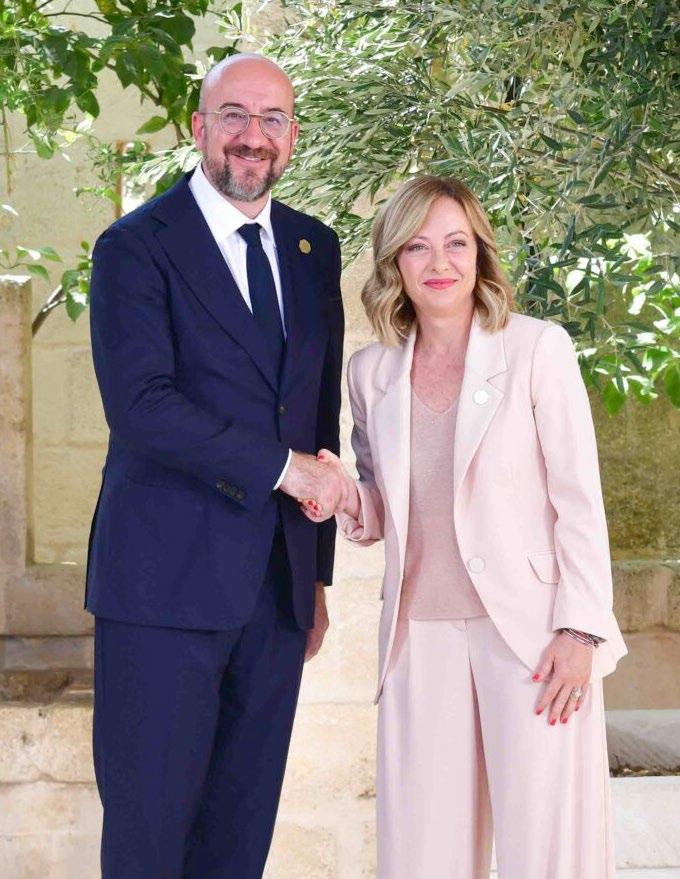
Charles Michel PRESIDENT OF THE EUROPEAN COUNCIL
I would like to thank Giorgia Meloni and the Italian presidency for their hospitality here in Italy. This meeting is extremely important because we will address four important challenges.
Firstly, we want to support Ukraine, and we want to make decisions to provide more immediate financial support for Ukraine so that they can defend themselves.
Secondly, we want to support international humanitarian law in the Middle East. We have three main goals. The first is an immediate ceasefire, and we are supporting all the efforts made by the mediators to make possible this ceasefire and the release of all hostages. Second, we have to facilitate humanitarian access. The situation is tragic, and it is our responsibility to deploy the maximum effort to provide more humanitarian assistance on the ground. And third, we believe in a two-state solution. Peace and security go hand in hand, and that’s why we need to relaunch a political track for making possible the two-state solution as soon as possible.
The third important challenge we will discuss here in Italy is migration. This is a common challenge, and this is the route that we intend to put in place together with our partners - a coalition to fight against the smugglers and the criminal groups which are abusing vulnerable people to make money and to destabilise countries and regions across the world. We need more cooperation with third countries, which we have started to do at the European Union level, and we continue to follow this approach.
And fourth, we will discuss Africa. Africa is an important continent for all of us. Demography in Africa is a challenge. Conflicts, wars on this continent, the need to invest in infrastructure, in telecoms, in digital, but also in the energy sector. This continent is facing extraordinarily difficult challenges in the fight against poverty. They also have to face the consequences of climate change, and they need more access to capital. We must be on their side. We have to build partnerships based on trust, respect, and mutual confidence. And we can no longer avoid opening a serious debate on multilateralism, and especially on multilateral development banks. There is a need for more fairness and inclusivity.
This G7 meeting, with the most advanced economies in the world, is make sure that the fundamental values we have in common are values that we promote throughout the world.
Africa is an important continent for all of us. Demography in Africa is a challenge. Conflicts, wars on this continent, the need to invest in infrastructure, in telecoms, in digital, but also in the energy sector.
Charles Michel


Luiz Inácio Lula da Silva PRESIDENT OF BRAZIL
I would like to thank Prime Minister Giorgia Meloni for the invitation to participate in this outreach engagement meeting.
In the last similar meeting I participated in Italy, during the L´Áquila Summit in 2009, we were facing a global financial crisis that exposed the mistakes of neoliberalism. Today Brazil presides over the G20 in a context of multiple and new challenges. Conducting an inclusive digital revolution and facing climate change are existential dilemmas of our time. We must deal with this double transition with a focus on human dignity, the health of the planet and a sense of responsibility towards future generations.
In the digital arena, we are experiencing an unprecedented concentration of resources in the hands of a small number of individuals and companies, based in an even smaller number of countries. Artificial intelligence (AI) exacerbates this scenario of opportunities, risks and asymmetries.
Its benefits must be shared by all. We are interested in a safe, transparent and empowering AI. One that respects human rights, protects personal data and promotes information integrity. One that strengthens the capacity of States to adopt public policies for the environment and contributes to the energy transition. An AI that can be recognized as having the face of the Global South, that strengthens cultural and linguistic diversity and develops our countries’ digital economies.
And, above all, an AI that can be used as an instrument for peace, not war. We need international and intergovernmental governance of artificial intelligence in which all States have a seat.
The African countries are indispensable partners in facing these and other challenges. With its population of 1.5 billion and its immense and wealthy territory, Africa has enormous potential for the future. The creative force of its youth cannot be wasted in crossing the Sahara to drown in the Mediterranean. Seeking a better life must not be a death sentence.
In addition to the African Union, which for the first time participates as a full member of the G20, we have also extended invitations to Angola, Egypt and Nigeria to participate in the meetings during our presidency. Many African countries are close to insolvency and spend more on foreign debt repayment than on education or health. This represents a permanent source of social and political instability. Without adding value to their natural resources, developing countries will remain trapped in the dependent relationships that have defined their history. The State must recover its role as a planner of development.
Promoting decent employment and social inclusion are some of the issues I discussed yesterday at the International Labor Conference in Geneva. That is the purpose of the Partnership for Workers’ Rights that we are moving forward with President Biden.
The proposal for fair and progressive international taxation that Brazil is championing at the G20 is part of this very drive to fight inequality. It is high time for the super-rich to pay their fair share of taxes. The excessive concentration of power and income poses a risk to democracy. Many developing countries have implemented efficient policies to eradicate hunger and poverty.
Our goal at the G20 is to mobilize resources to expand such policies and to adapt them for different realities.
The support of all attendees at this meeting for the Global Alliance Against Hunger and Poverty, which we will launch during the G20 Summit in Rio de Janeiro, will be crucial to finally heal this enduring wound of humankind.
Ladies and gentlemen, The governance institutions have been inoperative in addressing the current geopolitical reality so as such they perpetuate privileges. The year 2023 saw and increase in armament spending, compared with 2022, to reach 2.4 trillion dollars. In Gaza, we see the legitimate right to self-defense being transformed into a right to vengeance. We are facing the daily violation of humanitarian law, which has victimized thousands of innocent civilians, especially women and children. This has led us to endorse South Africa’s decision to bring this case to the International Court of Justice. Brazil has strongly condemned Russia’s invasion of Ukraine.
It is evident that neither party will achieve all of its objectives through military means. A viable path to peace can only be achieved through an international conference recognized by both sides, similarly to the proposal put forth by Brazil and China. The G7, the BRICS and the G20 bring together the planet’s largest economies.
The future we will share hinges on our capacity to overcome historical inequalities and injustices, enabling us to prevail over the current challenges faced by humankind. Thank you very much.
Our goal at the G20 is to mobilize resources to expand such policies and to adapt them for different realities. The support of all attendees at this meeting for the Global Alliance Against Hunger and Poverty, which we will launch during the G20 Summit in Rio de Janeiro, will be crucial to finally heal this enduring wound of humankind.
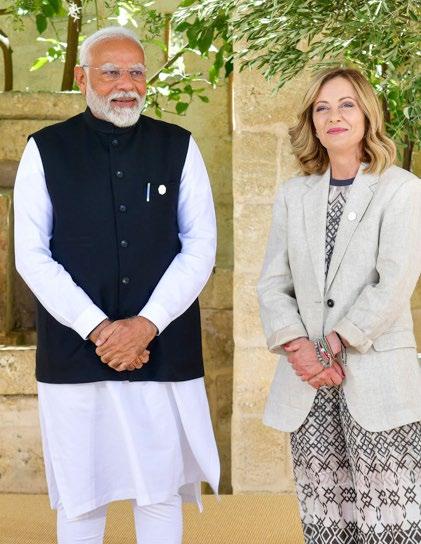
Narendra Modi PRIME MINISTER OF INDIA
First of all, I would like to express my heartfelt gratitude to Prime Minister Meloni for the invitation to this Summit, and for the warm hospitality extended to us. I wish Chancellor Olaf Scholz a very happy birthday. This event of G-7 summit is special as well as historic. Heartiest congratulations to all the colleagues of G-7 on the 50th anniversary of this group.
Friends,
Last week many of you were busy with the European Parliament elections. Some friends will go through the excitement of elections in the coming time. In India too, a few months back, it was the time of elections. The uniqueness and magnitude of the elections in India can be understood from some figures: More than 2600 political parties, more than 1 million polling booths, more than 5 million Electronic Voting Machines, 15 million polling staff, and about 970 million voters, out of which 640 million people exercised their franchise. The entire electoral process has been made fair and transparent by the ubiquitous use of technology. and the results of such a large election were also declared within a few hours! This was the biggest festival of democracy in the world and the biggest in the history of humanity. It is also a living example of our ancient values as the mother of democracy. And I am fortunate that the people of India have given me the opportunity to serve them for the third consecutive time. This has happened for the
first time in India in the last six decades. The blessings that the people of India have given in the form of this historic victory is a victory of democracy. It is a victory of the entire democratic world. And I am extremely happy to be present among all of you friends just a few days after assuming office.
The twenty-first century is the century of technology. There is hardly any aspect of human life that is deprived of the influence of technology. While on one hand technology gives the courage to take man to the moon, on the other hand it also creates challenges like cyber security. We have to collectively ensure that the benefits of technology reach all sections of society, to realize the potential of every person in the society, to help in removing social inequalities, and expand human powers instead of limiting them. This should not only be our desire, but our responsibility. We have to convert monopoly in technology into mass usage. We have to make technology creative, not destructive. Only then will we be able to lay the foundation of an inclusive society. India is striving for a better future through its human-centric approach. India is among the first few countries to formulate a National Strategy on Artificial Intelligence. On the basis of this strategy, this year we have launched A.I. Mission. It is derived from the mantra “A.I. for All” . As a founding member and lead chair of the Global Partnership for AI,
we are promoting cooperation among all countries. During the G-20 Summit hosted by India last year, we emphasized the importance of international governance in the field of A.I. In the time to come, we will continue to work together with all countries to make A.I. transparent, fair, secure, accessible and responsible.
Excellencies,
India’s approach in the field of energy is also based on four principles - availability, accessibility, affordability and acceptability. India is the first country to fulfil all the commitments made under COP before time. And we are making every effort to fulfil our commitment to achieve the target of Net Zero by 2070. We should together try to make the time to come a Green Era. For this, India has started Mission LiFE i.e. Lifestyle For Environment. Taking this Mission forward, on 5 June, Environment Day, I have started a campaign - “Ek Ped Maa Ke Naam”. Everyone loves their mother. With this feeling, we want to make tree plantation a mass movement with personal touch and global responsibility. I urge all of you to join it. My team will share its details with everyone.
Excellencies,
It is our resolve to build a developed India by 2047. Our commitment is that no section of the society should be left behind in the country’s development journey. This is also important in the context of
international cooperation. The countries of the Global South are bearing the brunt of global uncertainties and tensions. India has considered it its responsibility to place the priorities and concerns of the countries of the Global South on the world stage. We have given high priority to Africa in these efforts. We are proud that the G-20, under India’s chairmanship, made the African Union a permanent member. India has been contributing to the economic and social development, stability and security of all African countries, and will continue to do so.
Excellencies,
Today’s meeting reflects deep convergence between the priorities of all countries. We will continue dialogue and cooperation with the G7 on all these issues. Thank you very much.
It is our resolve to build a developed India by 2047. Our commitment is that no section of the society should be left behind in the country’s development journey. This is also important in the context of international cooperation.


Full text of the speech by Brazil’s President Luiz Inácio Lula da Silva at the opening of the 37th Ordinary Session of the Assembly of the Heads of State and Government of the African Union.
It is with great joy that I return to Africa for the twenty-first time, once again as President of Brazil, to address the leaders of the African Union. I come to reaffirm the partnership and bond between our country and our people and the sister continent.
The African struggle has a lot in ommon with the challenges faced by Brazil. More than half of the 200 million Brazilian citizens recognize themselves as Afro-descendants. We, Africans and Brazilians, must chart our own paths within the emerging world order.
We must create a new global governance that is capable of facing the challenges of our time.
Minimal State theories are no longer applicable. Planning agricultural and industrial development has once again become part of public policies in all sectors Energy and digital transitions require government leverage and guidance.
Attempts to restore a global system based on ideological blocs are not applicable in the real world. Multipolarity is an inexorable and welcome component in the 21st century. Consolidation of BRICS as the world’s most important arena for the articulation of emerging countries is an undeniable advance.
Without the participation of developing countries, it will not be possible to open any new cycle of global expansion – combining growth, environmental preservation and reduced inequality and with increased freedoms.
The Global South is becoming an unavoidable part of the solution to the main crises that afflict this planet.
These crises arise from a model that concentrates wealth, and which mainly affects the poorest – and, among these,
immigrants. The alternative to the ills of neoliberal globalization will not come from the racist and xenophobic far right. Development cannot be the privilege of a few.
Only an inclusive social project will allow us to establish prosperous, free, democratic, and sovereign societies. There will be no stability or democracy if hunger and unemployment remain.
The time is ripe to revive the best humanist traditions of the great leaders of African decolonization. Being a humanist today means condemning the attacks perpetrated by Hamas against Israeli civilians, and demanding the immediate release of all hostages. Being a humanist also demands rejecting Israel’s disproportionate response, which has killed almost 30,000 Palestinians in Gaza – the vast majority of them women and children – and caused the forced displacement of over 80% of the population.
The solution to this crisis will only last if we move quickly towards the creation of a Palestinian State that is also recognized as a full member of the United Nations –a strengthened UN that harbors a more representative Security Council, in which there are no countries with veto power, and which includes permanent members from Africa and Latin America. For two years now, the war in Ukraine has exposed the Council’s paralysis. Beyond the tragic loss |of life, its consequences are also being felt around the world in food and fertilizer prices.
There will be no military solution to this conflict. The time has come for politics and diplomacy.
Ladies and gentlemen, Africa – with its 1 billion 500 million inhabitants and its immense and rich territory—has enormous
possibilities for the future. Brazil wants to grow alongside Africa, but never dictating any paths.
The Brazilian people are recovering their political and economic sovereignty. We are adopting an ecological transformation project which will allow us to take a historic leap forward. We are reviving our democracy and making it increasingly participatory.
Through Bolsa Família and other successful public policies, we will once again leave the hunger map and lift millions of Brazilians out of poverty.
Talking about “Inclusive Education” –this Summit’s main topic – is talking about the future. Around the world, almost 250 million children do not attend school.
In Brazil we are implementing full-time schools, as well as granting a benefit to the poorest high school students as a way of reducing the number of school dropouts.
I am proud to say that thousands of African citizens have concluded their studies in Brazil – but we are going to do even more. We are going to increase the number of scholarships we offer so as to welcome African students to our public higher education institutions.
We are willing to develop educational programs in Africa, and to promote intense exchange of teachers and researchers. Let us collaborate so that Africa may become independent in its food and clean energy production.
Africa harbors 400 million hectares spread across over 25 countries which have the potential to make this continent one of the great breadbaskets of the world, enabling policies to combat hunger and produce biofuels.
I also want to extend our partnership to the health sector. There is much to learn
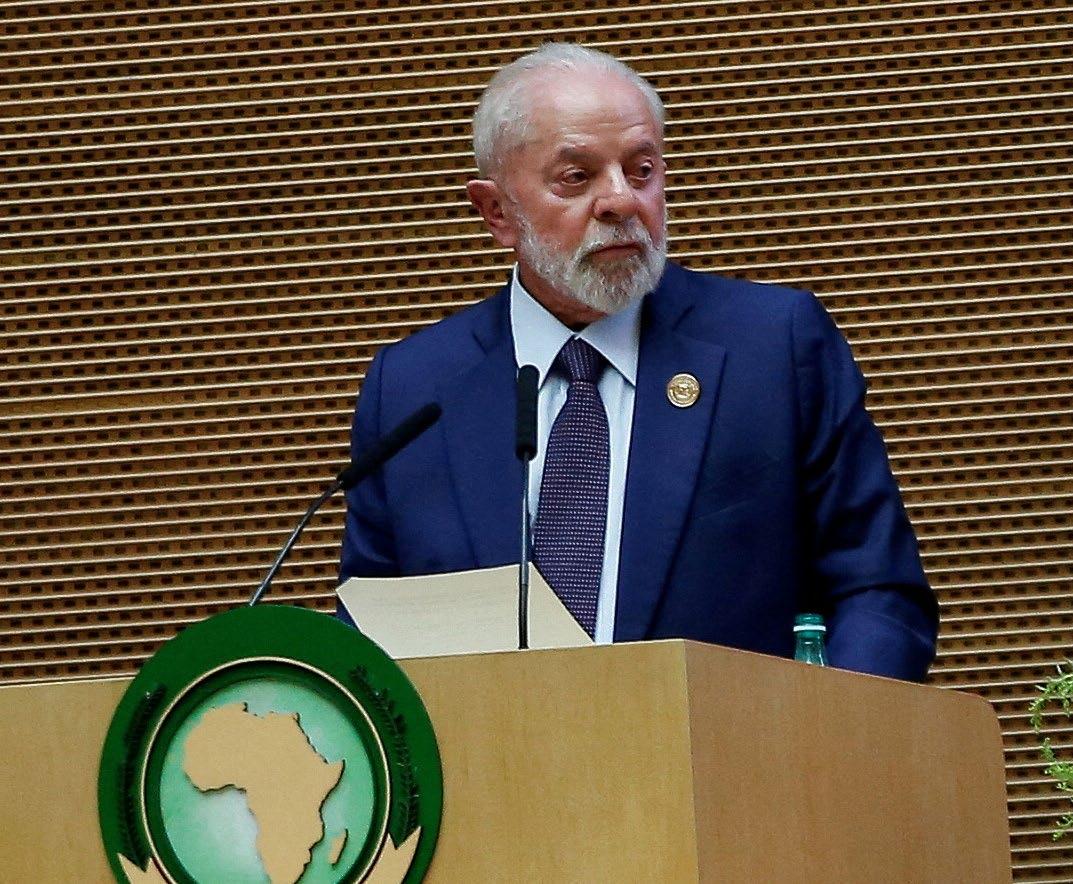
from both of our health strategies, and from the possibility of structuring robust and broad-reaching public systems.
We will work alongside the Africa Centres for Disease Control and Prevention to tackle neglected tropical diseases. We will aim to expand access to medicines, avoiding repetition of the vaccine “apartheid” that we saw in COVID-19.
Taking care of the health of the planet is also our priority. The imperative of protecting the world’s two largest tropical rainforests – in the Amazon and the Congo basins – makes us protagonists in the climate agenda.
Current international instruments are insufficient to effectively reward the protection of forests, their biodiversity and the people who live in them, take care of them, and depend on them.
By recovering degraded areas, we can create a true green belt to protect forests in the Global South. Alongside African partners, Brazil wants to develop and construct a family of satellites to monitor deforestation.
To carry all this out, we are going to create a cooperation outpost with the African Union in sectors such as agricultural research, health, education, environment, and science and technology.
Our diplomatic representation in Addis
Ababa will soon include employees from government bodies such as the Brazilian Cooperation Agency, EMBRAPA and FIOCRUZ – our research and development bodies in agriculture and health.
Ladies and gentlemen, Our paths will meet again at the G20 Summit, in Rio de Janeiro, and at COP 30, in Belém. The presence of the African Union as a full member of the G20 will be of great value – but including more countries from the continent as full members is still also necessary. We have common agendas to defend.
It is unacceptable that a world capable of generating wealth in the order of USD 100 trillion dollars per year still harbors the hunger of more than 735 million people. We are creating the Global Alliance against Hunger at the G20 so as to promote a set of public policies and mobilize resources to finance them.
Around 60 countries – many of them in Africa – are coming close to financial insolvency, allocating more resources to paying external debt than to education or health. This reflects the obsolete nature of financial institutions such as the IMF and the World Bank, which often worsen crises that they should be resolving.
Solutions to transform unfair and unpayable debts into concrete assets –
Artificial Intelligence cannot be monopolized by a few countries andcompanies— and may also become fertile ground for hate speech and misinformation, as well as cause unemployment and reinforce racial and gender biases which accentuate injustice and discrimination.

such as highways, railways, hydroelectric plants, wind and solar energy parks, green hydrogen production and energy transmission networks – must be sought after. We need to follow the evolution of new technologies step by step.
Artificial Intelligence cannot be monopolized by a few countries and companies – and may also become fertile ground for hate speech and misinformation, as well as cause unemployment and reinforce racial and gender biases which accentuate injustice and discrimination.
Brazil is going to promote G20 interaction with the High-Level Panel created by the UN Secretary-General to support discussions on the Global Digital Compact.
In this way, we hope to contribute to effective and multilateral governance in Artificial Intelligence that fully incorporates the interests of the Global South.
My friends, I want to close by saying that there is no Global South without Africa. Resuming Brazil’s rapprochement with Africa means recovering historical ties and contributing to the construction of a new, more just and supportive world order. Above all, it allows us to join forces in overcoming the challenges that lie ahead. ■
Thank you very much.
We, the representatives of Canada, the Republic of Congo, Côte d’Ivoire, Ethiopia, France, Germany, Italy, Japan, Kenya, Mozambique, Nigeria, South Africa, the United Kingdom, the United States of America, and the European Union, recognize that universal access to affordable clean energy is a key factor for sustainable, resilient and inclusive economic growth and social development, as proclaimed by the 2030 Agenda for Sustainable Development and the African Union’s Agenda 2063. It also contributes to meeting the climate goals of the Paris Agreement and to keeping a temperature limit of 1.5C within reach.
Africa’s significant but largely untapped clean energy potential needs massive investments. We will work to accelerate investments in clean energy sources to ensure an inclusive transition which supports energy security, recognizing that a substantial proportion of people in Africa still lack reliable access to electricity and clean cooking.
To meet these objectives and the global efforts decided upon at the 5th session of the Conference of the Parties serving as the Meeting of the Parties to the Paris Agreement (CMA5), we look forward to the launch of the G7’s ‘Energy for Growth in Africa’ initiative and to contributing to its success. The initiative will help develop
bankable clean energy projects, attract private capital through the catalytic use of public finance and technical assistance, encourage the flow of concessional finance, and overcome barriers to investments in clean energy across Africa. The initiative will engage with governments, the private sector, financial institutions, multilateral development banks, and community groups. It will partner with the United Nations Development Program and the International Energy Agency. It will also coordinate with existing programmes, to ensure complementarity and avoid duplications, and will operate in close coordination with the G7 Partnership for Global Infrastructure and Investment. ■
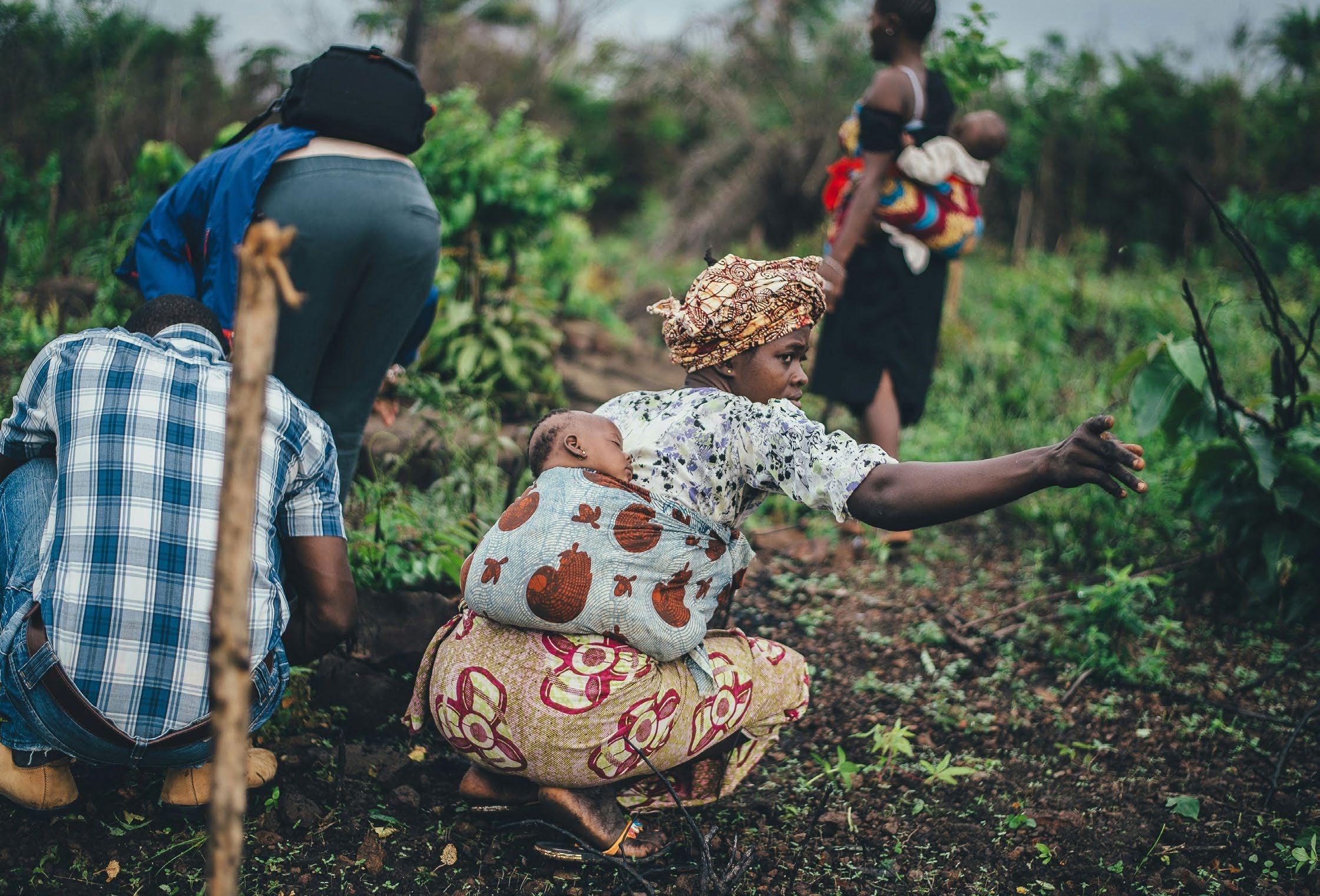







Understand the G20 and Brazil’s responsibilities
Venice, 9-10 May 2024
VENICE DECLARATION

1We, the Ministers of Justice of Canada, France, Germany, Italy, Japan, the United Kingdom, the Attorney General of the United States of America, and the Vice President of the European Commission have met in Venice on 9 and 10 May 2024 with the Minister of Justice of Ukraine, the Prosecutor General of Ukraine and the Executive Director of the United Nations Office on Drugs and Crime (UNODC).
Our Commitment to Ukraine
2. We, the G7 Justice Ministers and the Vice President of the European Commission, recall the G7 Leaders’ Statement issued on 24 February and we reaffirm our unwavering support for Ukraine and continue to condemn in the strongest terms Russia’s war of aggression against Ukraine which constitutes a blatant violation of the UN Charter and other international law. We reiterate our commitment to apply sanctions
and other restrictive measures against Russia through rigorous enforcement of our respective laws, including by holding accountable those who provide illicit financing and goods to Russia in violation of such measures. We also reaffirm that we will continue to explore all possible avenues to aid Ukraine in obtaining compensation from Russia, consistent with our respective legal systems and international law. We acknowledge the Foreign Ministers’
statement issued on 19 April which confirmed that they will continue to work and advise ahead of the Apulia Summit on all possible avenues and feasible options by which immobilized Russian sovereign assets could be made use of to support Ukraine, consistent with our respective legal systems and international law. We remain also committed to support the investigations and prosecutions aimed at ensuring accountability for international crimes committed in and against Ukraine due to Russia’s war of aggression, including by supporting the investigations and prosecutions by Ukraine, by supporting the International Criminal Court and other important existing accountability mechanisms focused on Ukraine and by conducting our own investigations and prosecutions, as appropriate. We also welcome ongoing discussions in the Core Group exploring the establishment of a tribunal for the prosecution of the crime of aggression against Ukraine.
3. As Justice Ministers it is our duty to promote and defend the rule of law and the institutions, domestic and international, which uphold it. The rule of law is fundamental to securing accountability for atrocities committed due to Russia’s aggression but also in supporting Ukraine rebuild its institutions in a way which allows it to flourish both economically and socially over the long-term. Noting the many current legal and practical challenges resulting from Russia’s ongoing war of aggression against Ukraine, including with respect to holding elections in this context, we underline the vital importance of Ukraine’s continued implementation of reforms that underscore its commitment to democracy, rule of law, respect for human rights and fundamental freedoms, including in the media sector.
4. During our latest meeting in Tokyo in July 2023, we made the decision to establish the Anti-Corruption Task Force for Ukraine (“ACT for Ukraine”). Today, we have acknowledged the progress made so far by the “ACT for Ukraine” under the coordination of Japan in assessing the anti-corruption needs of Ukraine and mapping the members’ ongoing and planned anti-corruption initiatives in the field of law and justice. We call on the “ACT for Ukraine” to continue its work to support Ukraine in the eradication of
We firmly believe that democratic countries must be able to rely on an empowered and independent anti-corruption workforce, free from undue influence, skilled in international judicial collaboration and capable of increasing public awareness about corruption’s severe and wide-ranging negative impact.
public awareness about corruption’s severe and wide-ranging negative impact. Deepening our cooperation on global justice challenges and Creation of the Venice Justice Group
corruption in its justice system and complete the planned initiatives as quickly and effectively as possible, to bolster transparency and accountability for securing good governance for post-war phase.
5. We welcome Ukraine’s progress in its reform efforts, in the rule of law and the fight against corruption, which contribute to advance its process of accession to the EU. Strengthening Ukraine’s democratic institution, preventing misuse of reconstruction funds and ensuring the just and transparent access and allocation of foreign resources will facilitate the country’s recovery and reconstruction.
6. Today, together with our Ukrainian colleague and the support of the UNODC, we adopted the “G7 Justice Ministers’ Pledge to Support Anti-Corruption efforts for the Reconstruction of Ukraine” (the Pledge, Annex to this Declaration). We consider that the further development of anti-corruption measures in the key areas identified in the Pledge will position Ukraine to strengthen those institutions and agencies that are fundamental to upholding the rule of law and ensuring the delivery of justice.
7. We firmly believe that democratic countries must be able to rely on an empowered and independent anticorruption workforce, free from undue influence, skilled in international judicial collaboration and capable of increasing
8. Today’s meeting marks the third gathering of G7 Justice Ministers, following Berlin (2022) and Tokyo (2023). Drawing from the strength of our collaboration, today we established the Venice Justice Group to support the progress and coordination of G7 Justice Ministers’ initiatives and to plan the substantive agenda for successive Ministerials. Consequently, the ACT for Ukraine will fall under the auspices of the Venice Justice Group, as will future initiatives of G7 Justice Ministers. The Venice Justice Group will provide a forum to deepen our cooperation and learn from each other to improve our respective justice systems, based on the protection of fundamental freedoms and human rights, and support collaborative efforts to promote and strengthen the rule of law and defence of democracy globally. The Venice Justice Group will be chaired by the Member State holding the G7 Presidency.
9. The Venice Justice Group will be flexible and dynamic, serving a coordinating function to address global challenges using our judicial and law enforcement expertise. Duplication with efforts of other established G7 bodies, especially with the Rome-Lyon Group, shall be avoided. We identified several of these global challenges as the following:
i. Promotion of the rule of law, human rights and the defence of democracy, including working with partner countries, regional groupings and organizations to uphold common values;
ii. Impact of deploying Artificial Intelligence within the Justice sector, recognising that the use of AI systems must not interfere with the decision-making power of judges or judicial independence;
iii. Digitalization of justice to reduce burdens for businesses and individuals and increase access to justice;
iv. The spread of illegal online content and all malign online disinformation;
v. Co-ordination in the field of justice in the fight against transnational organized crime as well as drug trafficking, human trafficking, and migrant smuggling, including environmental crimes. →
10. In addition to the creation of the Venice Justice Group we intend, in line with our respective systems, to consider as appropriate to support tackling these global challenges through the:
a. Enhancement of international cooperation, such as mutual legal assistance and transfer of sentenced persons to their country of origin for completion of their sentences, to tackle the most serious forms of crime;
b. Coordination of targeted technical assistance and capacity building programmes in the field of justice;
c. Exchange of best practices and expertise, and mutual learning among G7 partners as we look to address these challenges within our domestic systems and contexts, and as we consider whether and how international legal frameworks are responsive to present day challenges. Justice and legal dimension to countering transnational organized crime.
11. Recognizing the far-reaching harm inflicted by transnational organized crime, we remain fully committed in the fight against the most serious and ever-evolving threats posed to our societies by its illicit activities. To effectively fight transnational organized crime, it is vital to increase prosecutorial, judicial and law enforcement authorities’ capabilities to dismantle criminal networks, disrupt their business models and confiscate their profits.
Fight against drug trafficking and laundering of proceeds of crime
12. We have explored strategies to strengthen the efforts of our prosecutorial, judicial and law enforcement authorities in disrupting drug trafficking and laundering of proceeds of crime. We have noted that the ever-expanding international drug market continuously shifts towards new marketplaces and resorts to new payment methods; we also noted that the introduction of new psychoactive substances, including fentanyl, nitazines and other synthetic drugs, constitutes one of the most pressing challenges requiring closer international judicial cooperation. We recognize the importance of a modern, shared approach among the G7 Justice Ministers focusing on the most effective use of proven legal instruments and supported by the development of joint and collaborative actions to dismantle these criminal networks.

We remain ready to support UNODC in its ongoing efforts to counter human trafficking and migrant smuggling, including as part of a more effective action against irregular migration, through encouraging greater prosecutorial and judicial cooperation.
international criminal justice cooperation and coordination. Recalling our Leaders’ statement on Synthetic Drug Threats, we support the Global Coalition to Address Synthetic Drug Threats.
Fight against human trafficking and migrant smuggling
13. We have identified critical areas where the exchange of information on strategies for effective judicial response, where available, is paramount to address the global threat of production and distribution of illicit drugs. These areas include: (i) disrupting the international flow of precursor chemicals and pill pressing machinery, which are essential components for the synthesis of illicit drugs; (ii) enabling the swift tracking of illegal activities and the prosecution of offenders, including those who knowingly supply precursor chemicals to enable the production of illicit narcotics; (iii) increasing competent authorities’ awareness regarding the misuse of advanced technologies, including digitalized markets, for drug trafficking and the criminal use of cryptocurrency; (iv) strengthening prosecutorial and judicial responses against criminal networks, including money-laundering networks that facilitate criminal activities; and (v) implementing innovative judicial tools, including in the area of freezing and confiscation of assets (i.e. non-convictionbased asset confiscation) to dismantle the financial structures of criminal organizations. We welcome the role of bodies such as Eurojust in facilitating
14. Recognizing that the illicit activities of transnational organized crime have contributed to making human trafficking and migrant smuggling issues of global concern in recent years, including in the context of the fight against irregular migration, we underscore the need for a firm, comprehensive stance by the G7 Justice Ministries in coordination with our G7 Home Affairs colleagues. We, G7 Justice Ministers, acknowledge the changing nature and challenges posed by human trafficking and migrant smuggling, and the impact they are having on irregular migration, as well as the need to adapt to deliver effective and sustainable responses. Noting that transnational organized crime increasingly drives these criminal activities, we call upon all States Parties of the UN Convention against Transnational Organized Crime (UNTOC) to effectively implement their obligations under the Convention, including obligations for states who are party to the Protocols on human trafficking and migrant smuggling. We remain ready to support UNODC in its ongoing efforts to counter human trafficking and migrant smuggling, including as part of a more effective action against irregular migration, through encouraging greater prosecutorial and judicial cooperation. It is our goal to support competent authorities, including prosecutorial and judicial authorities, in the countries of origin, transit, or destination of irregular migration, human trafficking, and migrant smuggling by providing technical assistance and capacity building programs aimed at justice sector actors and experts, in addition to promoting the establishment of joint investigative bodies or conducting parallel investigations in accordance with existing multilateral international conventions. Finally, we further commit to ensuring that the UNTOC Implementation Review Mechanism achieves its goals set out in its procedures and rules, thus encouraging progress towards our common goal of dismantling criminal networks dedicated to human trafficking and migrant smuggling.

INCLUSIVE GROWTH FOR A SUSTAINABLE FUTURE
Sponsorship


We, the Leaders of the Group of Seven (G7), affirm our joint effort to fight the production, distribution, and sale of illicit synthetic drugs, and the criminal networks which traffic these drugs, which collectively impact the health, security, and well-being of our citizens and of people around the world. Such drugs, especially synthetic opioids such as fentanyl, its analogues and nitazenes, represent an escalating and critical public health emergency, resulting in hundreds of thousands of deaths and devastating impacts on our communities and economies.
In order to collectively address this shared challenge, we are ready to work together nd drive international action to disrupt the production and trafficking of illicit synthetic drugs, to dismantle the illicit financing networks that support the drug traffickers, to identify emerging drug trends, in order to prevent their expansion and to respond to public health impacts.
In particular, we commit to take enforcement actions to: i) dismantle drug trafficking networks and the supporting illicit financing networks using all available tools, including judicial and law enforcement actions, and hold drug traffickers and their facilitators accountable; ii) disrupt the illicit global supply chain of synthetic drugs as well as of the precursor chemicals that are used to manufacture illicit drugs, and iii) support international scheduling and regulation of dangerous drugs and precursor chemicals.
We will redouble our efforts to: i) raise awareness and knowledge, especially among the youth and persons in vulnerable or marginalized situations, of the adverse effects of drug use, particularly illicitly manufactured and distributed synthetic drugs; ii) share information to identify and quickly respond to new drug threats;
iii) promote evidence-based practices to improve the quality and availability of substance use prevention and treatment services; and iv) provide adequate training o support effective law enforcement, health-related, and preventive care.
We confirm our intention to further enhance international cooperation in counternarcotics. In this regard, we welcome the crucial work of the UN Office on Drugs and Crime (UNODC), the International Narcotics Control Board, the UN Commission on Narcotic Drugs (CND), the World Health Organization and the Global Coalition to Address Synthetic Drug Threats. We appreciate the longstanding work of Europol and Eurojust in facilitating international police and judicial cooperation to fight international drug trafficking. We welcome the European Ports Alliance initiative to fight drug trafficking and organized crime and the foundation of the new European Union Drugs Agency.
To show our steadfast commitment to fighting against this pernicious and expanding threat, we will instruct relevant ministers to work on strengthening international cooperation on this critical issue, raise public awareness, facilitate non-discriminatory and voluntary access to drug-related prevention and treatment services, and coordinate enforcement efforts. We encourage all countries concerned by the threat posed by illicitly manufactured and distributed synthetic drugs to join the Global Coalition to Address Synthetic Drug Threats and to undertake measures arising from its workstreams and recommendations. We also call on all countries to take appropriate action to counter this deadly scourge, including justice and law enforcement action against illicit precursor suppliers, transnational criminal organizations, and their enablers. ■
In order to collectively address this shared challenge, we are ready to work together and drive international action to disrupt the production and trafficking of illicit synthetic drugs, to dismantle the illicit financing networks that support the drug traffickers, to identify emerging drug trends, in order to prevent their expansion and to respond to public health impacts.
We the Leaders of the Group of Seven (G7) met today with Ukrainian President Volodymyr Zelenskyy to reaffirm our unwavering support for Ukraine and salute once more the bravery and resilience of the Ukrainian people who have been fighting tirelessly for Ukraine’s freedom and democratic future.
They have resisted for two years Russia’s illegal, unjustifiable, and unprovoked full-scale invasion which constitutes a blatant violation of the UN Charter. They have proven their will to defeat President Putin’s war machine, restore their nation’s territorial integrity, and defend Ukraine’s sovereignty and independence.
President Putin has failed to achieve his strategic objective of subjugating Ukraine. Instead, he is forcing his own people to pay
a heavy price for his government’s reckless actions each day. He has drained Russia’s resources to fund an unnecessary war, torn Russian families apart, and claimed hundreds of thousands of Russian lives.
We remain convinced that we can ensure the people of Ukraine prevail in fighting for their future and help to forge a comprehensive, just, and durable peace.
On this occasion, we also pay tribute to the extraordinary courage of Alexei Navalny and stand with his wife, children, and loved ones. He sacrificed his life fighting against the Kremlin’s corruption and for free and fair elections in Russia. We call on the Russian government to fully clarify the circumstances around his death. We equally call on the Russian government to free all unjustly detained prisoners and to stop the
persecution of political opposition and the systematic repression of Russians’ rights and freedoms. We will hold those culpable for Navalny’s death accountable, including by continuing to impose restrictive measures in response to human rights violations and abuses in Russia and taking other actions.
1. We will continue to support Ukraine’s right to self-defence and reiterate our commitment to Ukraine’s long-term security, including by concluding and implementing bilateral security commitments and arrangements, based on the Joint Declaration of Support for Ukraine we endorsed in Vilnius last July. We are stepping up our security assistance to Ukraine and are increasing our production and delivery capabilities, to assist the country. Ten years

after the Maidan protests, we stand with the Ukrainian government and people as they buttress the foundations of their democratic state through vital reforms, especially to reinforce their justice system and rule of law, and tackle corruption. These endeavours are part of Ukraine’s path to Euro-Atlantic integration. We praise Ukraine’s achievements to date and welcome the European Council’s decision last December to open accession negotiations with Ukraine. We welcome Ukraine’s progress towards meeting the IMF Extended Fund Facility programme’s conditionality. Russia must not succeed in wrecking Ukraine’s economy to make up for its failures on the battlefield. We will help Ukraine meet its urgent financing needs, and assist other vulnerable countries severely affected by the impacts of Russia’s war. We strongly welcome the EU’s approval of the Ukraine Facility of EUR 50 billion. It will provide crucial financial support to Ukraine until 2027. We also welcome additional economic support others have approved as we seek to close Ukraine’s remaining financing gap, as well as Japan’s swift

delivery of its budget support in the first quarter of 2024 and Canada’s new funding. We urge the approval of additional support to close Ukraine’s remaining budget gap for 2024.
Ukraine’s reconstruction, starting with early recovery measures, remains a key priority. We will continue to work, with the Ukrainian authorities and International Financial Institutions through the Multiagency Donor Coordination Platform for Ukraine and by leveraging private investments. We welcome the Platform’s expansion to include the Republic of Korea, Norway, Sweden, and the Netherlands. Further to the successful Japan-Ukraine Conference for Promotion of Economic Growth and Reconstruction, we look forward to the Ukraine Recovery Conferences, to be hosted in Berlin in 2024 and in Rome in 2025.
2. We call on Russia to immediately cease its war of aggression and completely and unconditionally withdraw its military forces from the internationally recognized territory of Ukraine. We call on all countries to uphold international law and in no way validate or condone Russia’s attempts to acquire territory by force. We will never recognise so-called “elections”, past and future, held by Russia in the territories of Ukraine, nor their results. Russia’s stated intention to hold votes for its Presidential elections in Ukrainian regions is an outrageous violation of Ukraine’s sovereignty. We strongly condemn Russia’s continuous brutal attacks on civilians and critical civil infrastructure and war crimes
committed by Russian forces in Ukraine, including sexual violence. We strongly condemn Russia’s human rights violations in the territories Russia occupies. We remain committed to holding those responsible accountable for their atrocities against the people of Ukraine, in line with international law. We support investigations by the Prosecutor of the International Criminal Court, the Prosecutor-General of Ukraine, and other national prosecutors within their jurisdictions. We welcome ongoing discussions in the Core Group, exploring the establishment of a tribunal for the crime of aggression against Ukraine. We call on Russia to release all persons it has unlawfully detained and to safely return all civilians it has illegally transferred or deported, starting with thousands of children. We welcome the International Coalition for the Return of Ukrainian Children, launched by Ukraine and Canada. We also stress the importance of advancing towards an exchange of all prisoners of war and welcome efforts in this regard by other partner countries and actors. Finally, we will continue to support Ukrainian displaced persons and refugees and protect those in need. We reiterate our support for the Council of Europe Register of Damage for Ukraine.
We strongly condemn Russia’s continuous brutal attacks on civilians and critical civil infrastructure and war crimes committed by Russian forces in Ukraine, including sexual violence. We strongly condemn Russia’s human rights violations in the territories Russia occupies.
As Russia’s war of aggression against Ukraine continues to undermine global food security, we celebrate Ukraine’s success in significantly expanding food exports through the Black Sea, which will help feed the world. Thanks to Ukraine’s maritime corridor and the EU’s solidarity lanes, Ukraine is on track to export all grain from its 2023 harvest despite Russia’s attacks on Ukrainian ports and its withdrawal from the Black Sea Grain Initiative. We will continue to help Ukraine export its grain and agricultural products to the most vulnerable nations, including through the implementation of the Grain Verification Scheme that Ukraine will lead this year. We call on Russia to cease its efforts to weaponize food supply and support safe commercial navigation of the Black Sea. Russia’s irresponsible nuclear rhetoric, its posture of strategic intimidation and its undermining of arms control regimes are unacceptable. Threats by Russia of nuclear weapon use, let alone any use of nuclear weapons by Russia, in the context of its war of aggression against Ukraine are inadmissible. →

→ 3. We will continue to raise the cost of Russia’s war, degrade Russia’s sources of revenue and impede its efforts to build its war machine, as demonstrated by our recently approved sanctions packages. We remain committed to fully implementing and enforcing our sanctions on Russia and adopting new measures as necessary. We continue to counter, in close cooperation with third countries, any attempts to evade and circumvent our sanctions and export control measures. We will impose additional sanctions on companies and individuals in third countries who help Russia acquire weapons or key inputs for weapons. We will also impose sanctions on those who help Russia acquire tools and other equipment that aid Russian weapons production or military-industrial development.
We will continue to apply significant pressure on Russian revenues from energy and other commodities. We will continue to take steps to tighten compliance and enforcement of the oil price cap. While working to maintain supply stability, we will respond to price cap violations, including by imposing additional sanctions measures on those engaged in deceptive practices while transporting Russian oil and against the networks Russia has developed to extract additional revenue from price cap violations. We will continue taking steps to limit Russia’s future energy revenues. We will continue to impede Russia’s development of future energy projects and disrupt its development of alternatives for energy shipping and other services. We will continue efforts to reduce Russia’s revenues from metals.
We will continue to apply significant pressure on Russian revenues from energy and other commodities. We will continue to take steps to tighten compliance and enforcement of the oil price cap.
We will continue to take action against third-country actors who materially support Russia’s war including by imposing additional measures on entities, where appropriate, in third countries. We call on financial institutions to refrain from supporting Russia’s war machine and we will take appropriate steps, consistent with our legal systems, to deter this behaviour. Financial institutions and other entities that facilitate Russia’s acquisition of items or equipment for its defence industrial base are supporting actions that undermine the territorial integrity, sovereignty, and independence of Ukraine. We strongly condemn North Korea’s exports and Russia’s procurement of North Korea’s ballistic missiles in direct violation of relevant UNSCRs and call upon them to immediately cease such activities. We call upon Iran to stop assisting the Russian military and its war in Ukraine. We express our concern about transfers to Russia from
businesses in the People’s Republic of China of dual-use materials and components for weapons and equipment for military production. It is not right for Russia to decide if or when it will pay for the damage it has caused in Ukraine. These damages now exceed USD486 billion, according to the World Bank. Russia’s obligations under international law to pay for the damage it is causing are clear. We are determined to dispel any false notion that time is on Russia’s side, that destroying infrastructure and livelihoods has no consequences for Russia, or that Russia could prevail by causing Ukraine to fail economically. Russia should not be able to indefinitely delay payment it owes. We recognize the urgency of disrupting Russia’s attempts to destroy the Ukrainian economy and Russia’s continued failure to abide by its international law obligations. We are determined to ensure full accountability and we support Ukraine in obtaining compensation for the loss, injury and damage resulting from Russia’s aggression. We reaffirm that, consistent with our respective legal systems, Russia’s sovereign assets in our jurisdictions will remain immobilized until Russia pays for the damage it caused to Ukraine. We welcome the adoption of the EU legal acts concerning extraordinary revenues of central securities depositories gained from Russia’s immobilised sovereign assets and encourage further steps to enable their use, consistent with applicable contractual obligations and in accordance with applicable laws. We ask our ministers to continue their work and update ahead of the Apulia Summit on all possible avenues by which immobilized Russian sovereign assets could be made use of to support Ukraine, consistent with our respective legal systems and international law.
4. As we move forward, we continue our support to Ukraine in further developing President Zelenskyy’s Peace Formula and commit ourselves to supporting a comprehensive, just, and lasting peace consistent with the principles of the UN Charter, international law and respectful of Ukraine’s sovereignty and territorial integrity. As Ukraine enters the third year of this relentless war, its government and its people can count on the G7’s support for as long as it takes. ■

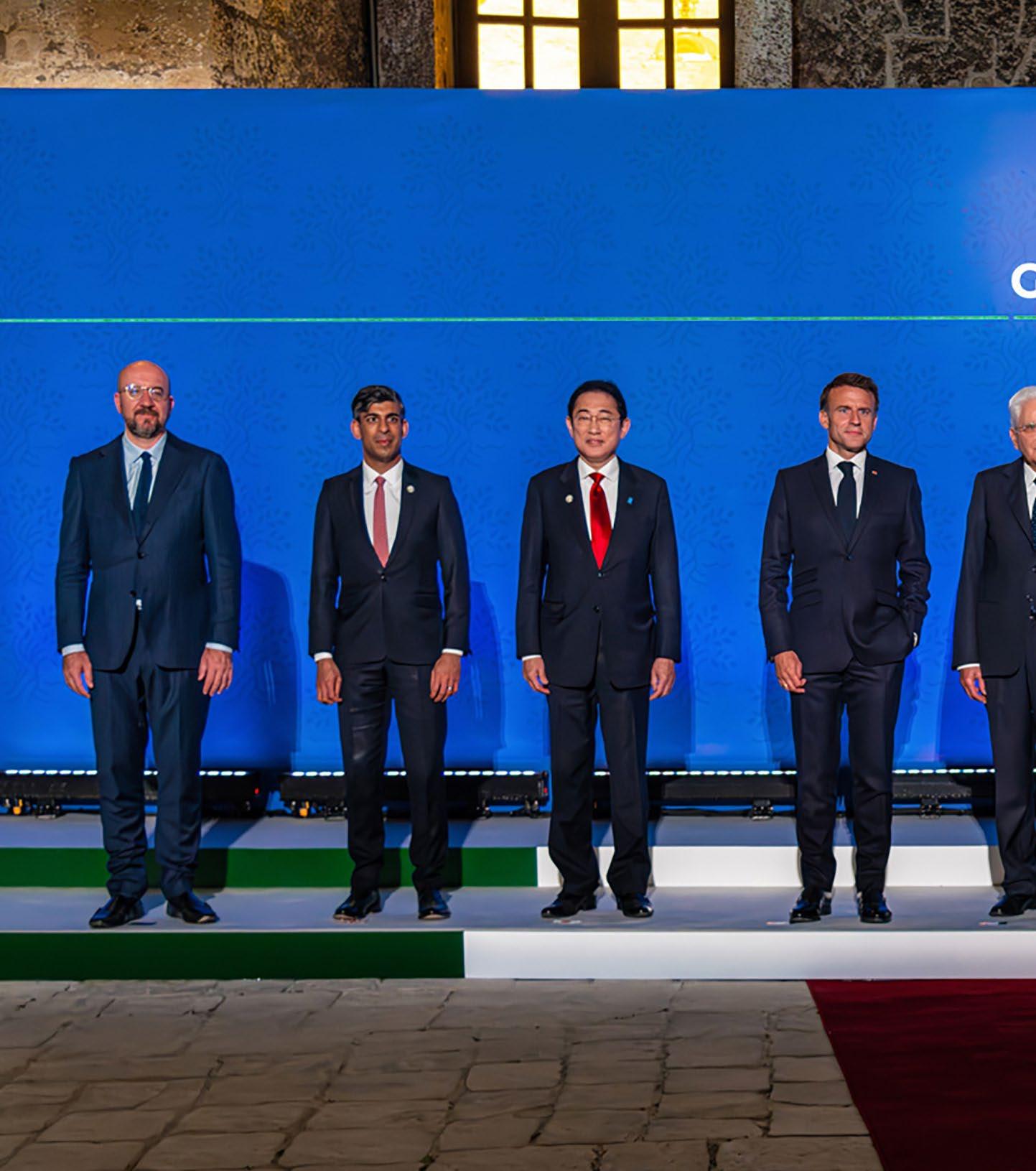
We, the Leaders of the Group of Seven (G7), gathered in Apulia to reaffirm our enduring unity and determination to meet global challenges at a crucial moment in history and as the international community confronts multiple interconnected crises. We reiterate our shared belief in democratic principles and free societies, universal human rights, social progress, and

respect for multilateralism and the rule of law. We commit to providing opportunities and pursuing shared prosperity. We seek to strengthen international rules and norms for the benefit of all. Our work is grounded in our commitment to respect the UN Charter, safeguard international peace and security, and uphold the free and open rules-based international order. We will support more effective, inclusive and equitable global →
→ governance that reflects our changing world. We reaffirm our commitment to uphold human dignity and the rule of law in all parts of the world. We are working together and with others to address the pressing challenges of our time. We are:
• Standing in solidarity to support Ukraine’s fight for freedom and its reconstruction or as long as it takes. In the presence of President Zelenskyy, we decided to make available approximately USD 50 billion leveraging the extraordinary revenues of the immobilized Russian sovereign assets, sending an unmistakable signal to President Putin. We are stepping up our collective efforts to disarm and defund Russia’s military industrial complex.
• United in supporting the comprehensive deal that has been put forward, that would lead to an immediate ceasefire in Gaza, the release of all hostages, and a credible pathway towards peace that leads to a two-state solution. We also call for a significant and sustained increase in humanitarian assistance.
• Engaging with African countries, in a spirit of equitable and strategic partnership. As they work to deliver sustainable development and industrial growth for their people, we are advancing our respective efforts to invest in sustainable infrastructure, including through the PGII, and we launched the Energy for Growth in Africa initiative, together with several African partners.
• Acting to enable countries to invest in their future and achieve the Sustainable Development Goals (SDGs), recognizing that reducing poverty and tackling global challenges go hand in hand. We are doing our part to achieve better, bigger and more effective Multilateral Development Banks, making it possible for the World Bank to boost its lending by USD 70 billion over the next ten years. We are calling for action from the international community to address debt burdens.
• Reinforcing global food security and enhancing climate resilience, including by launching the Apulia Food Systems Initiative.
• Reaffirming our commitment to gender equality. Together with International Financial Institutions, we will unlock at least USD 20 billion over three years in investments to boost women’s empowerment.

• Taking concrete steps to address the triple crisis of climate change, pollution, and biodiversity loss, including by submitting ambitious 1.5°C aligned Nationally Determined Contributions. We will spearhead global efforts to preserve forests and oceans, and to end plastic pollution.
• Affirming our collective commitment and enhanced cooperation to address migration, tackle the challenges and seize the opportunities that it presents, in partnership with countries of origin and transit. We will focus on the root causes of irregular migration, efforts to enhance border management and curb transnational organized crime, and s afe and regular pathways for migration. We launched the G7 Coalition to prevent |and counter the smuggling of migrants.
• Deepening our cooperation to harness the benefits and manage the risks of Artificial Intelligence (AI). We will launch an action plan on the use of AI in the world of work and develop a brand to support the implementation of the International Code of Conduct for Organizations Developing Advanced AI Systems.
• Fostering strong and inclusive global economic growth, maintaining financial
stability and investing in our economies to promote jobs and accelerate digital and clean energy transitions. We also remain committed to strengthening the rulesbased multilateral trading system and to implementing a more stable and fairer international tax system fit for the 21st century.
• Acting together to promote economic resilience, confront non-market policies and practices that undermine the level playing field and our economic security, and strengthen our coordination to address global overcapacity challenges.
In taking forward all these priorities, our partnership in the G7 will continue to be guided by our joint commitment to cooperate openly and transparently in a coordinated manner.
We are grateful for the presence of His Holiness Pope Francis and for his contribution.
In a spirit of shared responsibility, we warmly welcome the participation f the Leaders of Algeria, Argentina, Brazil, India, Jordan, Kenya, Mauritania, Tunisia, Türkiye, and the United Arab Emirates.

We reaffirm our unwavering support for Ukraine for as long as it takes. Together with international partners, we are determined to continue to provide military, budget, humanitarian, and reconstruction support to Ukraine and its people.
We reaffirm our unwavering support for Ukraine for as long as it takes. Together with international partners, we are determined to continue to provide military, budget, humanitarian, and reconstruction support to Ukraine and its people. We remain strongly committed to helping Ukraine meet its urgent short-term financing needs, as well as supporting its long-term recovery and reconstruction priorities.
Russia must end its illegal war of aggression and pay for the damage it has caused to Ukraine. These damages now exceed USD 486 billion, according to the World Bank. It is not right for Russia to decide if or when it will pay for the damage it has caused in Ukraine. Russia’s obligations under international law to pay for the damage it is causing are clear, and so we are continuing to consider all possible lawful avenues by which Russia is made to meet those obligations.
We remain determined to dispel any false notion that time is on Russia’s side, that destroying infrastructure and livelihoods has no consequences for Russia, or that Russia can prevail by causing Ukraine to fail economically. With a view to supporting Ukraine’s current and future needs in the face of a prolonged defense against Russia, the G7 will launch Extraordinary Revenue Acceleration (ERA) Loans for Ukraine, in order to make available approximately USD 50 billion in additional funding to Ukraine by the end of the year.
Therefore, without prejudice to possible other contributions and standing together, the G7 intends to provide financing that will be serviced and repaid by future flows of extraordinary revenues stemming from the immobilization of Russian sovereign assets held in the European Union and other relevant jurisdictions. To enable this, we will work to obtain approval in these jurisdictions to use future flows of these extraordinary revenues to service and repay the loans. We confirm that, consistent with all applicable laws and our respective legal systems, Russia’s sovereign assets in our jurisdictions will remain immobilized until Russia ends its aggression and pays for the damage it has caused to Ukraine. We will maintain solidarity in our commitment to providing this support to Ukraine.
We intend to disburse this financing through multiple channels that direct the funds to Ukraine’s military, budget, and reconstruction needs – within the constraints of our respective legal systems and administrative requirements. As it relates to reconstruction, we will also strengthen the Multi-agency Donor Coordination Platform for Ukraine to help coordinate the disbursal of funds and ensure they align with Ukraine’s highest priority needs at a pace it can effectively absorb. This will play a key role in advancing Ukraine’s reforms in line
with its European path.
In light of the above, we task our relevant Ministers and officials to operationalize these commitments in time for ERA to begin disbursing before year-end.
As we reiterated in our Statement on Ukraine in February, Ukraine is defending its freedom, sovereignty, independence, and territorial integrity, against Russia’s brutal and unjustifiable war of aggression. We continue to condemn in the strongest possible terms Russia’s blatant breach of international law, including the UN Charter, and of basic principles that underpin the international order. Any use of nuclear weapons by Russia in the context of its war of aggression against Ukraine would be inadmissible. We therefore condemn in the strongest possible terms Russia’s irresponsible and threatening nuclear rhetoric, as well as its posture of strategic intimidation, including its announced deployment of nuclear weapons in Belarus. We remain committed to holding those responsible accountable for their atrocities against the people of Ukraine, in line with international law. We also condemn the seizures of foreign companies and call on Russia to reverse these measures and seek acceptable solutions with the companies targeted by them.
We support Ukraine’s right of selfdefense and reiterate our commitment to Ukraine’s long-term security, including by implementing bilateral security commitments and arrangements based on the Joint Declaration endorsed in Vilnius last July. We are increasing our production and delivery capabilities to assist its self-defense. We also support efforts to assist Ukraine modernizing its armed forces and strengthening its own defense industry.
We express our resolve to bolster Ukraine’s air defense capabilities to save lives and protect critical infrastructure. We are committed to raising the costs of Russia’s war by building on the comprehensive package of sanctions and economic measures already in place. Though our measures have had a significant impact on Russia’s ability to build its war machine and to fund its invasion, its military is still posing a threat not just to Ukraine but also to international security.
We will continue taking measures against actors in China and third countries that materially support Russia’s war machine, →
→ including financial institutions, consistent with our legal systems, and other entities in China that facilitate Russia’s acquisition of items for its defense industrial base.
In this context, we reiterate that entities, including financial institutions, that facilitate Russia’s acquisition of items or equipment for its defense industrial base are supporting actions that undermine the territorial integrity, sovereignty, and independence of Ukraine. Accordingly, we will impose restrictive measures consistent with our legal systems to prevent abuse and restrict access to our financial systems for targeted individuals and entities in third countries, including Chinese entities, that engage in this activity. We will take robust action against actors who aid Russia in circumventing our sanctions, including by imposing severe costs on all those who fail to immediately cease providing material support to Russia’s aggression and by strengthening domestic enforcement and stepping up our business engagement to promote corporate responsibility. We call on financial institutions to refrain from supporting and profiting from Russia’s war machine. We will take further steps to deter and disrupt this behavior. We will continue to apply significant pressure on Russian
revenues from energy and other commodities. This will include improving the efficacy of the oil price cap policy by taking further steps to tighten compliance and enforcement, while working to maintain market stability. We will take steps, including sanctions and innovative enforcement activities leveraging respective geographies, to combat Russia’s use of deceptive alternative shipping practices to circumvent our sanctions by way of its shadow fleet. We call on industry actors facilitating this activity to consider the financial liability and environmental and reputational damage risks associated with these practices. We will impose additional sanctions measures on those engaged in deceptive practices while transporting Russian oil and against the networks Russia has developed to extract additional revenue from price cap violations or from oil sales using alternative service providers. We will continue taking further steps to limit Russia’s future energy revenues by impeding the development of future energy projects and disrupting access to the goods and services on which those projects rely. We will continue our efforts to reduce Russia’s revenues from metals. Ukraine’s reconstruction remains a key priority, including early recovery measures and

addressing the current energy emergency caused by Russia’s increased targeting of Ukraine’s energy infrastructure. We re-emphasize our strong support for Ukraine’s energy security, including by coordinating international assistance through the G7+Ukraine Energy Coordination Group. We will continue to work with the Ukrainian authorities and International Financial Institutions through the Multi-agency Donor Coordination Platform for Ukraine, and by mobilizing private investments and fostering participation of civil society. We highlight the reality of 3.4 million internally displaced Ukrainians, the importance of inclusive recovery and the need to address the needs of women, children and persons with disabilities, as well as other population groups who have been disproportionately affected by Russia’s war of aggression. The reintegration of combatants and civilians with disabilities in society remains a priority. We call on Russia to release all persons it has unlawfully detained and to safely return all civilians it has illegally transferred or deported, starting with children. We reiterate our support for Ukraine’s agriculture sector, which is critical for global food supply, particularly for the most vulnerable nations. We therefore call for unimpeded deliveries of grain, foodstuffs, fertilizers and inputs from Ukraine across the Black Sea and recall the importance of the EU Solidarity Lanes and President Zelenskyy’s Grain from Ukraine initiative. We are also working to involve our private sectors in the sustainable economic recovery of Ukraine. We welcome and underscore the significance of Ukraine itself continuing to implement domestic reform efforts, especially in the fields of anti-corruption, justice system reform, decentralization, and promotion of the rule of law. We will continue to support efforts of the Ukrainian government and people in these endeavors. We will build on the Japan-Ukraine Conference for Promotion of Economic Growth and Reconstruction held in Tokyo on 19 February and the Ukraine Recovery Conference held on 11-12 June in Berlin and we look forward to the next Ukraine Recovery Conference in Rome in 2025. We welcome the Summit on Peace in Ukraine planned in Switzerland on 15-16 June to build a framework for peace based on international law, the UN Charter and
its principles, with respect for Ukraine’s sovereignty and territorial integrity. We will continue to work to achieve the widest possible international support for the key principles and objectives of President Zelenskyy’s Peace Formula. Our ultimate goal remains a just, lasting and comprehensive peace in line with international law and the UN Charter and its principles and respect for Ukraine’s sovereignty and territorial integrity. We will continue to stand by Ukraine for as long as it takes.
We reiterate our strongest condemnation of the brutal terrorist attacks conducted by Hamas and other terrorist groups against Israel on 7 October 2023. We express our full solidarity and support to Israel and its people and reaffirm our unwavering commitment towards its security. In exercising its right to defend itself, Israel must fully comply with its obligations under international law in all circumstances, including international humanitarian law. We condemn Hamas for its continuing use of civilian infrastructure for its military activities and failure to separate and distinguish itself from civilians in Gaza. We deplore all losses of civilian lives equally, and note with great concern the unacceptable number of civilian casualties especially women and children. We call on all parties to take every feasible step to protect civilian lives.
We fully endorse and will stand behind the comprehensive deal outlined by President Biden that would lead to an immediate ceasefire in Gaza, the release of all hostages, a significant and sustained increase in the flow of humanitarian assistance throughout Gaza, and an enduring end to the crisis, with Israel’s security interests and safety for Palestinian civilians in Gaza assured. In this regard, we welcome UNSC Resolution S/RES/2735 (2024).
We reiterate our call on Hamas to fully and unequivocally accept and implement the ceasefire proposal, as outlined in Resolution 2735, and urge countries with influence over Hamas to help ensure that it does so. We welcome Israel’s acceptance of the proposal and readiness to move forward with it.
We urge all parties to facilitate rapid and unimpeded passage of humanitarian
relief for civilians in need, in particular women and children. Securing full, rapid, safe, and unhindered humanitarian access in all its forms, consistent with international humanitarian law, and through all relevant land crossing points, including the Rafah crossing, through maritime delivery routes, including through Ashdod Port, and throughout all of Gaza remains an absolute priority. We agree it is critical that UNRWA and other UN organizations and agencies’ distribution networks be fully able to deliver aid to those who need it most, fulfilling their mandate effectively.
We are deeply concerned by the consequences on the civilian population of the ongoing ground operations in Rafah, and the possibility of a full-scale military offensive that would have further dire consequences for civilians. We call on the Government of Israel to refrain from such an offensive.
We welcome the appointment of the new Palestinian Authority’s cabinet and remain ready to support the Palestinian Authority as it undertakes the reforms that are indispensable to enable it to discharge its responsibilities in the West Bank and, in the aftermath of the conflict, in Gaza. Actions that weaken the Palestinian Authority must
stop, including the withholding of clearance revenues by the Israeli Government. Maintaining economic stability in the West Bank is critical for regional security. We call on Israel to take the necessary measures to ensure that correspondent banking services between Israeli and Palestinian banks remain in place, so that vital financial transactions and critical trade in services continue; to release withheld clearance revenues to the Palestinian authority, in view of its urgent fiscal needs; and to remove or relax other measures to avoid further exacerbating the economic situation in the West Bank.
We reiterate our unwavering commitment to the vision of the two-state solution where two democratic States, Israel and Palestine, live side by side in peace within secure and recognized borders, consistent with international law and relevant UN resolutions, and in this regard stress the importance of unifying the Gaza strip with the West Bank under the Palestinian Authority. We note that mutual recognition, to include the recognition of a Palestinian state, at the appropriate time, would be a crucial component of that political process. We affirm our commitment to working together – and with other international →
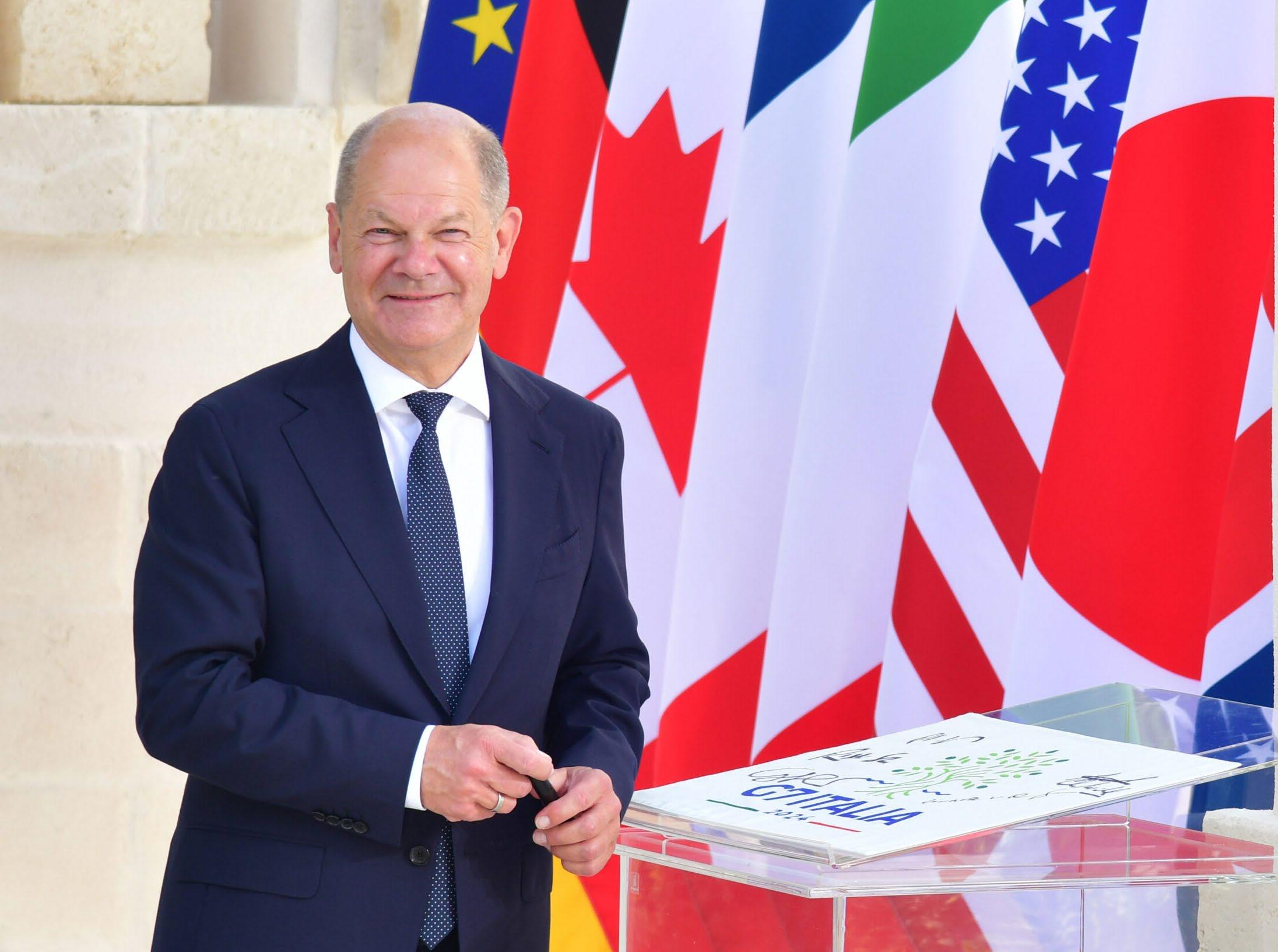
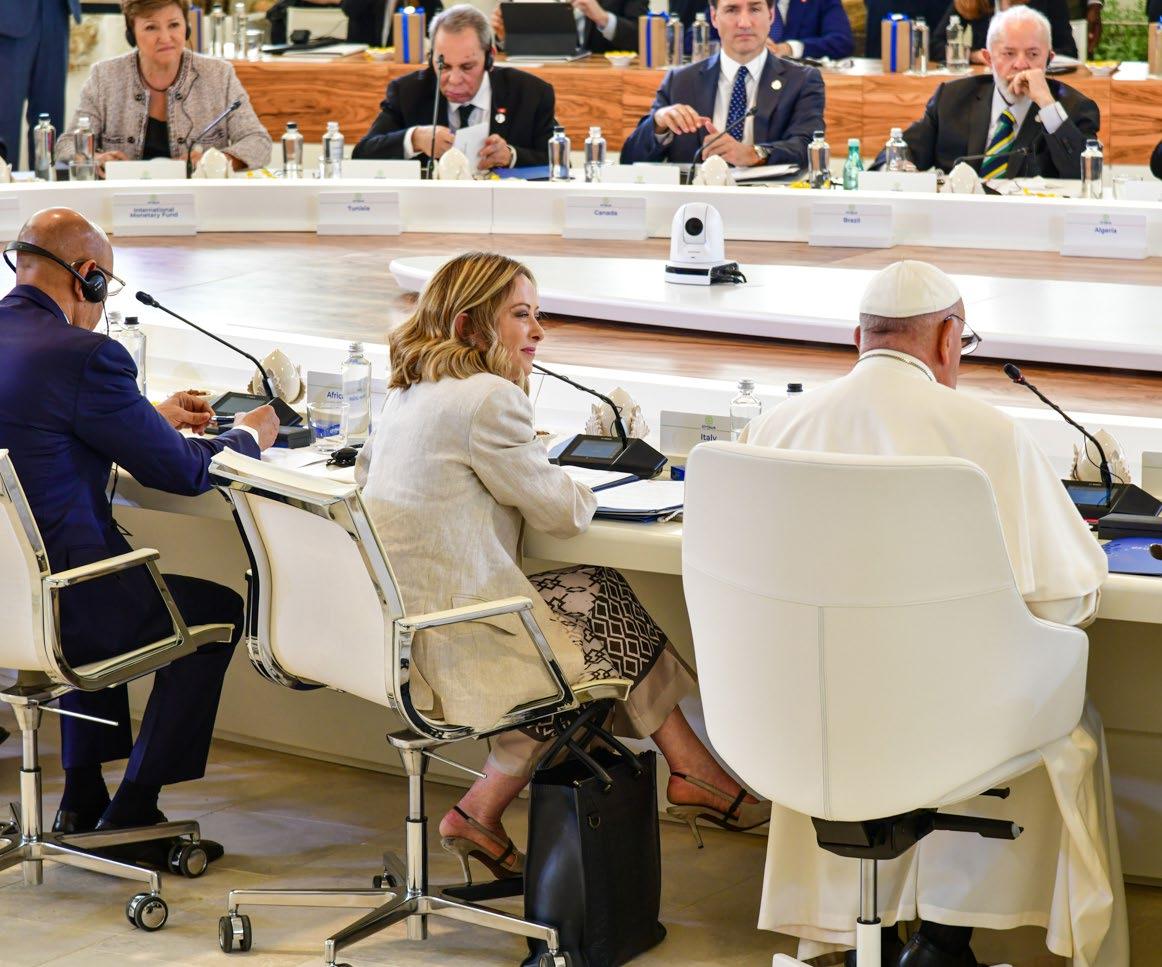
→ partners – to closely coordinate and institutionalize our support for civil society peacebuilding efforts, ensuring that they are part of a larger strategy to build the foundation necessary for a negotiated and lasting Israeli-Palestinian peace.
All parties must refrain from any unilateral actions that undermine the prospect of a two-state solution, including Israeli expansion of settlements and the “legalization” of settlement outposts. We condemn the rise in extremist settler violence committed against Palestinians, which undermines security and stability in the West Bank, and threatens prospects for a lasting peace. We encourage support for the Palestinian Authority Security Services to make sure the West Bank remains stable and conducive to the ultimate establishment of a Palestinian state.
We are deeply engaged – along with partners in the region – in preventing the conflict from escalating further. We reiterate our firm condemnation of Iran’s attack against Israel of 13-14 April, which marked an unacceptable escalation, and we reaffirm our commitment towards Israel’s security.
We call on all parties to lower tensions and contribute in a constructive way to de-escalation.
We are particularly concerned by the situation along the Blue Line. We recognize the essential stabilizing role played by the Lebanese Armed Forces (LAF) and the UN Interim Force in Lebanon (UNIFIL) in mitigating that risk. We urge all involved actors to exercise restraint to avoid further escalation, consistent with UNSCR 1701.
We condemn the ongoing attacks perpetrated by the Houthis against international and commercial vessels transiting through the Red Sea and Gulf f Aden. These illegal attacks must end. We call for the immediate release by the Houthis of the Galaxy Leader and its crew. We reiterate the right of countries to defend their vessels, in line with UNSCR 2722 and in accordance with international law.
The EU maritime operation Aspides and the U.S.-led operation Prosperity Guardian play an essential role to protect crucial
shipping lanes that are fundamental for global trade. Maritime security and navigational rights and freedoms are critical to ensuring free movement of essential commodities to destinations and populations all over the world. This includes delivery of life-saving humanitarian assistance to more than half the population of Yemen.
The continuing Houthi attacks in the Red Sea risk destabilizing the region, stopping freedom of navigation and trade flows and endangering the UN-led roadmap towards peace in Yemen. We call on the Houthis to comply with their obligations under international humanitarian law and cease their attacks in the Red Sea, Gulf of Aden and surrounding waters. We further call on Yemeni parties to continue their positive efforts in furtherance of the understanding reached in December 2023, under UN auspices, regarding the peace process.
Iran must cease its destabilizing actions. We reiterate our determination that it must never develop or acquire a nuclear weapon. We urge Tehran to cease and reverse nuclear escalations, and stop the continuing uranium enrichment activities that have no credible civilian justifications. Iran must engage in serious dialogue and provide convincing assurances that its nuclear program is exclusively peaceful, in full cooperation and compliance with the IAEA’s monitoring and verification mechanism, including the Board of Governors’ resolution of 5 June. We support IAEA’s monitoring and verification role regarding Iran’s nuclear-related obligations and commitments and express strong concern about Iran’s current lack of cooperation with the Agency.
We call on Iran to stop assisting Russia’s war in Ukraine and not to transfer ballistic missiles and related technology, as this would represent a substantive material escalation and a direct threat to European security. We are prepared to respond in a swift and coordinated manner, including with new and significant measures.
We demand that Iran cease its malicious activities and destabilizing actions in the Middle East and we stand ready to adopt further sanctions or take other measures in response to further destabilizing initiatives.
We continue to call for the immediate release of MSC Aries, its remaining crew and cargo.
We reiterate our deep concern over Iran’s human rights violations, especially against women, girls and minority groups. We call on Iran’s leadership to end all unjust and arbitrary detentions, including of dual and foreign citizens, and condemn the unacceptable harassment of its citizens.
We are committed to stepping up our support to African countries in their efforts to achieve sustainable development and local value creation, strengthen democratic governance, contribute to global stability and prosperity, and protect the rule-based international order. In doing so, we remain focused on equitable partnerships rooted in shared principles, democratic values, local ownership, and concrete initiatives. We will align our efforts with the African Union Agenda 2063 and African countries’ needs and priorities, including the integrated African continental plans for improved local and regional food security, infrastructure, trade and agricultural productivity. We will also support the operationalization of the African Continental Free Trade Area which will be an essential parameter of African growth in the coming decade.
We will reinforce mutually beneficial and equitable cooperation with African countries and regional organizations. While assuring African countries our continued financial support, we will enhance the coordination and effectiveness of G7 cooperation resources; support better mobilization and management of local domestic resources; and promote increased private investment. We endorse African countries’ call for greater voice in international bodies and welcome the AU’s participation in the G20 as a permanent member, and the creation of a third Chair for sub-Saharan Africa at the IMF Executive Board in November. We reiterate our support for the G20 Compact with Africa, as a tool to increase private sector investments, promote structural reforms, and local entrepreneurship support, and enhance cooperation, including in the energy sector. The G7 Partnership for Global Infrastructure and Investment (PGII), including initiatives such as the EU Global Gateway, offer a framework
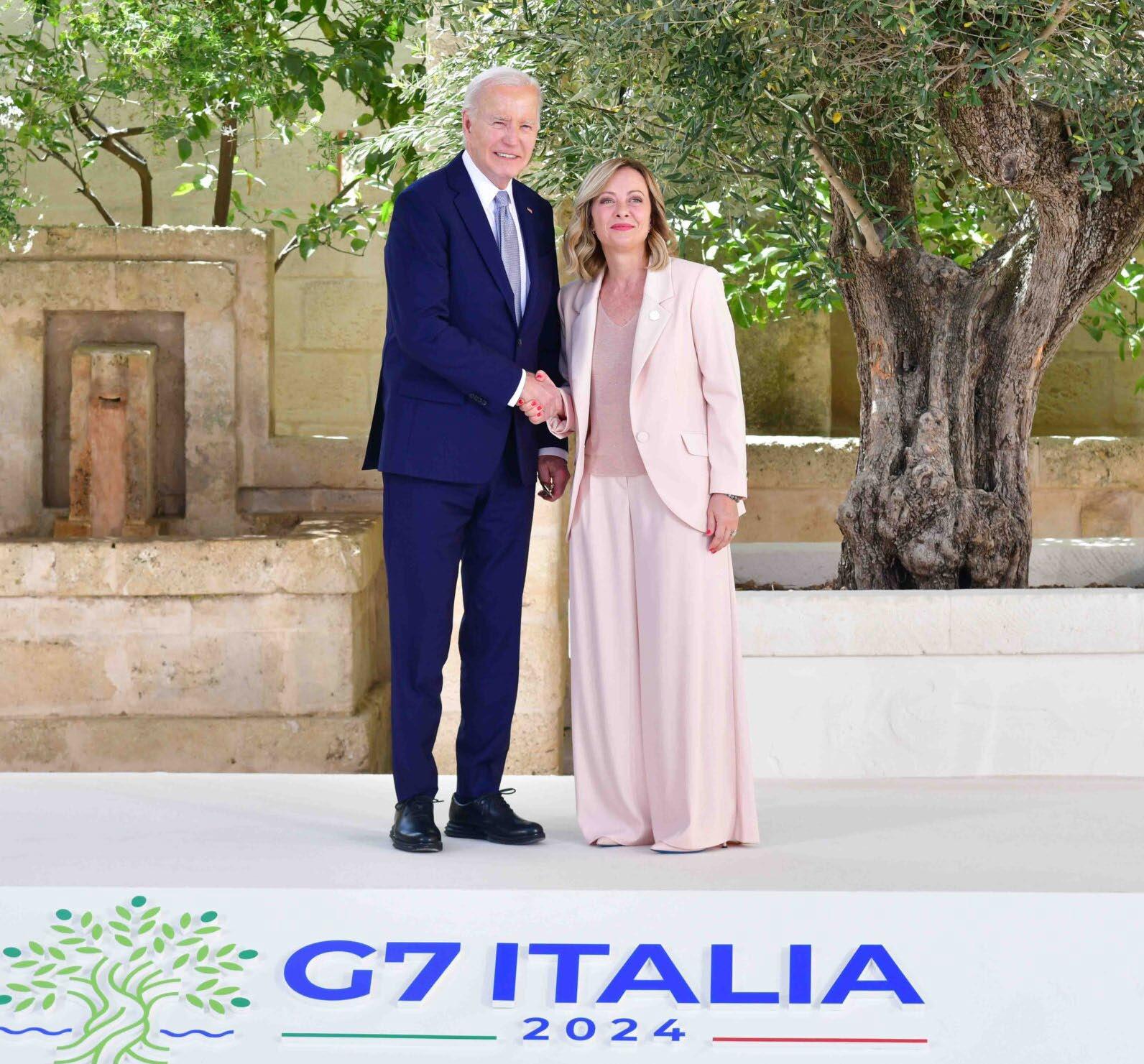
We call on Iran to stop assisting Russia’s war in Ukraine and not to transfer ballistic missiles and related technology, as this would represent a substantive material escalation and a direct threat to European security.
we will use to promote our vision of sustainable, resilient, and economically viable infrastructure in Africa, underpinned by transparent project selection, procurement, and finance. In that respect, we welcome the Mattei Plan for Africa launched by Italy.
Acknowledging that sustainable development and democracy are mutually reinforcing, we reiterate our commitment to supporting African governments in
advancing democratic governance and human rights, as we address conditions conducive to terrorism, violent extremism, and instability. In this respect, we are concerned about the activities of the Kremlin-backed Wagner Group and other emerging Russia-backed forces, which are having a destabilizing impact. We call for accountability of all those responsible for human rights violations and abuses. Countries should not be forced to hoose between fighting against poverty and protecting the planet or addressing global challenges, nor between repaying creditors and making further investments in development. We are committed to evolve the international financial architecture to make it fit for the challenges of today’s world. We support the ambition of partnerships such as the G20 Compact with Africa and the Paris Pact for People and Planet (4P), which work to foster collaboration between key global stakeholders to deliver additional financing for development, climate, and nature and fostering private sector investment. →
→ As outlined in the Nairobi-Washington Vision, we call on the international community to step up sustainable and transparent financing for developing countries willing to commit to ambitious reforms and investment plans, while emphasizing the importance of domestic resource mobilization. This includes working with other stakeholders to deliver coordinated international financial institution support packages, utilize tools to facilitate private finance on better terms and unlock private investments, and activate creditor coordination and private sector participation when needed, so as to ensure multilateral support is being used in the best interest of developing countries. We will work with the IMF, the World Bank, and other key parties to bring this plan forward, with a view to realizing it for pilot countries by the end of 2024.
We reaffirm our steadfast commitment towards the implementation of the 2030 Agenda for Sustainable Development and we will redouble our efforts to accelerate progress towards the SDGs, restated at the 2023 SDG Summit, to ensure nobody is left behind. With our partners, we will work on concrete and ambitious actions to achieve long-term sustainable development, strong, environmental social and governance standards, and shared prosperity worldwide. Noting that we have already exceeded our joint commitment of USD 14 billion to global food security, announced in Elmau in 2022, we remain steadfast in addressing the escalating global food security and nutrition crisis, aggravated by Russia’s war of aggression against Ukraine.
We are launching the G7 Apulia Food Systems Initiative (AFSI) to intensify our efforts to overcome structural barriers to food security and nutrition and to build resilient sustainable and productive agriculture and food systems, and to ensure that all people can progressively realize the right to adequate food. This includes enhancing sustainability and productivity of local, regional, and global supply chains and addressing discriminatory rules and norms that affect gender equality. This initiative will leverage multi-stakeholder partnerships to advance ambitious programs on the ground and harness the full potential of food systems.
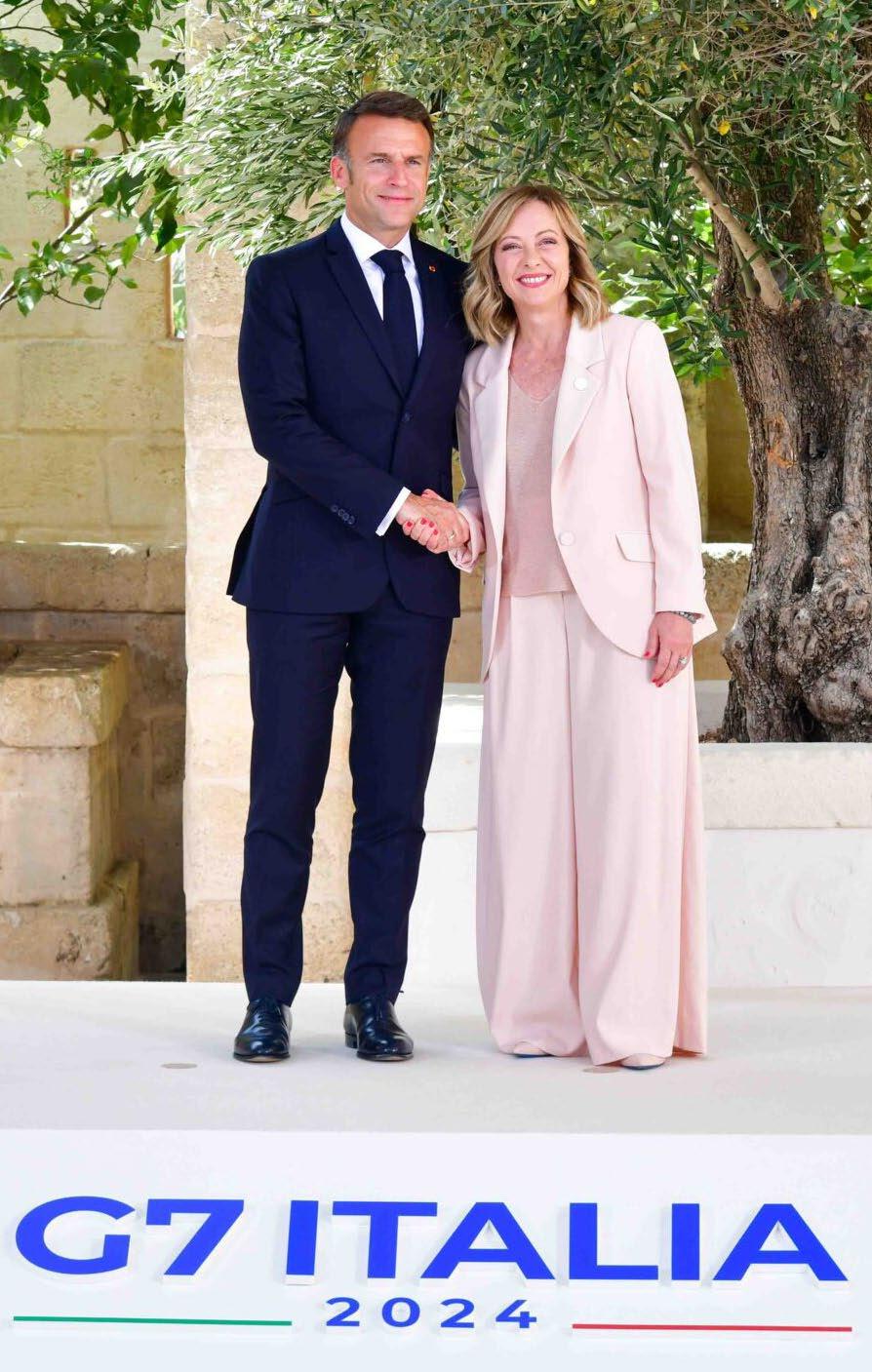
Noting global food supply disruptions due to climate change and that the Paris Agreement can only be reached by transforming food systems, we will support synergetic and coherent policies and investments to address the climate-food systems nexus, particularly in low-income countries. We will contribute to these efforts globally, with a special attention to implementing and aligning with the African continental plans by supporting the following multi-stakeholder programs developed with the African Union and other global partners: i) the Technical Cooperation Collaborative to implement the “COP28 UAE Declaration on sustainable agriculture, resilient food systems, and climate action” and enhance access to quality technical cooperation for the integration of food systems and climate plans in low-income and climate vulnerable countries; ii) the Vision for Adapted Crops and Soils for the restoration and maintenance of healthy soils and the further development and climate resilience of traditional and indigenous crops in Africa, recalling the importance of Africa Fertilizer and Soil Health Summit 2024; iii) a G7 private-public initiative on coffee aimed to further advance policy, sustained investments, research and innovation, partnerships, blended finance to boost the resilience,
environmental sustainability, value addition and circularity of the coffee value chains worldwide and to support smallholders and family farmers in producing countries, including examining the feasibility of the establishment of a global private-public fund on coffee.
Given childhood stunting and wasting caused by malnutrition can have lifelong physical, psychological and social effects that threaten sustainable development, we commit to support treatment and prevention to address this challenge. We will foster multi-stakeholder engagement and innovation, including with multilaterals, the private sector and philanthropies, and welcome in particular the 2025 Paris Nutrition for Growth Summit.
We will also promote innovative solutions to increase the quantity and quality of public and private funding for food security and food systems in low-income countries. We will: i) work together to improve the fiscal space for food security in line with continued efforts to improve the international financial architecture, including further analysis of the potential of debt swaps, ii) building on existing cooperation, initiate a collaborative of G7 public development banks and DFIs to enhance co-investment and risk-mitigation for sustainable agriculture and food systems transformation; iii) support the design and development of a Financing for ShockDriven Food Crisis Facility to provide rapid-response financing in anticipation of severe food crises, also involving private capital from global insurance markets.
Accordingly, we task our Development Ministers to further articulate the AFSI commitments and actions, ahead of their Meeting in October, in synergy with the Ministers of Finance, Agriculture and Environment, noting in particular the Initiative on Strengthening Seed Certification Capacity in Africa and the Africampus program to bridge educational gaps for African farmers and entrepreneurs, under joint development by the Ministers of Agriculture and international partners.
We also highlight synergies between AFSI, the Global Alliance for Food Security, and the Global Alliance against Hunger and Poverty under development within the G20, which the ambitions of we fully support.
We also continue to support coordinated action with and among the UN →





































→ Rome-based agencies and the wider UN system, MDBs and other relevant organizations, including the African Union.
With a view to addressing global food insecurity and malnutrition, we also acknowledge the importance of supporting fertilizer value chains including local fertilizer production in line with WTO rules and through supporting the use of local sources of energy, in consistency with a 1.5°C warming limit and the goals of the Paris Agreement.
We reaffirm our commitment to mobilize up to USD 600 billion through the PGII by 2027 towards sustainable, inclusive, resilient, and quality infrastructure and investments with partner countries, with a particular focus on Africa and on the Indo-Pacific.
We reaffirm the Carbis Bay commitment for our DFIs and multilateral partners to invest at least USD 80 billion into the private sector in Africa, and we recognize the importance of directing more investment to poorer and more fragile countries across the continent.
We will enhance this Partnership by: i) raising the profile of the PGII initiative throughout the G7 platform with the strong coordination and involvement of all its G7 tracks, and establishing a secretariat for effective implementation and investment coordination with partners; ii) supporting the launch of the African Virtual Investment Platform, in collaboration with the African Union and OECD, to enhance information sharing, transparency, and public policies on investment in Africa; iii) working together with our DFIs, MDBs, and private sector to improve green investments in Africa as part of our PGII commitment. In this respect, we will progressively enhance country-based investment coordination, including through platforms such as the Alliance for Green Infrastructure in Africa.
We commit to implement these key pillars, as we are stepping up our efforts to attract private investments at scale, improving the enabling environments, maximizing the role of MDBs and DFIs, enhancing co-financing, advancing high standards for quality infrastructure, including through certification schemes such as the Blue Dot Network and the FAST-INFRA Initiative and further developing a pipeline of bankable projects. We also call on all actors to adhere to international rules, standards, and principles, including the G20 Principles
We reaffirm our commitment to mobilize up to USD 600 billion through the PGII by 2027 towards sustainable, inclusive, resilient, and quality infrastructure and investments with partner countries, with a particular focus on Africa and on the Indo-Pacific.
for Quality Infrastructure Investments. We will further promote concrete G7 PGII initiatives, flagship projects, and complementary initiatives to develop transformative economic corridors for quality infrastructure and investment, such as the deepening of our coordination and financing for the Lobito Corridor, the Luzon Corridor, the Middle Corridor, and the India-Middle East-Europe Economic Corridor, also building on the EU Global Gateway, the Great Green Wall Initiative, and the Mattei Plan for Africa launched by Italy.
We reiterate our commitment to a free and open Indo-Pacific, based on the rule of law, which is inclusive, prosperous, and secure, grounded on sovereignty, territorial integrity, peaceful resolution of disputes, fundamental freedoms, and human rights. Peace and stability in the region are key to promoting global prosperity, and developments there can directly affect global security. We reaffirm our unwavering support for ASEAN centrality and unity and our commitment to promoting cooperation in line with the ASEAN Outlook on the Indo-Pacific. We also affirm our intention to work to support Pacific Island Countries’ priorities, as articulated through the 2050 Strategy for the Blue Pacific Continent. We seek constructive and stable relations with China and recognize the importance of direct and candid engagement to express concerns and manage differences. We act in our national interest. Given China’s role in the international community, cooperation is necessary to address global challenges, and
we continue to engage in areas of common interest. We call on China to step up efforts to promote international peace and security, and to work with us to tackle the climate, biodiversity, and pollution crises, combat illicit synthetic drug trafficking, ensure global macroeconomic stability, support global health security, and address vulnerable countries’ debt sustainability and financing needs. We recognize the importance of China in global trade. We are committed to advancing free and fair trade, a level playing field, and balanced economic relations, while updating and strengthening the multilateral rule-based trading system with the WTO at its core. We are not trying to harm China or thwart its economic development, indeed a growing China hat plays by international rules and norms would be of global interest. However, we express our concerns about China’s persistent industrial targeting and comprehensive non-market policies and practices that are leading to global spillovers, market distortions and harmful overcapacity in a growing range of sectors, undermining our workers, industries, and economic resilience and security. We are not decoupling or turning inwards. We are de-risking and diversifying supply chains where necessary and appropriate, and fostering resilience to economic coercion. We further call on China to refrain from adopting export control measures, particularly on critical minerals, that could lead to significant global supply chain disruptions. With these concerns in mind, together with partners, we will invest in building our and their respective industrial capacities, promote diversified and resilient supply chains, and reduce critical dependencies and vulnerabilities. We will strengthen diplomatic efforts and international cooperation, including in the WTO, to encourage fair practices and build resilience to economic coercion. We will continue to take actions, as necessary and appropriate, to protect our workers and businesses from unfair practices, to level the playing field and remedy ongoing harm. We call on China to uphold its commitment to act responsibly in cyberspace. We will continue our efforts to disrupt and deter persistent, malicious cyber activity stemming from China, which threatens our citizens’ safety and privacy, undermines innovation, and puts our critical
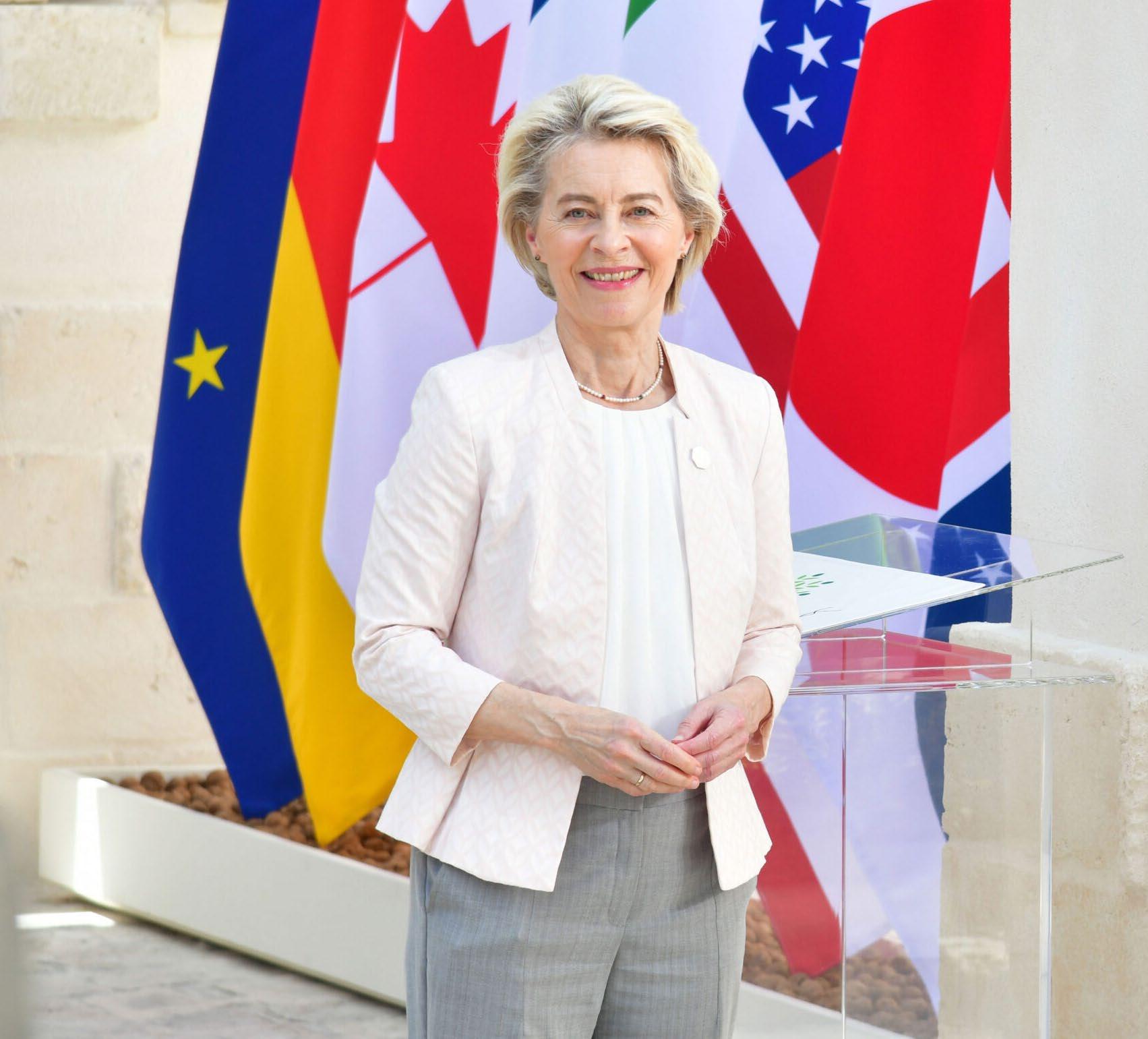
infrastructure at risk. We recognize the necessity of protecting certain advanced technologies that can be used to threaten our national security, without unduly limiting trade and investment.
We reaffirm that maintaining peace and stability across the Taiwan Strait is indispensable to international security and prosperity. We support Taiwan’s meaningful participation in international organizations, including in the World Health Assembly and WHO technical meetings, as a member where statehood is not a prerequisite and as an observer or guest where it is. There is no change in the basic positions of the G7 members on Taiwan, including stated one China policies. We call for a peaceful resolution of crossStrait issues.
We remain seriously concerned about the situation in the East and South China Seas and reiterate our strong opposition to any unilateral attempt to change the status quo by force or coercion. We continue opposing China’s dangerous use of coast guard and
maritime militia in the South China Sea and its repeated obstruction of countries’ high seas freedom of navigation. We express serious concern about the increasing use f dangerous maneuvers and water cannons against Philippine vessels. In this regard, we reaffirm that there is no legal basis for China’s expansive maritime claims in the South China Sea, and we oppose China’s militarization, and coercive and intimidation activities in the South China Sea. We re-emphasize the universal and unified character of the United Nations Convention on the Law of the Sea (UNCLOS) and reaffirm UNCLOS’s important role in setting out the legal framework that governs all activities in the oceans and the seas. We reiterate that the award rendered by the Arbitral Tribunal on 12 July 2016 is a significant milestone, which is legally binding upon the parties to those proceedings, and a useful basis for peacefully resolving disputes between the parties.
We express our deep concern at the People’s Republic of China’s support to
Russia. We call on China to press Russia to stop its military aggression and immediately, completely and unconditionally withdraw its troops from Ukraine. We encourage China to support a comprehensive, just and lasting peace based on territorial integrity and the principles and purposes of the UN Charter, including through its direct dialogue with Ukraine. China’s ongoing support for Russia’s defense industrial base is enabling Russia to maintain its illegal war in Ukraine and has significant and broad-based security implications. We call on China to cease the transfer of dual-use materials, including weapons components and equipment, that are inputs for Russia’s defense sector.
We remain concerned by the human rights situation in China, including in Tibet and in Xinjiang where forced labor is a major concern to us. We are also worried by China’s crackdown on Hong Kong’s autonomy, independent institutions, and civil society and continued erosion of rights and freedom, including through the recent enactment of legislation under Article 23 of the Basic Law that has broad and vaguely defined provisions regarding “sedition”, “state secrets,” and interactions with foreign entities. We express concerns about the use of such laws to silence dissent in Hong Kong and overseas, including politically motivated prosecutions. These developments will make it harder to live, work and do business in Hong Kong.
We call on China not to conduct or condone activities aimed at undermining the security and safety of our communities and the integrity of our democratic institutions, and to act in strict accordance with its obligations under the Vienna Convention on Diplomatic Relations and the Vienna Convention on Consular Relations.
We reiterate our call for the complete, verifiable, and irreversible dismantlement of all North Korea’s weapons of mass destruction and ballistic missiles. We urge all UN Member States to fully implement all relevant UN Security Council resolutions and reiterate our deep disappointment with Russia’s veto in March on the UNSCR 1718 Committee Panel of Experts mandate renewal. We strongly condemn North Korea’s continued development of its ballistic missile program in defiance of multiple UNSCRs, including through launches of intercontinental ballistic →
→ missiles (ICBM) and space launch vehicles using ballistic missile technologies. We condemn in the strongest possible terms the increasing military cooperation between North Korea and Russia, including North Korea’s export and 13 Russia’s procurement of North Korean ballistic missiles in direct violation of relevant UNSCRs, as well as Russia’s use of these missiles against Ukraine. We are also deeply concerned about the potential for any transfer of nuclear or ballistic missiles-related technology to North Korea, in violation of the relevant UNSCRs. We urge Russia and North Korea to immediately cease all such activities and abide by relevant UNSCRs. We reiterate our commitment to counter sanctions evasion and strengthen enforcement of all North Korea related UNSCRs. We call on North Korea to accept repeated offers of dialogue, to enhance regional peace and security. We strongly condemn North Korea’s choice to prioritize its unlawful WMD and ballistic missile programs over the welfare of the people in North Korea and we demand that it abandons these programs. We urge North Korea to respect human rights, facilitate access for international humanitarian organizations, and resolve the abductions issue immediately.
We reiterate our firm condemnation of the brutal repression of the people of Myanmar by the Myanmar military regime, and express our concern with the expanding humanitarian crisis across the country.
We deplore the implementation of the 2010 People’s Military Service Law. This is causing further internal and regional displacement, risks exacerbating divides and hampering reconciliation. Accountability for serious crimes committed in the whole country remains essential. We are particularly concerned that sectarian tensions could inflame Rakhine again, hindering the creation of conditions for voluntary, safe, dignified and sustainable return of Rohingya refugees and all displaced persons, while propelling regional instability.
We reiterate our demands for unimpeded humanitarian access to those in need, that all parties respect human rights and international humanitarian law, and for the release of those arbitrarily detained.
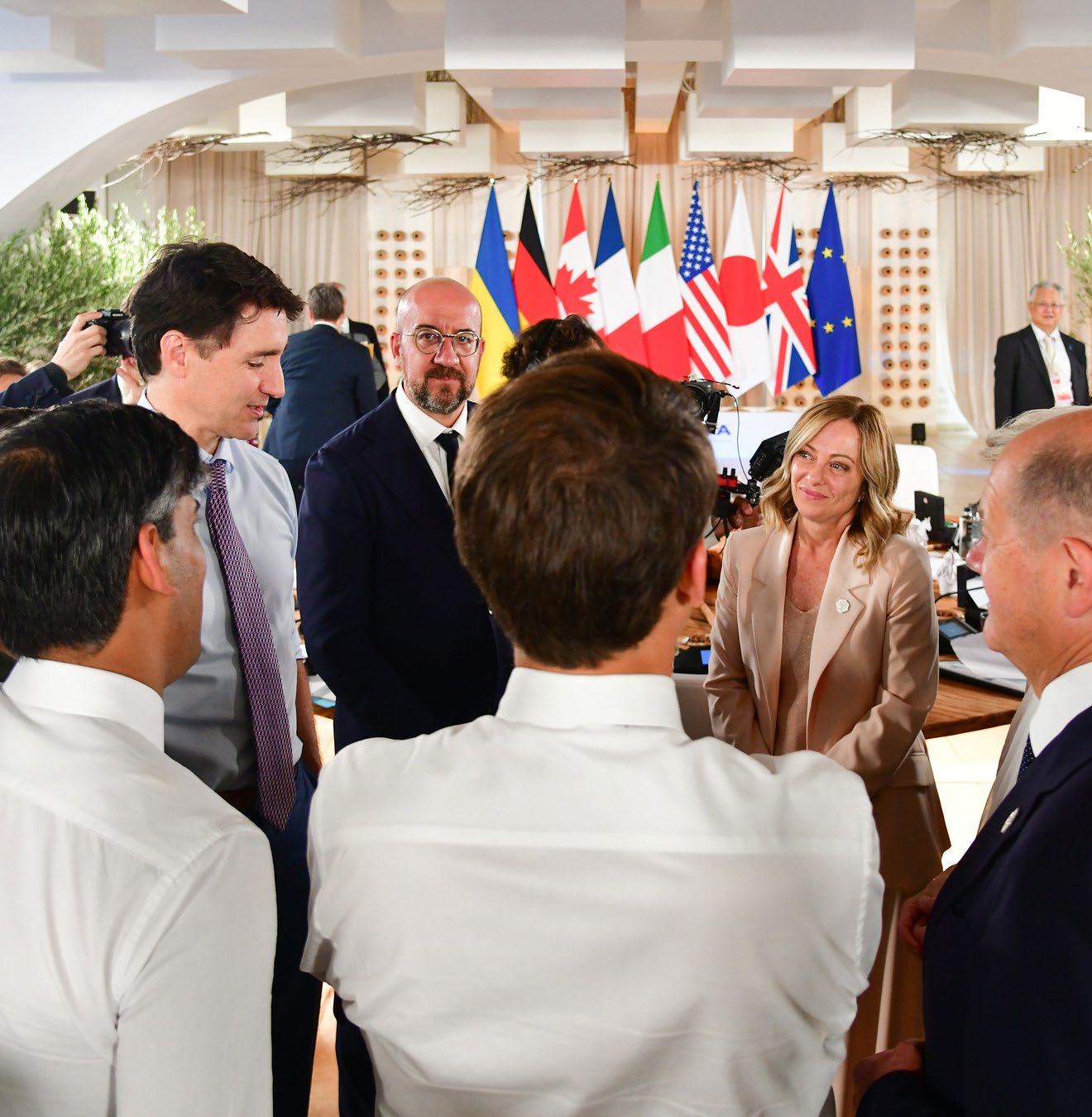
We reaffirm that an inclusive dialogue with all stakeholders is essential to restore foundations for a durable democratic process.
We also reiterate the importance of UNSCR 2669 and continue to support the UN’s further engagement in the crisis and ASEAN’s efforts to achieve the implementation of the Five-Point Consensus.
We restate our appeal on all States to prevent or to halt the flow of arms and dual-use material, including jet fuel, to the Myanmar military, and to contribute to the search for a viable political solution which respects the democratic aspirations of Myanmar’s people.
We commit to work together with other members of the international community
for the stabilization of Haiti and to ensure robust and timely funding and other support for the Kenya-led Multinational Security Support (MSS) mission, which needs to be deployed as soon as possible, and to support the Haitian National Police (HNP). We welcome Kenya’s leadership of the MSS mission. It is imperative that violence by criminal gangs is stopped. We welcome the establishment of the Presidential Transitional Council (CPT) as well as the appointment of interim Prime Minister Garry Conille and look forward to the rapid establishment of a transitional Government as the outcome of a transparent and inclusive national process. It is necessary to address urgently the most immediate needs of the population, protect women and children, restore security and the rule of law and start shaping the institutional framework required to lead
It is necessary to address urgently the most 14 immediate needs of the population, protect women and children, restore security and the rule of law and start shaping the institutional framework required to lead Haiti to free and democratic elections by February 2026.
Haiti to free and democratic elections by February 2026. We will continue to follow closely developments in Haiti. To that end, we welcome the efforts of the newly established G7 Working Group on Haiti to advance the MSS mission, the country’s stabilization, including through humanitarian assistance and long-term development, accountability mechanisms, and democratic governance in Haiti.
LIBYA
We reaffirm our unwavering commitment to Libya’s stability, independence, territorial integrity and national unity, including in the face of external interference. We call on all Libyan institutional stakeholders to overcome the current political stalemate by engaging in meaningful dialogue in good faith and without preconditions. An inclusive, Libyan-led, Libyan-owned political process facilitated by the UN remains the only viable pathway towards free and fair national presidential and parliamentary elections. In this context, we call on the Secretary-General of the United Nations to appoint a new Special Representative without delay, and affirm our full support to the United Nations Support Mission in Libya interim leadership.
We remain concerned for the deterioration of the security situation in the Sahel, including the spread of terrorism and
violent conflict causing widespread misery and displacement of the civilian population. This is compounded by the backsliding of the principles of constitutional rule of law, democracy and good governance and regression in the regional cooperation frameworks.
The grave human rights violations committed by multiple parties, including Russian proxies and local security forces in the region are unacceptable.
The challenge of growing political tension, confrontation, and instability in the Sahel requires renewed efforts by all relevant actors and stakeholders in reconfiguring international and regional responses.
A continued support to the civilian populations in the Sahel is essential to alleviate their suffering.
We call upon the States of the Sahel to accelerate the pace of the transition for return to constitutional order, and stand ready to assist them. We look forward to enhancing cooperation with the African Union and its current Mauritanian Presidency as well as regional organizations and the UN in fostering stability, security, good governance and development in the Sahel, preventing the spill-over of insecurity towards the Gulf of Guinea and North Africa, as well as irregular migratory flows.
We strongly condemn the ongoing fighting in Sudan, including human rights violations and abuses, as well as international humanitarian law violations since April 2023. The situation is constantly deteriorating with increased civilian casualties. We express particular concern for the risks posed to women and children by both parties to the conflict and the increase in ethnic-based violence which must cease immediately. This is further undermining the fragile humanitarian situation and creating further displacement risks. All parties must allow and facilitate rapid and unimpeded passage of humanitarian relief. We reiterate our call on all parties to immediately cease hostilities throughout the country, to enter into serious, direct negotiations, to agree and implement an immediate and lasting ceasefire without pre-conditions. We are deeply concerned by the current escalation in El-Fasher in North Darfur. We urge external actors to refrain
from fueling the conflict, and we encourage all Sudanese actors to engage in a national dialogue inclusive of the composite Sudanese civil society and aimed at re-establishing civilian and representative institutions to meet the democratic aspirations of the Sudanese people. An active African and regional role, as well as the intensified and coordinated efforts of the international community, remain essential to ending violence and restoring democracy. We welcome the outcomes of the Paris Conference for udan and the neighboring countries, where over EUR 2 billion have been pledged to support the civilian population in Sudan, and those who sought refuge in neighboring countries.
We are deeply concerned by the ongoing political, economic, and humanitarian crisis in Venezuela and by the lack of progress on the implementation of the Barbados Agreement of October 2023, with regard to the rights of the opposition within the electoral process and the decision to withdraw the invitation for an EU election observation mission. We call on Venezuela to fully implement the Barbados Agreement and to ensure competitive and inclusive elections on 28 July, that encompass full and credible international electoral observation missions. We further demand an end to the harassment of opposition members, and for the release of all political prisoners immediately.
We are following closely developments between Venezuela and Guyana over the Essequibo region and welcome regional efforts to maintain dialogues between the parties. We demand that Venezuela refrain from further destabilizing initiatives. The matter must be resolved peacefully, in line with international law.
We reiterate our condemnation of the Belarusian regime’s complicity in Russia’s war against Ukraine. We express our continued concern over the regime’s continuing repression of independent media, civil society, opposition, and citizens that peacefully express their views. We also condemn the ill treatment of political prisoners and ask for their immediate and unconditional release. →
We emphasize the transformative power of cities worldwide as drivers for sustainable development. We will continue our cooperation on sustainable urban development and task our relevant Ministers to discuss concrete actions to reduce spatial inequalities, protect the environment and climate, and promote smart and innovative economies in urban areas.
We reiterate our determination to address the triple global crisis of climate change, pollution, and biodiversity loss. We remain steadfast in our commitment to the Paris Agreement and keeping a limit of 1.5°C global temperature rise within reach, and note with deep concern the findings of the first Global Stocktake at the UN Climate Change Conference (COP28) that there is a significant gap between global current emissions trajectories and this commitment. Our goal remains unchanged, to provide a substantial contribution to efforts to reduce global GHG emissions by around 43 per cent in this critical decade and by 60 per cent by 2035, relative to the 2019 level. We underline that this is a collective effort and further actions from all countries, especially major economies, are required in order to peak global GHG by 2025 at the latest and achieve net-zero by 2050.
We commit to submitting ambitious 1.5°C aligned NDCs, which will be catalysts for investments, with economywide, absolute reduction targets, covering all GHGs, sectors and categories. Underlining that this is a collective effort, we call on all countries, especially G20 and other major economies, to do the same. We will advance global and regional efforts to secure affordable clean energy for all, recognizing different national pathways.
We welcome the commitments, as set forth in COP28, to triple global renewable capacity and double the global average annual rate of energy efficiency improvements by 2030. Energy efficiency is the first fuel and an essential element of clean energy transition. We also commit to meet the global goal of deploying 1500 GW of energy storage in the power sector by 2030, including through existing targets and policies. We will transition away from fossil fuels in energy systems in a just, orderly, and
equitable manner, accelerating actions in this critical decade, to achieve net-zero by 2050 in keeping with the best available science. We will operationalize these commitments through the development and implementation of domestic plans, policies and actions, including to inform and be reflected in our NDCs and LTSs, and through intensive efforts to reduce demand for and use of fossil fuels. We reaffirm our commitment to eliminate inefficient fossil fuel subsidies by 2025 or sooner and will report in 2025 on progress made.
We call on others to do the same.
We reaffirm the important role of high-integrity carbon markets and carbon pricing, to foster cost-efficient reductions in emission levels, drive innovation and enable a transformation to net-zero and will work together and with others to accelerate their ambitious use.
To achieve our climate goals and help all countries reap the benefits of the clean energy transition, we will work with partners to end support for new unabated coal power, accelerate investments in renewable and clean energy sources, and establish secure, diverse, responsible clean energy supply chains. We reaffirm our commitment to achieve a fully or predominantly decarbonized power sector by 2035 and to phase out existing unabated coal power generation in our energy systems during the first half of 2030s, or in a timeline consistent with keeping a limit of 1.5°C temperature rise within reach, in line with countries’ net-zero pathways. We reiterate our call for other countries and partners to join us in ending permitting and construction of new unabated coal-fired powerplants as soon as possible, and will promote cooperation with countries, international partners, and relevant organizations, including the financial sector, to this end, noting the work of those joining the Powering Past Coal Alliance and the Coal Transition Accelerator, to facilitate these goals.
We commit to accelerating the transition toward decarbonization in the industrial sectors and particularly in the hard-to-abate sectors. We will promote and facilitate the scale-up of investments in the industrial sector for innovative technologies, smart clean electrification, improved energy efficiency, direct use of renewable heat, sustainable bio energies, sustainable production of energy from waste,
sustainable biogases and biofuels, renewable, clean/zero-emission and low-carbon hydrogen and its derivatives such as ammonia and direct use of renewable energy close to demand centers, the use of carbon management technologies. We also commit to accelerate the reduction of emissions from transport. We will continue working on this, including through the G7 Industrial Decarbonization Agenda as well as the Climate Club and its ambitious work program.
We reaffirm that the transition to a net-zero economy by 2050 at the latest should be inclusive and leave no one behind, and should be an opportunity for enhancing social development and economic growth, maximizing positive benefits for local economies while addressing negative social or economic impacts that may arise from climate action. Recognizing that cutting methane emissions from fossil fuel operations by means of already existing technologies is largely feasible and costeffective for oil and gas operations, we will intensify efforts to tackle methane emissions in line with the global reduction level of at least 35 percent in methane emissions by 2035. We commit to pursue a collective effort towards a 75 per cent reduction in global methane emissions from fossil fuels, including by reducing the methane emissions intensity of oil and gas operations by 2030, through developing a robust methodology and use of measure data, and work with non-G7 oil and gas producing countries particularly in Africa, to deliver deep cuts to methane emissions.
Reaffirming our commitments in the 2023 Hiroshima Leaders’ Statement, we note that G7 countries have made significant progress in reducing dependency on Russian fossil fuels, including through energy savings and gas demand reduction in a manner consistent with our Paris Commitments and address the global impact of Russia’s war on energy supplies, gas prices and inflation, and people’s lives, recognizing the primary need to accelerate the clean energy transition. We recognize that restricting Russian energy revenues is an essential part of our support to Ukraine and are pursuing to end significant dependency on, and to work on transitioning away from imports of Russian gas as soon as possible. In this context, we stress the important role that increased deliveries of LNG can play and →


→ acknowledge that investment in the sector can be appropriate in response to the current crisis and to address potential gas market shortfalls provoked by the crisis. In the exceptional circumstance of accelerating the phase-out of our dependency on Russian energy, publicly supported investments in the gas sector can be appropriate as a temporary response, subject to clearly defined national circumstances, if implemented in a manner consistent with our climate objectives without creating lock-in effects, for example by ensuring that projects are integrated into national strategies for the development of low-carbon and renewable hydrogen. Those G7 countries that opt to use nuclear energy or support its use recognize its potential as a clean/zero-emissions energy source and reiterate its potential in accelerating the transition to net-zero and improving global energy security. They will continue supporting cooperative efforts to responsibly strengthen nuclear supply
chains’ safety, reliability and resilience while also promoting responsible waste management. We support Japan’s safe, transparent, and science-based process to responsibly manage the discharge of Advanced Liquid Processing System treated water and in proactively coordinating with scientists and partners as well as the IAEA. They will also promote research and development in innovative technologies for advanced and small modular reactors, including microreactors, work collectively to enable greater access to project financing tools, and support sectorial collaboration. They note the global Declaration to Triple Global Nuclear Energy Capacity by 2050, launched during COP28. We will further reduce reliance on civil nuclear and related goods from Russia, including working to assist countries seeking to diversify their supplies. We underline that the highest standards of nuclear safety and security are important to all countries and their
respective publics.
Fusion energy technology has the potential to provide a lasting solution to the global challenges of climate change and energy security. We will promote international collaborations to accelerate the development and demonstration of fusion plants to foster private investments and public engagement. With this aim, we commit to establishing a G7 Working Group on Fusion Energy. We will also work towards consistent approaches to fusion regulations. To enhance cooperation in this field, we welcome Italy and the International Atomic Energy Agency’s decision to host in Rome the inaugural ministerial meeting of the World Fusion Energy Group.
We recall our commitment to holistically addressing energy security, climate crisis and geopolitical risk. In this context, we strongly encourage international partnerships to make critical minerals and critical raw materials supply chains more diversified,
We are determined to ensure affordable, reliable, sustainable, clean, and modern energy in developing countries, particularly in Africa, recognizing the opportunity that the clean energy transition presents to spur a new era of productivity, industrial growth, and economic development, and to advance the priority of clean cooking in the continent.
role in supporting Africa’s ambitions and efforts to develop adequate clean energy infrastructure and supply chains. For this reason, we are launching the Energy for Growth in Africa initiative, alongside Côte d’Ivoire, Ethiopia, Kenya, Mozambique, Nigeria, Republic of Congo, and South Africa, and we look forward to others joining. This initiative will drive clean energy investments across the continent with strong African countries’ ownership, contributing to addressing persistent barriers and gaps, and advancing sustainable, resilient and inclusive growth and industrial development. Our efforts will be geared towards ensuring Africa can fulfil its potential to become a global sustainable energy hub using relevant platforms, such as the UNDP Center for Climate, Energy and Environment established by the Italian Presidency.
necessary public and private investments. In this context, we welcome the Menu of Policy Options for a Just Transition towards Net Zero and the High-Level Framework for Public-Private Insurance Programs against Natural Hazards as a viable measure.
We will work with the MDBs, IFIs and other climate finance providers to take a coordinated approach to financing climate action, nature-based solutions, and sustainable energy projects in developing countries, including by supporting private finance and domestic resource mobilization. We will effectively prioritize our international support in the energy sector towards accelerating the clean energy transition. We call on other major economies and all the relevant entities to do the same.
transparent, resilient, responsible, circular, resource efficient, and sustainable. We will support local value creation in critical minerals supply chains, in line with WTO rules. We are working to advance strong international environmental, social, and governance standards for critical minerals extraction, processing, and recycling while leveraging their economic and development opportunities, particularly in low-income countries, including through implementation of the Five-Point Plan for Critical Mineral Security, as well as driving work through the International Energy Agency, the Mineral Security Partnership, and the RISE Partnership and the Sustainable Critical Mineral Alliance.
We will work to accelerate investment in clean energy and build out the secure, responsible, and diverse supply chains necessary to achieve these goals, together with partners around the world.
We are determined to ensure affordable, reliable, sustainable, clean, and modern energy in developing countries, particularly in Africa, recognizing the opportunity that the clean energy transition presents to spur a new era of productivity, industrial growth, and economic development, and to advance the priority of clean cooking in the continent. We stand ready to play a pivotal
Furthermore, we strongly support the creation of new sustainable energy generation capacity in Africa and the Mediterranean to contribute to global decarbonization goals, in our common fight against climate change, as well as the development of greater interconnectivity to help reduce the cost of the energy transition. We encourage and actively support the acceleration of private investment, including through public-private partnerships, increasing Africa’s integration with the global energy market, in particular through the Mediterranean region.
We continue exploring innovative financing sources for climate and biodiversity action and clean energy, innovative schemes such as payment for ecosystem services, green bonds and high-integrity biodiversity credits with environmental and social safeguards. In particular, we support the issuance of green bonds in low- and middle-income countries, particularly on the African continent, to encourage private financial flows for sustainable investments and the growth of capital markets, in line with existing initiatives such as the Global Green Bonds Initiative.
We acknowledge the importance of fiscal space and mobilizing resources from all sources for increased climate and development action particularly for lowincome and vulnerable countries, and that the fights against climate change and poverty go hand in hand. We will implement effective policy frameworks to drive the
We look forward to setting a new collective quantified goal on climate finance at COP29, and recognize that a new goal is a unique opportunity to strengthen the international climate finance landscape in this critical decade to keep 1.5°C within reach. We emphasize that G7 countries intend to be leading contributors to a fit-for-purpose goal, underlining the importance of including those countries that are capable of contributing to any international public finance mobilization. As assessed by the OECD, developed countries exceeded the annual goal of providing and mobilizing USD 100 billion in climate finance for developing countries in 2022, an achievement that we warmly welcome.
We note that, despite progress, there is a need to continue to scale up action and support, including finance for climate adaptation as called for in the Glasgow Climate Pact. We will continue supporting the most vulnerable developing countries in translating national adaptation plans and other national adaptation instruments into investment plans aligned with their needs and priorities, including through the G7 Adaption Accelerator Hub.
We emphasize the importance of whole-of-society approaches, with the meaningful participation of the people and communities on the frontlines of the triple crisis, including women, youth, and Indigenous Peoples. We recognize that they are disproportionately affected by the impacts of climate change and recognize their critical role as leaders and agents of change. →
→ Recognizing the role of younger generations to promote climate action and drive a more sustainable future, we need to empower their voices and their participation. Building on successful initiatives, such as the Youth4Climate program, we commit to amplifying youthled initiatives, enhancing educational opportunities, and bolstering advocacy efforts.
We are committed to halting and reversing biodiversity loss by 2030 and to the swift and full implementation of the Kunming-Montreal Global Biodiversity Framework (KMGBF) and achieving each of its goals and targets, including the 30 by 30 targets. For those G7 members that are parties to the Convention on Biological Diversity (CBD), we will revise and submit updated National Biodiversity Strategies and Action Plans in alignment with the KMGBF or communicate national targets reflecting the KMGBF ahead of the 16th UN Biodiversity Conference. We recall our previous commitment to increase our national and international funding for nature by 2025, and to substantially and progressively increase the level of financial
resources from all sources including by providing support to the Global Environment Facility. We commit to align all relevant financial and fiscal flows with the KMGBF. We note that Target 19 aims at mobilizing at least USD 200 billion per year by 2030 for biodiversity from all sources, including USD 20 billion per year by 2025 and USD 30 billion per year by 2030, through international financial resources. We are all still concerned about incentives, including subsidies, harmful to biodiversity, and call upon all relevant organizations to continue collaborating with us, including by assisting in identifying such incentives, and we are all working to fulfil our respective applicable commitments, including, inter alia, to identify these incentives by 2025, and redirect or eliminate them, while scaling-up positive incentives for the conservation and sustainable use of biodiversity by 2030 at the latest, taking initial steps without delay.
In this context we are committed to halt and reverse deforestation and forest and land degradation by 2030 globally. We are committed to promoting sustainable forest management and sustainable use of woods
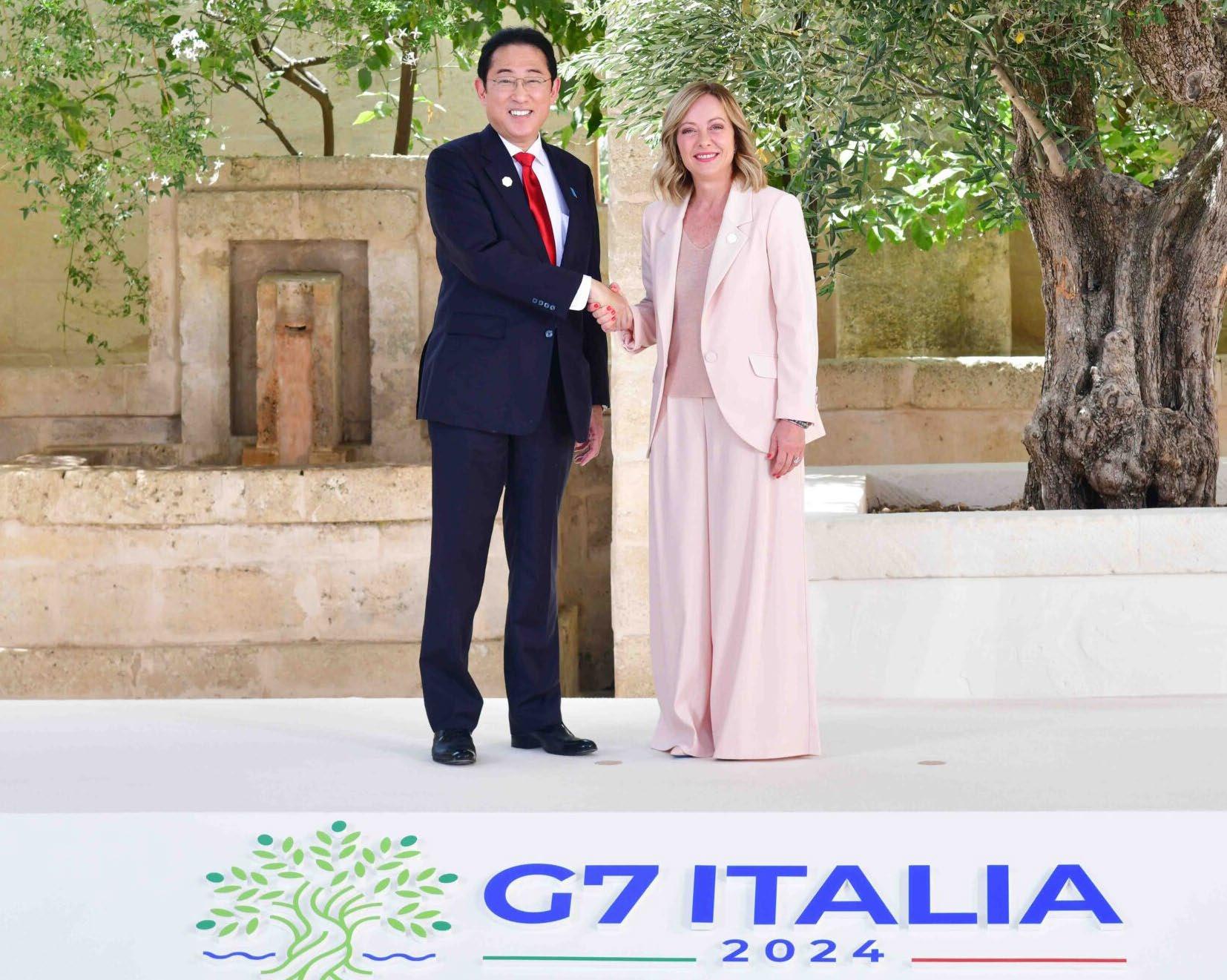
and advancing sustainable supply chains that decouple agricultural production from deforestation and forest and land degradation, recognizing the importance of demand and supply-side measures. We are committed to developing innovative financial solutions for conserving, protecting, and restoring forests, and in that context welcome the launch of country packages for forests, nature, and climate at COP28. We will also take steps to prevent, manage, and address the negative impacts of extreme wildfires.
We reiterate our deep concern about the health of the ocean and seas, and we are united in the call for transformative action on ocean governance to tackle the triple planetary crisis of climate change, biodiversity loss, and pollution. We will work towards a successful UNOC3 in 2025 in this regard. We commit to pursue the swift ratification, approval, acceptance, and accession of the agreement on the conservation and sustainable use of marine biological diversity of areas beyond national jurisdiction and to contribute to a rapid entry into force and implementation. We will accelerate efforts to decouple economic growth from negative environmental impacts and primary resource use by expanding the transformation of our economies to be net-zero, circular, climateresilient, pollution-free and nature-positive. We are committed to end plastic pollution with the ambition to reduce additional
We reiterate our deep concern about the health of the ocean and seas, and we are united in the call for transformative action on ocean governance to tackle the triple planetary crisis of climate change, biodiversity loss, and pollution. We will work towards a successful UNOC3 in 2025 in this regard.
plastic pollution to zero by 2040 and, as appropriate, reduce the global production and consumption of primary plastic polymers in the context of our actions throughout the full life cycle of plastic. We support efforts to develop an international legally binding instrument on plastic pollution of the highest ambition possible by the end of 2024, based on a comprehensive approach that addresses the full life cycle of plastic. We also continue our work to reduce air pollution. We call on the global community to do the same. We will step up our efforts to increase resource efficiency and circular economy. They can reduce pressure on primary resources and play a key role in mitigating the adverse impacts of resource extraction and processing, while, at the same time, increasing the resilience of our economies to potential future shocks and fostering innovation and sustainability.
Safe water and healthy soils and ecosystems, including marine and coastal ecosystems, are vital for preserving life and livelihoods, and mitigating climate change and environmental degradation’s impact, including climate-induced displacement, particularly in Africa. We express concern about Russia’s environmentally unsustainable and unfair trading practices regarding fish and seafood products. We look forward to successful outcomes at the upcoming Conference of the Parties to the Convention on Biological Diversity (CBD COP16) in Colombia and the UN Conference to Combat Desertification (UNCCD COP16) in Saudi Arabia. With this aim, the Italian G7 Presidency is setting up a Hub on Sustainable Use of Land, dedicated to promoting a collaborative and common approach to sustainable land use initiatives in Africa and the Mediterranean Basin. Recognizing the importance of water and sanitation for sustainable development, prosperity and peace, we endorse the establishment of a G7 Water Coalition to coordinate our action and strengthen our cooperation on water-related issues, and we welcome the organization of the One Water Summit in Riyadh at the margins of UNCCD COP16.
We reaffirm the critical role our DFIs can play in contributing to the mobilization of finance from all sources for advancing G7 energy, climate and environment commitments.
Artificial Intelligence, Science, Technology, and Innovation
Artificial Intelligence can play a crucial role in promoting progress and development in our societies. We will promote safe, secure, and trustworthy AI. We will pursue an inclusive, human-centered, digital transformation that underpins economic growth and sustainable development, maximizes benefits, and manages risks, in line with our shared democratic values and respect for human rights.
In this regard, we recognize the need for approaches to AI governance that foster inclusion, to help us harness the potential of AI in a way that reflects these values and promotes its development while mitigating risks, including with respect to human rights and avoiding governance fragmentation. We will work toward these objectives by actively cooperating with other stakeholders, organizations and initiatives as relevant, such as the Global Partnership on AI (GPAI) and the OECD. We will build on the outcomes of the AI Seoul Summit and upcoming milestones, including this year’s UN Summit of the Future and the AI Action Summit in 2025.
Recognizing the importance of advancing the Hiroshima AI Process outcomes, we welcome support from the countries and organizations beyond the G7, as demonstrated by its Friends Group.
We will step up our efforts to enhance interoperability amongst our AI governance approaches to promote greater certainty, transparency and accountability while recognizing that approaches and policy instruments may vary across G7 members. We will take a risk-based approach in these efforts as we seek to foster innovation and strong, inclusive, and sustainable growth.
To achieve this goal, we will step up our coordination around the evolution of our governance and regulatory frameworks, including by sharing best practices. We will enhance our regular consultations. We are also committed to deepening coordination between our respective institutes and offices focused on AI, to work towards shared understanding of risk management and advance international standards for AI development and deployment. We welcome our Industry, Tech, and Digital Ministers’ efforts to advance the Hiroshima AI Process outcomes released last year, including the →

→ development of a reporting framework for monitoring the International Code of Conduct for Organizations Developing Advanced AI Systems. We look forward to the pilot of the reporting framework, developed in cooperation with the OECD, in view of the Industry, Tech, and Digital Ministers’ Meeting in October. We will work towards developing a brand that can be used to identify organizations that are voluntarily participating in and implementing the Code’s forthcoming reporting framework.
We welcome the G7 Toolkit for Artificial Intelligence in the Public Sector, that can help governments to deliver better services to our economies and societies, while protecting human rights and fundamental freedoms.
We will work to ensure that AI enables increased productivity, quality jobs, and decent work; empowers workers; fosters inclusiveness and equal opportunities in the world of work; and enhances active labor market policies, including by fostering dialogue and transparency with workers organizations. To achieve these goals, we will launch an action plan on the use of AI in the world of work. We ask our Labor Ministers to develop the action plan, envisaging concrete actions to fully leverage the potential of AI to enable decent work and workers’ rights and full access to adequate reskilling and upskilling, while addressing potential challenges and risks to our labor markets. We emphasize the need to anticipate future skills needs, provide higher education opportunities and equip workers and employers with the skills and competencies needed to design, adopt, and work with a human-centric, safe, secure and trustworthy AI. Against this background, we also emphasize the importance of innovative education, international talent mobility, digital competencies, and personalized lifelong learning to meet the demand for a qualified workforce. We recognize and encourage the work of the private sector to address skills gaps, including through the Global Partnership on Artificial Intelligence’s Working Group on the Future of Work.
Acknowledging the key role that emerging technologies can play in economic growth, we commit to enhancing cooperation to bolster the adoption and development of new technologies, including AI, among micro, small, and medium enterprises, thereby fostering inclusive economic growth.
Given the potential of quantum technology developments, we will adopt or implement our respective quantum strategies. We also affirm our commitment to promoting responsible innovation of biotechnology, including its convergence with AI.
ecosystems, strengthen capacities to advance AI for sustainable development, and complement existing initiatives including the AI for Development Donors Partnership.
We reiterate the importance of operationalizing Data Free Flow with Trust (DFFT) to enable trustworthy cross-border data flows, and invigorate the digital economy as a whole, while preserving governments’ ability to address legitimate public interest. We value OECD’s leading role in advancing DFFT and we welcome its expert community.
As we look to the future of emerging technologies, we encourage transparency and adherence to international workers’ rights and labor standards at each stage of the AI supply chain. We also encourage our competition authorities to monitor the development of the AI industry, with a view to addressing potential competition issues, and prevent adverse effects at an early stage.
We will also work, including with developing countries and emerging economies, towards closing digital divides, including the gender digital divide, and achieving digital inclusion. We welcome the UN General Assembly Resolution on Seizing the Opportunities of Safe, Secure and Trustworthy AI Systems for Sustainable Development, which advances international conversations on AI, including to promote equitable access to the benefits of AI for all. We will leverage the benefits of AI for SDGs by closing gaps in technologies for development, and by strengthening research and development ecosystems. To this end, G7 countries seek to promote safe, secure and inclusive practices, tools and solutions to make the benefits of AI and advanced computing available to partners to advance their development. In this regard, we welcome the Italian Presidency’s decision to establish the AI Hub for Sustainable Development, in collaboration with UNDP. The Hub aims to enable multistakeholder partnerships to support local AI digital
Acknowledging the crucial role of resilient and reliable global semiconductor supply chains, we welcome the establishment of a Semiconductors G7 Point of Contact Group. This Group will bolster our coordination in addressing issues impacting the semiconductor industry. We will also advance our cooperation on secure and resilient undersea cable connectivity, in particular for strategic routes such as the Arctic and the Pacific. Our efforts will include better coordination on technical security requirements and advancing research on the economic and environmental sustainability of cable connectivity.
Given the potential of quantum technology developments, we will adopt or implement our respective quantum strategies. We also affirm our commitment to promoting responsible innovation of biotechnology, including its convergence with AI.
We support the development of frontier science, emerging technologies and research infrastructures to solve global challenges, including a better understanding of the ocean-climate-biodiversity nexus. We also emphasize the importance of promoting international talent mobility and circulation in emerging technologies among the G7 and partners, as well as cooperation with low- and middle-income countries. In this regard, we reiterate our commitment to open science and research security and integrity.
We support further efforts to promote and reinforce research security and integrity, together with like-minded partners. We welcome the Extension of the G7 Virtual Academy to non-G7 like-minded partners to share best practices and policies on research security and integrity, and we welcome that Italy will host a G7 conference on these topics this year.

We recognize the impact of AI on the military domain and the need for a framework for responsible development and use. We welcome those who have endorsed the Political Declaration on Responsible Military Use of AI and Autonomy (REAIM) and the REAIM Call to Action, and we encourage more States to do so to ensure that military use of AI is responsible, complies with applicable international law, particularly international humanitarian law, and enhances international security.
We strongly support the implementation of the International Guidelines adopted at the UN Committee on the Peaceful Use of Outer Space as urgent and necessary. We welcome national efforts to develop further solutions for space debris mitigation and remediation, including further research and development of orbital debris mitigation and remediation technologies, and the development of space sustainability standards and regulations.
We welcome the establishment of the G7 Venice Justice Group, which will serve as a coordinative function to address global challenges, including AI, using our judicial and enforcement expertise. Against this background, we recognize the impacts of deploying AI within the justice sector and that the use of AI systems must not interfere with the decision-making power of judges nor judicial independence.
We will continue promoting job quality and decent work as well as the fundamental principles and rights at work, including the right to safe and healthy working environments, underlining the important role of social dialogue and collective bargaining in this regard. We commit to ensure full respect of international labor standards and human rights to promote fair and non-exploitative working conditions, including in global value chains, in particular the fundamental conventions adopted by the ILO. We will promote technical cooperation on these issues and will intensify our efforts to abolish all forms of forced and compulsory labor and child labor. We will continue advancing the inclusion of persons with disabilities and accelerating gender and other forms of equality in the world of work. We underscore the importance of continuing investing in human capital and lifelong learning systems that provide high-quality job opportunities for all, including those in the green and digital economy. To address the challenges of ageing societies, we will continue to work for resilient labor markets and to promote active and healthy ageing, addressing obstacles to labor market participation, especially of the underrepresented groups, and will promote solutions to improve working conditions in the care sector to make it more attractive
for job seekers and qualified workers and to better support our citizens over their life course.
The security of our societies increasingly depends on an open, interoperable, safe, secure, resilient, human rights respecting use of cyberspace. We rely on the continuing work of the Ise-Shima Cyber Group in advancing responsible state behavior in cyberspace, through the application of international law, including IHL, effective confidence-building measures, targeted capacity-building initiatives, based on a multistakeholder approach, and integrating cybersecurity into the development agenda. We reaffirm our support for the Program of Action to advance responsible State behavior in the use of ICTs in the context of international security, as the permanent and actionoriented mechanism to hold discussions on cybersecurity at the UN from 2025 onwards. We are resolute in countering strategic threats and in holding malicious cyber actors to account. Our relevant institutions will intensify their work on enhancing information exchange and coordination. We are committed to taking concrete steps to improve our collective resilience through the newly established G7 Cybersecurity Working Group leveraging synergies with the Ise-Shima Cyber Group.
We are pursuing a four-fold approach to counter malicious cyber activities: i) promoting responsible state behavior in cyber space, ii) improving cybersecurity, including in the private sector; iii) developing and using tools to deter and respond to malicious (State) behavior and to cyber criminals, and disrupt the infrastructure they use, including by enhancing coordination on attribution processes; and iv) strengthening our partners’ cyber security capacity.
To counter the rise in ransomware attacks by cybercriminals, we continue to make best use of the International Counter Ransomware Initiative and will coordinate our efforts to avoid ransom payments. We will also consider actions to impose costs on malicious actors.
We recognize rising cyber threats to critical infrastructure, in particular in the energy sector, which is heavily targeted by adversarial countries and criminals. We will continue discussions on good cybersecurity →
→ practices in these sectors, including ways to increase supply chains resilience and security, whilst acknowledging existing regulatory frameworks. To incentivize tech companies to build more secure Internet of Things products we will promptly explore avenues towards establishing mutual recognition of schemes for reliable cybersafe products. We strongly encourage manufacturers to improve the security of products throughout their life cycle and make them secure-by-design and secureby-default.
We are willing to work with all those who share our common objective to ensure a cyberspace that supports inclusive and democratic societies, narrows the gender gap in this field, and promotes multistakeholder partnerships, including with the private sector.
We affirm our collective commitment to addressing migration as a global phenomenon, tackling the challenges it presents and seizing the opportunities it brings globally, through an integrated, comprehensive, balanced approach, in line with international law. We recognize that developing sustainable, inclusive solutions to effectively manage migration to the benefit of all, including low- and middle-income countries facing significant migratory pressures, demands collective actions carried out in a spirit of commitment and joint responsibility. We will work to ensure a governance of migration that is increasingly effective and sustainable within the framework of our international obligations, relevant treaties and conventions. While doing so, we reaffirm our commitment to ensuring full respect for human rights and fundamental freedoms for all, regardless of their migratory status, and, in this regard, we also recall the right of everyone to seek asylum from persecution as per the Universal Declaration of Human Rights, and to seek international protection as safeguarded by the Geneva Convention on Refugees.
Against this background, we will enhance cooperation by promoting a three-pronged approach, in partnership with countries of origin and transit, focusing on: (i) the root causes of irregular migration, through sustainable development initiatives, economic investment, and stabilization

efforts, in partnership with countries of origin and transit; (ii) efforts to enhance border management and enforcement and curb transnational organized crime involved in migrant smuggling and trafficking in persons; (iii) safe and regular pathways for migration. Our vision draws also on the principles of the Rome Process, the Los Angeles Declaration on Migration and Protection, as well as the Global Forum on Migration and Development.
Under the first pillar, we will enhance efforts to address the root causes of irregular migration and forced displacement - such as conflict, political instability, poverty, crime, corruption, and human rights abuses. We also acknowledge that climate change is a risk multiplier, intersecting with and exacerbating other drivers of mobility. We aim to foster comprehensive and equitable partnerships between countries of origin, transit, and destination to pave the way for long-term structural solutions that contribute to sustainable development, resilience, and stability. We will strengthen collaboration and regional efforts to support economic, governance, social, and environmental conditions, enabling all individuals to live and thrive in their own countries, safeguarding their safety, rights,
and dignity. In this regard, we acknowledge that countries of origin and countries and communities hosting large numbers of migrants and refugees may need international financial assistance to support development, as well as humanitarian assistance, security, public health, education and employment. To do so, we will leverage our policies and actions, to ensure that we address the root causes of irregular migration.
For the second pillar, we will step up our efforts to prevent and address irregular migration, counter the illegal activities that facilitate it, and tackle the challenges it poses to individuals and societies. We affirm the sovereign right of States to control their borders, as well as their prerogative to govern migration within their jurisdiction, in conformity with international law. We promote actions that are in line with international law, including international human rights law, and the principle of non-refoulement. We will employ a wholeof-route approach, and work towards strategies aimed at deterring individuals from embarking on irregular and perilous migration journeys.
In particular, we will work to strengthen border management and visa policies and

processes, also with a view to limit the activities of migrant smuggling and trafficking networks. We will also work collectively to support the safe and dignified return of persons not eligible to remain, as well as to support sustainable reintegration efforts in countries of origin. We will leverage our collective diplomatic efforts in encouraging countries to readmit their nationals, in line with their international commitments and through due processes. In line with the UN Convention against Transnational Organized Crime (UNTOC) and its Protocols, we will also strengthen our actions to prevent, counter, and dismantle organized criminal networks that profit from the smuggling of migrants and trafficking in persons and disrupt their business models. To this end, we are launching a G7 Coalition to Prevent and Counter the Smuggling of Migrants. Through this initiative, we will promote enhanced cooperation on investigative capacities, engaging relevant authorities in countries of origin, transit, and destination. We will encourage advancements toward improved and reliable data exchanges, crucial for evidence-based joint enforcement actions against smuggling and trafficking networks. We will utilize a “follow the money”
approach to effectively identify, investigate, and disrupt organized crime, tackling financial aspects, including enhanced cooperation on asset confiscation. We also recognize the importance of raising awareness and informing potential migrants on the risks associated with migrant smuggling and trafficking in persons, to deter them from embarking on perilous routes. We task our G7 Interior and Security Ministers, in coordination with other relevant Ministers, to create a dedicated Action Plan to advance the G7 Coalition, to be adopted at the upcoming Interior and Security Ministers meeting. In implementing this Action Plan, we will ensure the Coalition works through ongoing partnerships and mechanisms, including with UNODC and other relevant United Nations bodies, the Financial Action Task Force, INTERPOL, EUROPOL, the EU’s Global Alliance to Counter Migrant Smuggling, and through G7 frameworks such as the Roma-Lyon Group and the Venice Justice Group.
For the third pillar, we acknowledge the importance of safe and regular pathways for migrants and refugees as part of comprehensive, whole-of-route migration management strategies. Regular pathways can represent realistic alternatives and have the potential to reduce irregular migration and the use of smuggling and trafficking networks, and contribute to preventing the adverse humanitarian consequences of embarking on perilous routes. In this regard, we reaffirm our commitment to ensuring safe, orderly, and regular migration, and recognize the important economic and social benefits that migrants can bring to our countries as well as to low- and middleincome countries, including through remittances.
Regular pathways need to respond to national requirements, adhere to our legislations, sovereign decisions, and to the principles of fair recruitment. Driven by a spirit of joint responsibility, we will advance cooperation on regular pathways, including by supporting partner countries in improving migration governance while addressing the challenges and risks associated with irregular migration. In this context, we acknowledge ongoing regional efforts aimed at securing talents and professional mobility, as well as programs aimed at establishing and
sustaining effective avenues for resettlement. These initiatives can provide safe and legal pathways for migrants while also addressing labor gaps in countries of destination. They should be designed in consideration of the needs of vulnerable populations and employ gender- and age-sensitive approaches, to prevent abuses and exploitation, protect human rights and dignity, and enhance safety and security worldwide. As such, we will continue to include regular pathways as part of our comprehensive policy frameworks, including labor pathways implemented in partnership with developing countries, as appropriate. We will promote their effective and lawful utilization, while sustaining and encouraging discussions on these matters in relevant international and regional fora, towards increasingly shared and collaborative approaches.
We acknowledge that the global economy has shown greater resilience than expected, but it remains exposed to risks arising from geopolitical tensions, renewed volatility in energy prices, and further disruptions to the smooth functioning of supply chains. Our policy efforts will continue to focus on promoting innovation, the just green and digital transitions, and productivity growth, while gradually rebuilding fiscal buffers, and ensuring price and financial stability. We also reaffirm our existing G7 exchange rate commitments. We express concerns about the comprehensive use of non- market policies and practices that create global spillovers. We encourage work, among all relevant tracks, to assess the macroeconomic impact of subsidies, and other industrial and trade policy measures globally, based on comparable information; and to foster a dialogue with non-G7 countries on issues related to industrial policies, economic fragmentation, market concentration risks and overcapacity. To achieve these goals, we will enhance cooperation to advance a G7 dialogue between relevant ministries, and, as appropriate, also engage partners beyond the G7, in addition to the IMF, WBG, WTO, and OECD.
We underline the importance of the work carried out by the Financial Stability Board (FSB) and the Standard-Setting Bodies to identify, monitor and address vulnerabilities in the financial system. We strongly support ongoing work to enhance the resilience of →
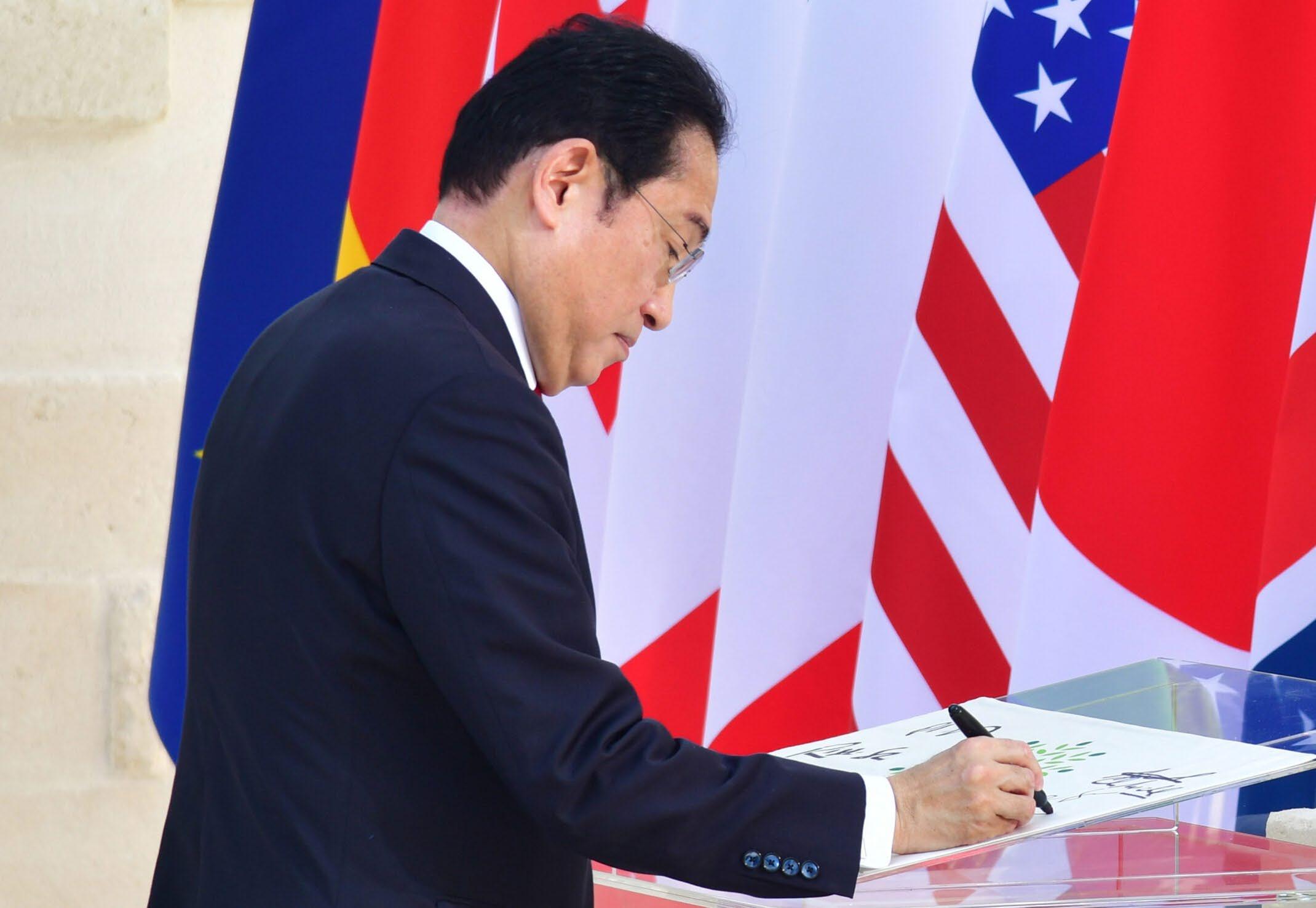
→ the nonbank financial intermediation sector. We also reaffirm our commitment to implement effective regulatory and supervisory frameworks for crypto assets, and welcome initiatives to take forward the G20 Roadmap for Enhancing Cross-border Payments. We reiterate the importance of stepping up global efforts to combat money-laundering, terrorist, and proliferation financing, and support the relevant Financial Action Task Force (FATF)’s initiatives.
We reiterate our strong political commitment to a more stable and fairer international tax system, fit for the 21st century. We are committed to finalizing the work within the OECD/G20 Inclusive Framework, with a view to open for signature the Multilateral Convention on Pillar One by the end of June 2024, and we call for further progress on the implementation of Pillar Two. We welcome progress made on tax transparency and support the effective implementation of the Crypto Asset Reporting Framework by the relevant jurisdictions. We remain committed to fostering international cooperation on tax issues, building on existing achievements, with the broad participation of developing and developed countries. We will continue to work constructively with the Brazilian G20 Presidency to advance international
cooperation. We will work to increase our efforts aimed at progressive and fair taxation of individuals. We acknowledge he discussions at the UN Ad Hoc Committee for a Framework Convention on International Tax Cooperation, emphasizing the importance of consensusbased decisions to support a stable and predictable international tax system, promote inclusive and effective international tax cooperation, prioritizing issues such as enhancing domestic resource mobilization and tax capacity building for developing countries and emerging markets. Mounting debt burdens are constraining the ability of low- and middle-income countries to invest in their futures and achieve the SDGs. We call on all stakeholders to redouble efforts and improve the ability to help low- and middle-income countries that fall into debt distress. This includes finalizing outstanding country cases, making future debt treatment more transparent and timelier, and improving our toolkits to put countries tackling reforms on a more sustainable footing before they fall into crisis. We look forward to the G20 improving the implementation of the Common Framework for debt treatment beyond the Debt Service Suspension Initiative (DSSI) in a predictable, timely, orderly, and coordinated manner, providing more clarity to debtors and
creditors and building on lessons learned. Beyond the Common Framework, debt vulnerabilities in middle-income countries should be addressed by enhancing multilateral coordination. We underline the importance of debt transparency and information sharing in debt restructurings and call on all creditors’ participation in data-sharing exercises. We encourage the Global Sovereign Debt Roundtable (GSDR) to continue its work, fostering a constructive and inclusive dialogue among all parties. We welcome the development of Climate Resilient Debt Clauses (CRDCs) and encourage more creditors to offer CRDCs.
We reiterate our firm commitment to evolve and strengthen MDBs to address the most pressing development and global challenges, and welcome further discussions in line with our G20 commitment to achieve better, bigger, and more effective MDBs. |We welcome the considerable progress that MDBs have already achieved and will continue to support them. We also welcome that the implementation of the G20 MDBs Capital Adequacy Framework (CAF) Review has already secured over USD 200 billion of additional financing for the next ten years and call for further CAF implementation to unlock additional significant financing while safeguarding MDBs excellent credit ratings and preferred creditor status.
We are committed to delivering innovative instruments at the MDBs such as hybrid capital and portfolio guarantees, for which the G7 and other donors have already demonstrated their support. Once approved domestically, current G7 commitments to these instruments will make it possible to further boost World Bank lending by around USD 70 billion over the next ten years. We also commend the African Development Bank (AfDB) for its successful first issuance of hybrid capital to market investors. We call on the MDBs to jointly explore ways to better reflect the value of callable capital in their capital adequacy methodologies, including through further discussions with credit rating agencies.
We reaffirm the importance of continuing to provide significant concessional support to low-income countries. In this regard, we welcome the successful replenishment of the Asian Development Fund (AsDF14) support a successful International Development Association (IDA21) replenishment and commit to work toward a successful
We strongly support the IMF’s commitment towards the most vulnerable, including through our contributions to the Poverty Reduction and Growth Trust (PRGT). We reiterate the call on all IMF members who are able to contribute, especially those that have not yet done so, to consider providing financial support.
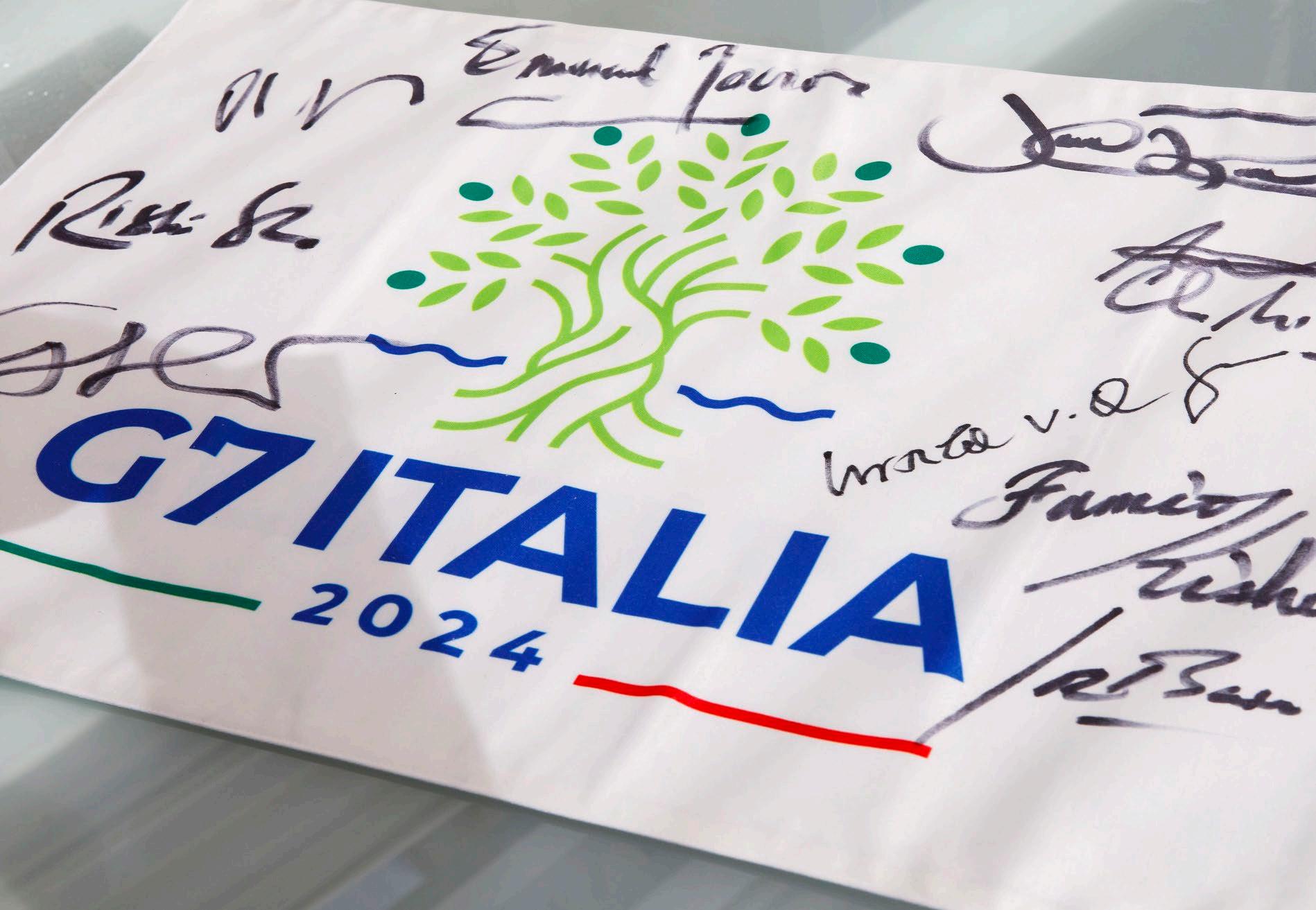
replenishment of the African Development Fund next year (AfDF17). We recognize that contributions from all stakeholders are needed, and we support efforts to broaden the donor base.
We strongly support the IMF’s commitment towards the most vulnerable, including through our contributions to the Poverty Reduction and Growth Trust (PRGT). We reiterate the call on all IMF members who are able to contribute, especially those that have not yet done so, to consider providing financial support. We look forward to a comprehensive and timely review of the PRGT, and we are open to discuss all viable options, including the use of internal resources, to ensure the long term financial self-sustainability of the PRGT and to help meet the growing needs of low-income countries. We welcome the interim review of the IMF’s Resilience and Sustainability Trust (RST) and its focus on resilience to climate change and pandemics.
We support the Alliance for Green Infrastructure in Africa (AGIA), as an innovative financial mechanism of the AfDB in partnership with the African Union, Africa50 and other development partners, aimed at mobilizing blended capital to design and develop a USD 10 billion bankable portfolio of transformative
green infrastructure projects in Africa to accelerate the energy transition, bridge the long-standing infrastructure gap and promote climate resilience. As G7, we will collectively contribute up to USD 150 million in grants, concessional and commercial capital to AGIA and we expect to help leverage around up to USD 3 billion of private sector investment in green infrastructure in Africa.
We look forward to the seventh edition of the OECD World Forum on Wellbeing to be hosted by Italy in Rome on 4-6 November 2024, focusing, inter alia, on policy issues, such as climate change and AI, from a well-being perspective.
Global threats, particularly Russia’s war of aggression against Ukraine, including its continuous attempts to disrupt maritime trade in the Black Sea, and the persistent Houthi attacks on commercial vessels transiting the Red Sea and Gulf of Aden, have highlighted the critical need to address vulnerabilities in global supply chains, ports, and trade flows.
To meet these challenges, we launched the G7 Working Group on Transport Supply Chains, which will enhance the G7’s ability to strengthen the resilience of transport flows and networks.
We remain united in our commitment to the rules-based, free and fair, equitable, and transparent multilateral trading system, with the World Trade Organization (WTO) at its core. Despite the lack of more ambitious outcomes, we recognize the results of the 13th WTO Ministerial Conference (MC13). We welcome the decision to maintain the moratorium on customs duties on electronic transmissions until MC14 and we reiterate our support for a permanent prohibition. We are committed to working towards a prompt conclusion of negotiations of the Joint Statement Initiative on E-Commerce.
We underscore the need to reform the WTO’s monitoring, deliberative, and negotiating functions and remain committed to conducting discussions with a view to having a fully and well-functioning dispute settlement system accessible to all Members by the end of 2024. We call on relevant countries to refrain from claiming special and differential treatment in the WTO, commensurate with their economic weight and role in the global trading system. We also call for an ambitious and comprehensive agreement on global fisheries subsidies. Multilateral cooperation must be underpinned by fair competition, predictability, and sustainability. In this regard, we reaffirm our attachment to transparency, to coordination, and to the →
→ respect of WTO rules in our respective policies. We will step up our efforts towards a global level playing field and reiterate our commitment to keep our economies open and competitive. We will also tackle non-market policies and practices, such as harmful subsidies, including by State Owned Enterprises (SOEs) and forced technology transfers, notably when these policies and practices are used targeting sectors for dominance. We commit to effectively use our trade tools, including new ones, as appropriate, to identify, challenge, and counter these practices, and to promote stronger international rules and norms, together with partners.
Acknowledging the important role of trade in addressing global environmental challenges, we will support WTO deliberations that contribute to achieve COP28 commitments, including plurilateral initiatives such as those facilitating and promoting trade in environmental goods, services and technologies, and fighting plastic pollution.
We acknowledge that our trade policies, as well as public and private investments in the industries of the future, both at home and around the world, will play a major role in achieving common goals of addressing the climate crisis and accelerating the global clean energy transition. We also acknowledge that further cooperation is necessary to fill the investment gap for the clean energy transition to lower the cost of the energy transition worldwide. In this context, we stress that, in driving the clean energy economy of the future, we will cooperate openly and transparently in a coordinated manner, reflecting our joint commitment not to act at each other’s expense.
We will continue to promote inclusive trade recognizing the unique challenges that underrepresented groups, including women and indigenous peoples, face, and their role to ensuring sustainable economic growth.
Building on the progress we made on our strategic coordination since Hiroshima, we reinforce our commitment to promote economic resilience and economic security, in partnership and cooperation within and beyond the G7. In particular, we are building resilient economies and supply
chains, ensuring our toolkits to respond to harmful practices are fit for purpose, and safeguarding critical and emerging technology that could be used to threaten international peace and security.
Recognizing that economic resilience requires de-risking through diversification and reduction of critical dependencies, including those resulting from overcapacity, we will implement the principles on resilient and reliable supply chains, namely transparency, diversification, security, sustainability, trustworthiness and reliability. We will do so by actively engaging with partners and the private sector, within and beyond the G7, while preserving economic dynamism and openness. We encourage the public and private sectors to make coordinated efforts to strengthen the supply chains resilience of strategic goods, in terms of both supply and demand. This will include seeking to collectively identify critical goods, strategic sectors, and supply chains, for future coordination within the G7 on relevant criteria that take into account not only economic factors, but also factors linked to the principles above.
We will champion initiatives to increase participation of a broader range of lowand middle-income countries in Africa and elsewhere in global supply chains, while promoting high standards and creating benefits for local workers and communities everywhere. We will also reduce our partners’ vulnerability. We reaffirm the need to accelerate coordinated initiatives on critical minerals such as the Partnership for Resilient and Inclusive Supply-chain Enhancement (RISE), the Mineral Security Partnership (MSP) and its MSP Forum.
We are more committed than ever to work together to address harmful market distortions and global excess capacity in key sectors resulting from non-market policies and practices, such as pervasive, opaque and harmful industrial subsidies, market distortive practices of SOEs and all forms of forced technology transfers. We acknowledge that such practices not only undermine the free and fair rules-based international economic order, but may also exacerbate strategic dependencies and vulnerabilities, and hinder emerging and developing countries’ sustainable development.
Against this background, we will ensure that our toolkits are fit for purpose and strengthen our coordination.
We strongly support the IMF’s commitment towards the most vulnerable, including through our contributions to the Poverty Reduction and Growth Trust (PRGT). We reiterate the call on all IMF members who are able to contribute, especially those that have not yet done so, to consider providing financial support.
We will pursue joint monitoring to assess how non-market policies and practices are producing harmful overcapacities and other spillover effects. We commit to strengthen the exchange of information, including with like-minded countries, and consult on our respective responses, with a view to greater effectiveness, while avoiding unintended negative effects and considering the security of supply chains. We will intensify diplomatic efforts with those contributing to overcapacity to address the issue at its source, while engaging developing countries and emerging markets to collaborate towards a more equitable global trade and investment environment.
We will work together with partners to ensure that attempts or threats to weaponize economic dependencies will fail and stand ready to take actions, where necessary, against economic coercion. We will increase our collective assessment, preparedness, deterrence, and response, developing new tools, as appropriate, in line with our respective legal systems and international law. We will address potential, emerging, and ongoing cases, including through the G7 Coordination Platform on Economic Coercion, with partners beyond the G7. We will also support, as appropriate, targeted States, economies, and entities and we task
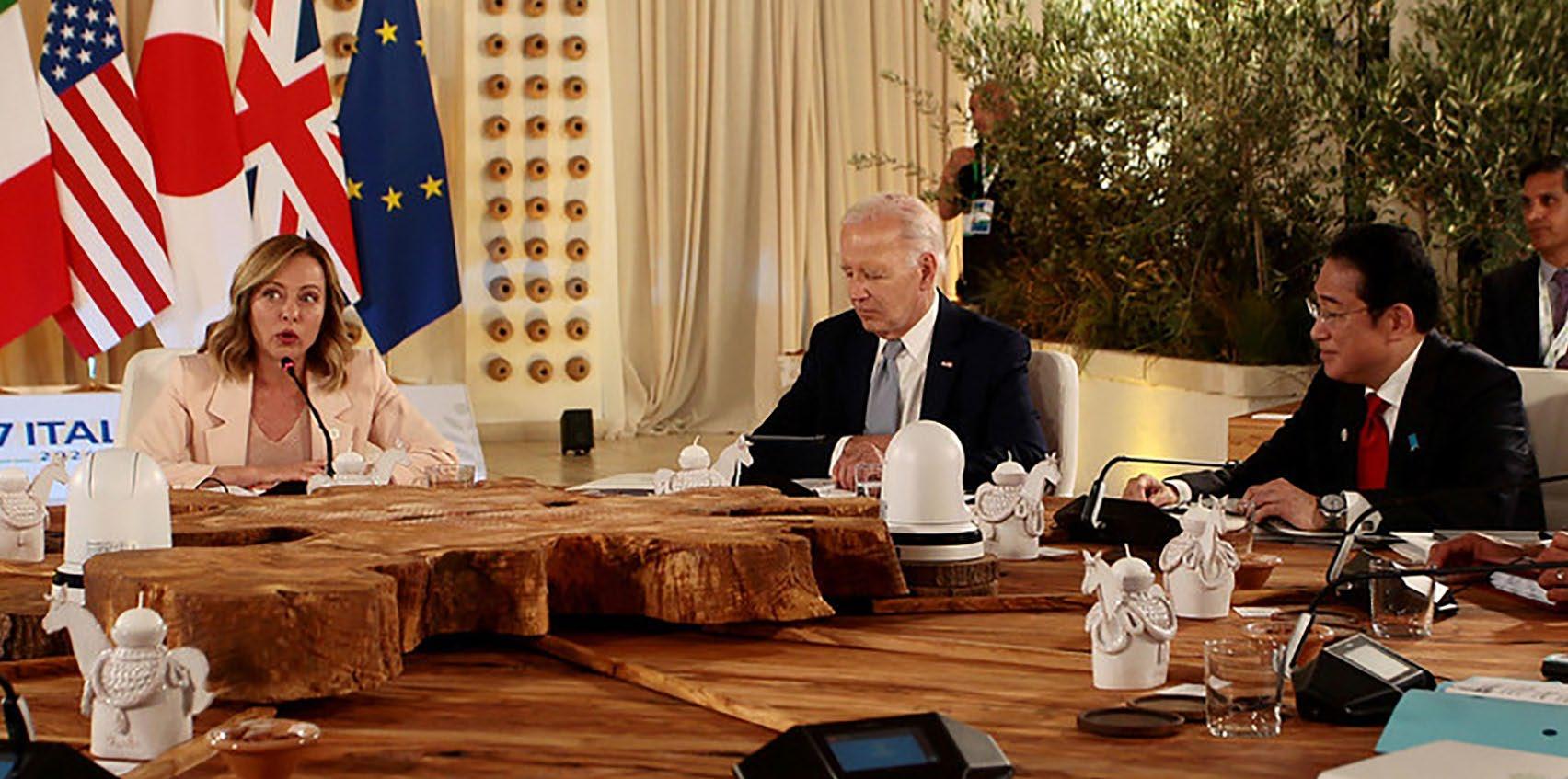
the Platform to actively monitor areas of concern and key threats.
We recognize that evolving technologies present opportunities, but also risks. Recognizing that rapid advances are changing the nature of dual-use technology, we will promote efforts to ensure that gaps in our dual-use technology protection ecosystem cannot be exploited. We will ensure that our tools are sufficiently flexible to keep pace with the rapid development of new technologies, while avoiding undue restrictions on international trade and investment. We have a common interest in preventing a narrow set of technological advances that are assessed to be core to enhancing the military and intelligence capabilities of actors who may use these capabilities to undermine international peace and security, from being fueled by our companies’ capital, expertise and knowledge.
Today we are taking the following steps:
• We commit to safeguarding the global research ecosystem and preserving open research collaboration. We will strengthen existing multilateral research security and integrity efforts and work to prevent covert and forced transfer of intellectual property, data, and sensitive technology.
• We will increase our capacity to monitor
and exchange information on the use of critical minerals as a potential economic coercion threat and will work to prevent risks of supply chain disruptions caused by attempts to weaponize economic dependencies, stemming from monopolization or lack of diversification of existing suppliers.
• We will continue to assess the risks posed by exports of rapidly advancing dual-use technologies, including quantum technologies, and will promote efforts, where necessary and according to our respective legal frameworks, to implement export controls to address risks to international security. We will also work, as appropriate, with our partners to further develop the understanding of how export controls can be implemented quickly and in an assured manner to protect national and international security.
• We will work to ensure the effectiveness four respective foreign investment screenings, recognizing that some foreign investments may present risks to international peace and security, as well as national security, including by providing access to sensitive technologies, data, and expertise.
• We continue to work to make our economic security toolkit fit to address
the risks that our most sensitive technology could be used to threaten international peace and security. In this context, we believe that appropriate measures designed to address risks from outbound investments could be important to complement existing tools of targeted controls on exports and inbound investments. We will continue to engage with and provide clarity to the private sector regarding these common and urgent goals.
• We reaffirm the importance of measures that strengthen data free flow with trust by addressing new risks to international peace and security posed by the interaction of data and advanced technologies, such as AI. We recognize our common interest in ensuring the highest standards for sensitive data protection and security, including genomic data.
• We will work toward ways to safeguard dual-use biotechnology items and equipment, based on evidence of risks associated with bio-convergence.
We welcome the OECD Ministerial Council Meeting (MCM) in May, that facilitated our collaboration on economic resilience and economic security among like-minded countries beyond the G7. →
We will continue promoting a One Health approach, bolstering prevention and health systems, further contributing to achieving Universal Health Coverage (UHC) and promoting equitable access to quality health services and essential Medical Countermeasures (MCMs). We reaffirm our commitment to accelerating progress towards SDG 3, ensuring healthy lives and promoting well-being for all at all ages. Furthermore, we recommit to ending HIV, tuberculosis, and malaria, in particular by supporting the Global Fund to Fight AIDS, Tuberculosis and Malaria, as well as neglected tropical diseases and polio as public health threats by 2030, and countering climate change effects on infectious diseases, which are already seen globally, including in recent cholera and dengue outbreaks.
More broadly, we reaffirm the objectives of the COP28 Declaration on Climate and Health to transform health systems to be climate-resilient, equitable, low-carbon, and sustainable.
In this respect, we recognize the need to strengthen the Global Health Architecture (GHA), with the World Health Organization (WHO) at its core. Strengthening the GHA and Pandemic, Preparedness and Response (PPR) requires public and private financing. We commit to strengthening coordination between Finance and Health tracks for pandemic PPR and to continue exploring innovative mechanisms for response financing including through the work of the G20 Joint Task Force on Finance and Health. We call for continued support to i) the Pandemic Fund, including expanding the donor base and calling for at least USD 2 billion in new pledges and cofinancing that is equal or greater than that; ii) strengthening G7 collaboration to support regional diversification of development and manufacturing MCMs, including regional vaccines manufacturing initiatives, as well as last mile delivery as an essential element to enhance equity; iii) the conclusion of the process and the prompt operationalization of the pandemic preparedness component of the IMF’s Resilience and Sustainability Trust (RST), in cooperation with the World Bank and WHO; and iv) impact investment initiatives such as the Impact Investment Initiative for Global Health. Additionally, we welcome the MCM Surge Financing Initiative that relevant G7
We note the importance of strengthening alignment and collaboration across the global health financing ecosystem in support of country-led priorities towards Universal Health Coverage (UHC) informed by the Conclusions of the Future of Global Health Initiatives Process.
technologies, including the ethical use of AI, to develop new treatments and therapies, improve diagnostic tools and technologies, and address existing and emerging health challenges, while ensuring privacy and promoting interoperability.
We emphasize the importance of lifelong prevention for healthy and active ageing, by promoting healthy lifestyles and science-based diet models based, to the extent possible, on locally grown products, beneficial for both human health and the environment, and tackling health determinants and non-communicable diseases, particularly mental health, and cancer.
DFIs, along with the European Investment Bank and the International Finance Corporation, are developing to build institutional capacity and ensure immediate financing to procure, produce and deliver MCMs in low- and middle-income countries during future pandemics. We welcome the development of new DFIs-led and shared MCM surge financing facilities in 2024. Relevant DFIs and IFIs intend to sign a Memorandum of Understanding this year, in coordination with other global and regional health organizations to make further progress on this initiative. We look forward to the sustainable replenishments of Gavi, as well as the WHO and the Global Fund.
We note the importance of strengthening alignment and collaboration across the global health financing ecosystem in support of country-led priorities towards Universal Health Coverage (UHC) informed by the Conclusions of the Future of Global Health Initiatives Process.
We commit to advancing UHC and investing in resilient health systems, primary healthcare service delivery, and a skilled health workforce – including through the WHO Academy, the G20 Public Health Workforce Laboratorium, and the UHC Knowledge Hub. In this context, we commit to further promote comprehensive sexual and reproductive health and rights (SRHR) for all, and to advance maternal, newborn, child, and adolescent health, especially for those in vulnerable circumstances.
We will continue supporting research efforts and leveraging emerging
We remain deeply concerned with antimicrobial resistance (AMR) and other health challenges exacerbated by the triple planetary crisis of climate change, biodiversity loss and pollution, including in low and middle-income countries. Ahead of the UNGA High-Level Meeting on AMR in September 2024, we will support an ambitious outcome document that champions the needs of low- and middleincome countries and include concrete goals and targets that galvanize action alongside the mandate for an evidence-based panel to continue to drive action on AMR. We will continue promoting equitable access to essential antibiotics and integrated actions to counter AMR within a One Health Framework, by exploring and implementing infection prevention and control measures, as well as exercising stewardship for prudent and appropriate use of antimicrobials, including surveillance of their use and consumption. We will also implement push and pull incentives, support public-private partnerships and explore innovative instruments to accelerate research and development on new antimicrobials, their alternatives, and diagnostics.
We reaffirm our commitment to achieving gender equality and the empowerment of women and girls in all their diversity, through full, equal, and meaningful participation in all spheres of society. We express our strong concern about the rollback of the rights of women, girls, and LGBTQIA+ people around the world, in particular in time of crisis, and we strongly condemn all violations and abuses of their human rights and fundamental freedoms. →


www.globusrelief.org www.inc-world.info
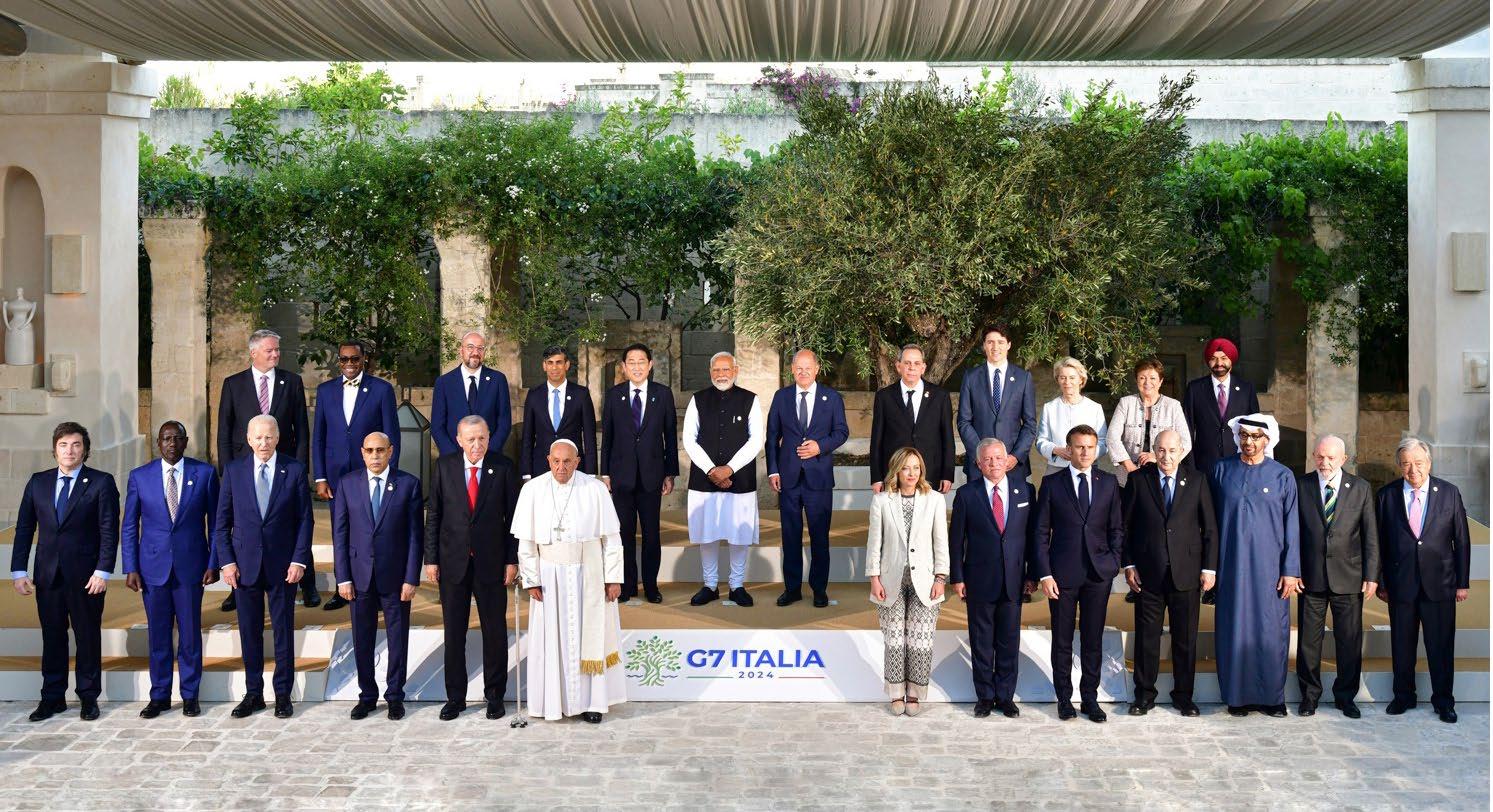
→ We will continue promoting, and protecting their rights in all spheres of society, and consistently mainstreaming gender equality in all policy areas. We will work with global partners to advance gender equality in multilateral fora.
We recommit to preventing and addressing hate and discrimination, and to eliminating sexual and gender-based violence, including that facilitated by technology and trafficking in persons. We will provide comprehensive support and meaningful participation for victims and survivors. We reiterate our commitments in the Hiroshima Leaders’ Communiqué to universal access to adequate, affordable, and quality health services for women, including comprehensive sexual and reproductive health and rights for all.
We continue to promote the full economic empowerment of all women and girls, and equal and meaningful participation and leadership in decision-making processes, including in the STEM sector. We will step up our efforts to address harmful gender norms, stereotypes, and practices, and to eliminate structural barriers and the gender
pay gap, including through enhanced collaboration with the private sector and through supporting the adoption of gender equality certification systems for enterprises. We recognize the need to ensure affordable and quality childcare and long-term care services for all, support parenthood protection, promote work-life balance, and equal sharing of care responsibilities, to promote women’s equal rights and to take a whole-of-society approach to address the demographic challenges faced by ageing societies. Against this background, we reiterate the importance of recognizing, reducing, and redistributing unpaid care work and rewarding paid care work adequately, guaranteeing care workers representation.
We will tackle the unequal gender distribution of care work, which contributes to gender inequalities. To this end, we aim by 2035 to support 200 million more women to join the workforce by investing in efforts to close the global gap in the availability of childcare, including through the World Bank Invest in Childcare Initiative. We will promote applying a gender
transformative, multi-sector approach to our foreign policy, humanitarian aid, and development cooperation, including on climate resilience, food security, education and migration. We commit to advance the Women, Peace, and Security Agenda, including its application to disaster risk reduction and eradicate all forms of gender-based violence, including conflictrelated sexual violence, also by supporting women peacebuilders in conflict settings. We reiterate our commitment to collectively increase G7 ODA for gender equality and we will explore ways to do this at the nexus of climate change and gender, particularly in Africa.
Recognizing that quality education for all girls is the best predictor for future levels of equality, we must also promote access to safe, inclusive, and equitable quality education for all. Noting that 2024 is the African Union’s Year of Education, we will enhance our partnership with African countries on girls’ education, including through redoubling our efforts to meet the G7 Girls Education targets by 2026. Recognizing the success of the 2X
Challenge, we welcome the new commitment by Development and Multilateral Finance Institutions to invest at least USD 20 billion over three years in gender lens investing, encouraging investments at the nexus of gender and climate. We call upon other public and private actors to join the next 2X Challenge, advancing measurable changes and financing directed to women’s empowerment.
We welcome the strengthened Gender Equality Advisory Council (GEAC) and its recommendations. Highlighting the importance of reliable sex and genderdisaggregated data collection and monitoring, we also welcome the updated G7 Dashboard on Gender Gaps.
Inclusion and Disability
We are committed to ensuring that all individuals have equal rights to full and effective participation in social, cultural, educational, economic, and civil and political life. We intend to enhance all persons’ talents and skills to make our communities stronger and more cohesive. We commit to further integrate disability rights across all political agendas, and in doing so, we welcome the first-ever G7 Inclusion and Disability Ministers meeting. We task our Ministers to launch the Solfagnano Charter, where they will articulate actions around universal access and accessibility, independent living, inclusive employment, service availability, emergency prevention and management, among others. We will step up our action for the implementation of the United Nations Convention on the Rights of Persons with Disabilities (UNCRPD). We look forward to the Global Disability Summit to be held in Berlin in 2025.
Disarmament and Non-Proliferation
We remain firmly committed to preventing the proliferation and use of all weapons of mass destruction and their means of delivery.
We are greatly concerned by Russia’s irresponsible nuclear rhetoric and actions, as well as its reported increasing use of chemical agents against Ukrainian forces. We reiterate that any use of chemical, biological, radiological, or nuclear weapons by Russia would be met with severe consequences. We remain concerned about
China’s opaque and accelerating expansion of its nuclear arsenal. We will continue working to address North Korea’s and Iran’s continued advancement of nuclear and ballistic missile programs.
Recalling the G7 Leaders’ Hiroshima Vision on Nuclear Disarmament, we reaffirm our commitment to disarmament and non-proliferation efforts, with the ultimate goal of a world without nuclear weapons with undiminished security for all, achieved through a realistic, pragmatic, and responsible approach. The Treaty on the Non-Proliferation of Nuclear Weapons (NPT) is the cornerstone of the global nuclear non-proliferation regime and the foundation for the pursuit of nuclear disarmament and peaceful uses of nuclear energy. We believe that the overall decline in global nuclear arsenals achieved since the end of the Cold War must continue and not be reversed.
We highlight the need to bring the Comprehensive Nuclear-Test-Ban Treaty (CTBT) into force. In this regard, we call on Russia to continue to adhere to the moratorium on nuclear tests and renew the CTBT ratification. We also call on the Democratic People’s Republic of Korea (DPRK) not to conduct any further nuclear tests, and to sign and ratify the CTBT.
We call for the immediate commencement of long-overdue negotiations within the Conference on Disarmament of a treaty banning the production of fissile material for use in nuclear weapons or other nuclear explosive devices (FMCT) while urging all nuclear weapons States that have not yet done so to declare and maintain voluntary moratoria on the production of such material.
We remain steadfast in our support of the Chemical Weapons Convention (CWC) and the Biological and Toxin Weapons Convention (BTWC), their universalization and full and effective implementation. We underline the importance of addressing biological threats worldwide. We will work to ensure that biological research, development, and innovation are conducted in a safe, secure, responsible, and sustainable manner. We reiterate our commitment to the G7-led Global Partnership Against the Spread of Weapons and Materials of Mass Destruction, a driving force behind global efforts to prevent, detect and respond to the acquisition and use of weapons of mass
We are greatly concerned by Russia’s irresponsible nuclear rhetoric and actions, as well as its reported increasing use of chemical agents against Ukrainian forces. We reiterate that any use of chemical, biological, radiological, or nuclear weapons by Russia would be met with severe consequences. We remain concerned about China’s opaque and accelerating expansion of its nuclear arsenal.
destruction by States and terrorists alike. We are strengthening effective export controls on materials, technology, and research that could be used for military purposes in a way that keeps pace with rapid technological developments and recognizes the central role of multilateral export control regimes as a key non-proliferation instrument and safeguard for international peace and security.
We reiterate our commitment to safe, peaceful, responsible, and sustainable use of outer space, upholding existing legal frameworks including the Outer Space Treaty. We remain committed to fostering international cooperation and transparency, as well as confidence building measures and norms of responsible behavior with the goal of improving space security for all States.
We affirm the obligation of all States Parties to fully comply with the Outer Space Treaty, including not to place in orbit around the Earth any objects carrying nuclear weapons or any other kinds of weapons of mass destruction, install such weapons on celestial bodies, or station such weapons in outer space in any other manner. →
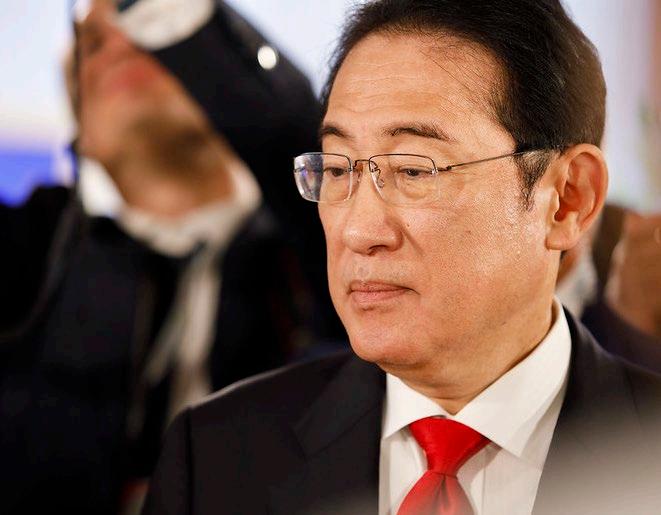
Terrorism, Violent Extremism and Transnational
We condemn and counter terrorism and violent extremism in all their forms. We are determined to protect our societies’ freedom and security, while upholding the rule of law and respecting human rights. We will continue to combat the financing of terrorism and terrorism propaganda, particularly the dissemination of terrorist content online. We will also promote information sharing, international cooperation, and capacity building, including in border management, to investigate and prosecute such crimes.
We reiterate our strong commitment to fighting transnational organized crime, breaking its business models, and dismantling its networks. Drug trafficking, smuggling of migrants, trafficking in persons and fraud are major sources of income for organized crime. We stand ready to work with other governments to address these transnational challenges, as well as crimes that affect the environment and against cultural heritage. Recalling our statement on Synthetic Drug Threats, including the significant health implications, we support
the Global Coalition to Address Synthetic Drug Threats.
We also continue our unwavering commitment to tackling child sexual exploitation and abuse in all its forms to keep children safe online and in our communities around the world. It is crucial that all sectors, including the tech sector, step up and play their part in prioritizing child safety and working to combat this horrific crime.
In a year during which millions worldwide choose their leaders and representatives, we reaffirm our commitment to safeguard democratic values and human rights. With the rapid evolution of emerging technology, we are more concerned than ever about Foreign Information Manipulation and Interference (FIMI) in our democratic institutions and processes, and how attempted interference campaigns, malicious cyber activities, and transnational repression collectively undermine sovereignty and democratic values.
We pledge to strengthen our coordinated efforts to better prevent, detect, and respond to FIMI threats through human rights-
respecting practices and by supporting freedom of expression and free, independent, and pluralistic media. We ask our relevant Ministers to bolster the G7 Rapid Response Mechanism by creating by the end of the year a collective response framework to counter foreign threats to democracies, including publicly exposing foreign operations of information manipulation. We also call on tech companies, in particular social media platforms, to intensify their efforts to prevent and counter FIMI campaigns and the potential abuse of AI for this purpose and work towards higher standards of transparency and accountability on these issues.
We will continue our cooperation with governments and non-governmental partners to work towards the promotion of fact-based, quality, and trustworthy information and will support relevant international initiatives, in particular in the UN and OECD.
Corruption and related illicit finance drain public resources, fuel organized crime, and undermine democratic governance and progress across the SDGs. We endorse the G7 High-Level Principles on AntiCorruption and commit to promoting technical assistance and capacity building to address existing gaps. We reaffirm the fundamental role that the United Nations Convention Against Corruption (UNCAC) plays in the global fight against corruption and commit to further enhance the effectiveness of its Implementation Review Mechanism. We underscore the importance of denying corrupt actors access to our territories and financial systems.
We appreciate the exchanges with, and the inputs from, the G7 Engagement Groups. We are furthermore grateful for the valuable contributions from the Heads of the AfDB, the IMF, the OECD, the UN, and the WB, who joined us in Apulia.
We look forward to the Paris Olympic and Paralympic Games, and urge all countries to observe the Olympic Truce individually and collectively, as prescribed by the United Nations General Assembly Resolution “Building a peaceful and better world through sports and the Olympic ideal” adopted on 15 November 2023. ■






























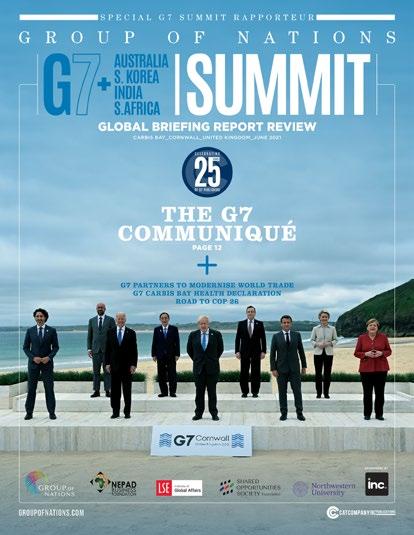








































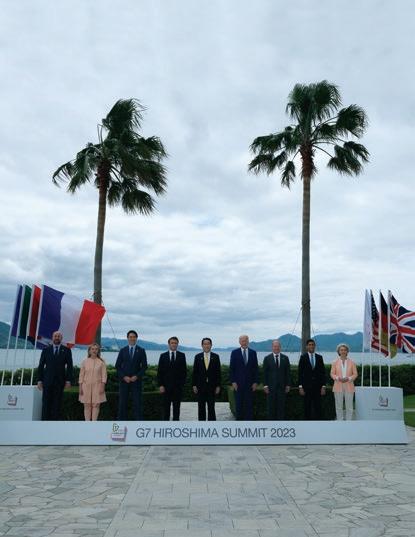




As the Ethiopian ambassador to the United States, I am enormously proud of the epic battle that Ethiopia is waging against a warming planet. As we get back to the hard work of combatting climate change in the wake of COP 24, I want to remind my colleagues across the globe that according to climate scientists, Ethiopia is one of the 10 most vulnerable countries in the world to climate change; and yet we as a nation have contributed very little to the industrial emissions that are now warming our planet at an alarming rate. Desertification, which causes Ethiopia to lose more than 2 billion metric tons of arable soil and 230,000 acres of forest and woodland a year; locust swarms, that consume critically needed crops that could feed many more of our people; and malaria outbreaks, that kill thousands of our brothers, sisters, and children are all made immeasurably worse by global warming.
And yet, my government refuses to play the blame game, nor do we wait for the aid we desperately need to fight this battle. This year, Ethiopia became the first country in the world to ban gas and diesel-powered cars, in favor of electric vehicles. And we are rapidly expanding sources of renewable energy. We can now generate more than 60,000 megawatts of electricity a year from hydroelectric, wind, solar and geothermal projects.
In addition, we are implementing massive new forestry and agroforestry projects to

AMBASSADOR, ETHiOPIA
sequester the world’s carbon, feed our people more efficiently, and reduce the impacts of climate change. In 2019, Ethiopia planted 353 million trees in a single day, as part of the Green Legacy Project, setting what is believed to be a new world record. The total number of seedlings planted as part of Prime Minister Abiy Ahmed’s Green Legacy Project is expected to surpass 33 billion trees before the end of 2024.
Ethiopia has also signed a $40 million dollar agreement with the World Bank to help communities and local governments reduce carbon emissions and increase carbon sequestration through forest preservation and other environmentally
friendly land use techniques. Projects unded by this agreement are expected to reduce 4 million metric tons of carbon dioxide emissions by 2030. And we expect to generate an additional $60 million dollars in the next six years from private sector carbon credit projects as well.
These projects help us feed our people and generate additional export revenue. Over the last six years, agroforestry and sustainable land use projects organized by the Oromia Coffee Producers Union have generated more than a million euros through the sale of carbon credits, meaning that every cup of delicious, hot coffee – from the birthplace of coffee, Ethiopia – is not just good for the soul and the tastebuds. It’s good for the planet.
Ethiopia has also signed a $40 million dollar agreement with the World Bank to help communities and local governments reduce carbon emissions and increase carbon sequestration through forest preservation and other environmentally friendly land use techniques.
But Ethiopia should not have to go it alone. Each year, pollution created by the world’s industrial powers literally consumes the land we use to feed our people, by exacerbating the climate-driven effects of desertification, impacting irrigated croplands whose soils are often degraded by the accumulation of salts; and rain-fed croplands, which suffer from increasingly erratic rainfall and wind-driven soil erosion. Ethiopia is doing the work. I call on the global family of nations to roll up their sleeves and help us before it is too late for those of us who reside in the countries that suffer most from climate change, and then eventually for the rest of the world ■
Today’s leaders and organizations are grappling with greater divisions and contradictions that present barriers to change and lasting impact. By bringing diverse stakeholders and ideas together, inspiring confidence, and working beyond traditional boundaries, APCO builds the un/common ground upon which progress is made.
What are you grappling with? Contact us and see how we can help your team at: apcoworldwide.com
The inception of the Group of Seven (G7) summits is usually viewed as a French initiative, the inspiration of President Valery Giscard D’Estaing, rooted in his experience of international financial diplomacy in the turbulent early 1970s. In April 1973 the finance ministers of the US, Britain, France and Germany quietly met for a discussion in the White House Library, and so began a series of very informal and private sessions usually held without papers or retinues of officials. With deliberate blandness and opacity its members dubbed this institution the “Library Group”. (The Japanese later joined and it eventually became known as the G5.)
Giscard was elected French President in May 1974. The mid-70s were perhaps the zenith of French post-war influence and Giscard’s diplomacy in the early years of his seven year Presidency (1974-81) was confident and effective: certainly he was the first publicly to float the idea of a librarystyle summit between heads of government, raising it during a conversation with
American journalists in July 1975 when he argued that currency stability was essential to economic recovery in the West. The French were campaigning to persuade the Americans to return to a fixed parity exchange rate system of the kind that had existed before 1971 under the Bretton Woods Agreement, with central banks committed to intervene in defence of
the rate. (Of course, such a system would not have been based on the dollar, as Bretton Woods had been, if they had had their way.) Strong domestic forces were in play, unemployment in France approaching one million and most of the other participating countries experiencing economic difficulties, Britain very much to the fore.
The group was formed in the wake of the 1973 oil crisis and the subsequent global economic recession. he founding members were the United States, the United Kingdom, West Germany (now Germany), Japan, France, Italy, and Canada.
In several respects the role of Giscard and the “Library Group” in influencing modern summitry has perhaps been overstated. Heads of government could not hope for the degree of privacy available to finance ministers and as a result the G7 has never functioned remotely like the G5. Further, the British records show that the West German Chancellor, Helmut Schmidt, and US President, Gerald Ford, also played their part in forming the G7. Following discussions at a four power lunch during the Helsinki Conference on 31 July, Schmidt drafted a paper for Henry Kissinger (a copy of which was handed to the British) laying out a programme of work for such a meeting, making international reflation the core objective. Ford had already

endorsed the proposal after discussions with the German Chancellor a few days before. The French attachment to fixed parities was not a popular one and the British, Germans and Americans converged on the view that the summit should only take place on a wider agenda. Finally, most important of all, the files suggest that no one intended or expected Rambouillet to be an annual event, the first in a series still running. In fact both Giscard and Schmidt seem to have been far from keen that the summit become the international institution it now is.
Some familiar features of later summits were there from the first, however, such as the careful advance preparation of summit conclusions by emissaries close to heads of government, not all of them officials (later called the “sherpas”, here known as the Carlton Group from the name of the New York hotel at which they first met). Their role was to ensure that something of substance would be seen to emerge from the summit, because a meeting at head of government level could not take place without concrete results to show, on pain of collective loss of face. And one encounters at Rambouillet also one of the G7’s enduring characteristics, an insoluble conflict between a desire to keep numbers small and the determination of states and individuals to be invited to a prestigious gathering. Giscard aspired to create the elusive country house atmosphere at the small Château de Rambouillet 30 miles south west of Paris, proposing to invite the heads of government of five states: the US, Japan, Germany, France and Britain. He immediately met with irresistible pressure from Italy to add its name, and of course foreign and finance ministers clamoured for a place too, with success. He hoped to keep officials at bay, but “the mandarins were compressed rather than suppressed” (as the British Ambassador put it). The host’s honour was saved, though: he arranged to billet all but the heads of government at an inconvenient distance from the Château and loftily excluded Canada altogether.
The French did not achieve their largest objective at the summit, having to settle for a declaration of common interest in exchange rate stability. But this was reckoned a significant diplomatic achievement all the same, and a notable step towards the more constructive French approach to the US which Giscard advocated.
Economic weakness left the British in a
poor position at the summit: the prospect of future crisis left UK Ministers playing a defensive hand designed to keep open the option of introducing selective import controls. Indeed, an on the record statement to that effect was made unilaterally by the Prime Minister to British journalists immediately following the summit, and the line was greeted with foreboding by the French and Germans. But the records do not suggest perhaps that participants saw much risk, in the short-term at least, of a return to full-scale protectionism.
Each participant had been allowed to table one item for the agenda. Session Four was an informal one, without agenda or notetakers; the British memorandum is based on personal notes by Prime Minister Harold Wilson.
One of the conclusions of Rambouillet had been that such summits should not be ‘institutionalised’. Repetition was not ruled out, but it was a surprise, all the same, when less than six months later the Americans proposed a second meeting, Kissinger quietly raising it with the British Foreign Secretary on 24 April, and suggesting a very early date (late June). European leaders immediately suspected that President Ford was playing to his domestic audience in presidential election year, noting that Ronald Reagan was gaining ground in the Republican primaries. Responses were cool, in London almost as much as in Paris or Bonn, and the initiative was seen as clumsy.
The US quickly forced the issue, Ford sending messages to other leaders commending the idea and asking them to see a personal emissary, George Shultz (who had been the US Sherpa for Rambouillet). Meeting Jim Callaghan, the newlyappointed British Prime Minister, on 10 May, Shultz stressed US worries about the situation in Italy, where the communist PCI was widely expected to enter government following elections on 20 June. Such an approach was well-chosen, because we were already discussing a programme of official and non-official warnings to Italy in the hope of forestalling this outcome, and the French and Germans certainly shared our concern. Told that Ford envisaged a venue in the US, Callaghan made reference to November’s election and commented that he would make the trip there, “but
without enthusiasm”. Puerto Rico eventually emerged as the destination because it fell within US jurisdiction, but as a self-governing territory had no say in the choice of president.
Part of the hesitation on the British side resulted from the angry reaction of smaller countries to their exclusion from Rambouillet: summitry of this kind had a diplomatic price, particularly within the European Community where, for example, we were relying on the Belgians to sponsor a compromise proposal on direct elections to the European Parliament. The FCO wanted us to urge the Americans to invite the President of the European Council - as luck would have it, from the smallest country of all, Luxembourg - but No.10 would have none of it. The Americans told us in fact that they would invite a Community representative if all member states demanded it, perhaps calculating that the stipulation was unlikely to be met. In the end, after much discussion, the Community went unrepresented, largely due to French objections. At least it was clear that Canada would attend this time, the Americans insisting that they had only agreed to attend Rambouillet on the condition that it was included in future.
Callaghan began to warm to the summit proposal after several long conversations with the West German Chancellor, Helmut Schmidt, an increasingly trusted political ally and friend who had his own election to face and hoped for a summit dividend. The Italian factor faded for a while as the polls gave comfort that the PCI was falling back, but that may actually have eased the way, because it was proving difficult to agree how the summit should seek to influence the internal politics of a participating state. By 21 May, at a meeting of foreign ministers in Norway, the deal was done, the US, Britain, France and Germany agreeing in principle to a second Rambouillet. Canada, Italy and Japan were to be invited afterwards, effectively defining them as second tier members. News that a summit was to be held leaked (in Washington) on 20 May, before the wording of an official announcement had even been discussed. When the Sherpas met in mid-June to consider summit procedure and a possible communiqué it became apparent that the Americans had in mind a very short meeting, with only two working sessions, the US, UK, France and Germany secretly →
→ assembling at some point to consider the Italian situation (a difficult manoeuvre). Reviewing summit preparations together in London a ten days later, in irony-laden exchange, Giscard and Callaghan agreed “that the only valuable meetings were the types of meeting which could never take place, namely those between the four of us”. Giscard was keen that the final communiqué should not leave the impression that these summits were to become regular features of the international scene.
In the event there were three sessions, and the four-power discussion of the Italian situation - disguised as a “quadripartite meeting” on Berlin - was a secret to none of the summit participants, the Italians included. (In fact the PCI had failed to make the feared breakthrough in the recent election, though a senior Italian official sought out an irritated British PM at his summit villa to offer the view that there would probably be a Communist Government “within about five years under a Western umbrella”.) The opening session records the important point that the economic background to Puerto Rico was one of robust recovery, with G7 members expected to exceed 4.25 per cent growth that year, an additional reason why the summit seemed of less moment than Rambouillet and its successors.
Callaghan seems to have had only one bilateral at Puerto Rico, a sensitive meeting with President Ford on the first morning of the summit. The Prime Minister mounted a defence of British economic policy and asked for “encouragement, even a little praise, for what we have achieved” so as to strengthen his hand domestically. These remarks were evidently aimed at Bill Simon, US Treasury Secretary, who had been publicly critical of British performance.
President Ford’s defeat by Jimmy Carter in the November 1976 US election helped to trigger the next summit, European leaders being keen to draw the popular new incumbent across the Atlantic and sun themselves in a little reflective glory, as well as establish good working relations. Giscard was the first publicly to make the suggestion, musing that London or “the English countryside” would be the right venue. Arguably the renewal of French
There had already been repeated Japanese bids for the honour of hosting, but British ministers joyfully batted them aside with the aid of this helpful intervention from Paris.
feature on the main summit agenda, a proposal refuting the notion that this was a purely “Economic Summit” - as the press had begun to call it - and putting the British on the spot. We favoured the US position and in the end nuclear proliferation was discussed during the summit, at some length, generating negative headlines when an agreement to differ was the only result.
Callaghan sang Carter’s praises to Schmidt at every opportunity, but their relationship began badly and then got worse.
commitment was a significant step towards institutionalising the summit. There had already been repeated Japanese bids for the honour of hosting, but British ministers joyfully batted them aside with the aid of this helpful intervention from Paris. It helped too that Britain’s six month presidency of the European Council began in January 1977, allowing Callaghan to press his claims for an early visit to Washington and giving him a better chance of finessing the difficult issue of Community representation at the summit. An upcoming NATO meeting in London could also be dovetailed with it. Messages were sent to President-elect Carter, who - while unable to offer or accept formal invitations till he assumed office - gave a cautiously positive response in a phone conversation with the PM a week before the inauguration. The deal was firmed up during a follow-up visit to Europe by the new Vice-President, Walter Mondale.
Gratifyingly from the British point of view it also became apparent that the Americans were keen to hold another unpublicised quadripartite meeting in the fringes, focussing on the big political and defence questions, an idea also popular with the French and Germans. These semi-secret events - the first being Helsinki in 1975looked set to become a fixture alongside the increasingly-publicised seven state summits, even achieving a certain priority. The first meeting of Sherpas, in Washington on 11 March, was confined to the four powers.
But after this charmed start, Callaghan’s luck ran out. The US irritated the Germans and French by pressing that human rights, arms sales and nuclear non-proliferation
And whether the European Community should be represented or not - and precisely how (if it was) - absorbed a remarkable amount of time and energy, bringing the PM into uncomfortable contact with the new President of the European Commission, his former close colleague, political rival and bête noire, Roy Jenkins. Our strategy was to invite the Community to reach a consensus on what it wanted in the way of representation, none being likely to emerge. The Americans told Callaghan they had no problem with the Community being there - pointedly President Carter gave Jenkins an hour of his time in Washington on 18 April - but the French were deeply resistant, and Callaghan himself privately told officials he hoped he could “get away” with leaving the Community out.
Diplomatic bloodshed followed, culminating in what the PM called “a long and ridiculous argument” over dinner at the Rome European Council on 25 March in which almost everyone lost their temper. The final, unhappy compromise left Jenkins in attendance, but not as a full or equal participant.
Partly as a result of these side-issues, high political consideration of what might actually be done at the summit was distinctly lacking till April, by which time it was really too late to hope for any substantial agreement. Schmidt gave the British and US a lengthy German “non-paper” in early March, but we read this less as a manifesto than an attempt to deflect pressure on Germany to reflate its economy, “a little defensive but also self-righteous. The Germans have done their bit” (in the words of a senior British official). Callaghan had publicly commented that the world economy faced the deepest recession for 40 years, but in truth what could the summiteers do? Looking back at it all the following year,

chatting to Carter, he admitted that they had come up with targets and promises amounting to not very much. As late as 2 May, less than a week before the leaders arrived, Bernard Donoughue’s diary records senior ministers asking themselves what message they hoped the summit would send? “Keynesianism has failed”, suggested the Chancellor of the Exchequer.
The summit began a little uneasily with an informal dinner at No.10 on Friday 6 May, an event marred by Giscard’s refusal to attend - in protest at the presence of Jenkins - and Jenkins’s objection to the seating plan, which left him off the top table (Donoughue, a political admirer and fellow-diner, commented of the latter: “His appearance of continually injured dignity is not good for him”.) But things improved, and in one respect perhaps there was a solid success. No.10 provided the kind of intimate atmosphere always desired for these occasions (though rarely achieved), a chance for powerful people to talk directly between themselves and take each other’s measure. On the Saturday morning the leaders were locked in the State Dining Room, their delegations waiting by, uncalled, the building remarkably quiet. At lunch the leaders
strolled across St James’s Park to Lancaster House (generating some good photos), an initiative repeated on the Sunday when they walked from No.10 to the Banqueting House for the closing press conference, gestures of informality progressively harder to contrive in later years. The quadripartite meeting was held on the Monday in the even more intimate surroundings of the White Room at No.10, no officials being present at all.
The fourth summit in the series was held in Bonn. The international background was of deepening economic difficulty, commonly attributed to “global imbalances” and a falling dollar (although this was a slowing international economy, not a recessionary one, with US growth still expected to be 4 per cent and Japanese around 5). The summit location was helpful from the British and US point of view because both wanted Germany to reflate and holding the event on home soil predisposed the Germans to be helpful, so as to be able to claim a diplomatic success. The huge and growing Japanese trade surplus put them a close
second in the firing line, and they received some rough handling along the way, but leverage proved limited, in part because Tokyo was not the venue . It was no accident that the G7 went east the following year.
The British played a part in setting up the essential deal - a German fiscal boost of up to 1 per cent, in return for US moves to discourage energy consumption by raising domestic oil prices to world levels by 1980but economic weakness made us marginal to the outcome, beyond establishing modalities and easing the chronically strained CarterSchmidt relationship, Prime Minister Callaghan standing well with both men. In the end the chief policy role assigned us was the limited one of disavowing protectionism, an area where the US and Germans thought us backsliders, in company with the French. This was a somewhat humiliating perception, but not entirely misplaced. In fact at that very moment the British Foreign Secretary of the day, David Owen, was energetically prompting his officials to prepare a full-scale protectionist programme for Europe, in addition to measures already taken. (He did not get far: the PM was unimpressed.) →

→ The Callaghan government had only a year to run before it was compelled to face the electorate (with October a likely date for the poll), so had a strong interest in brokering reflation. Of course, the US and the German Governments were directly in touch as well. A paper in the Carter Library (available on this site) show that the outlines of a deal had been traced, unknown to London, at a meeting between the US sherpa, Henry Owen, and Helmut Schmidt in early April.
But while a deal was in the offing on reflation and energy, British ideas on a new regime for exchange rates - hinting at a desire to return to a more managed, international regime (or so at least the Americans thought), with an enhanced role for SDRs - found no takers in the US or Europe. The US Administration was strongly committed to a floating rate, and it cannot have helped when Callaghan rather tactlessly observed to Carter (in their meeting of 23 March) that the dollar in the seventies resembled sterling a decade before. Germany and France, on the other hand, were looking in another direction entirely, and making their own plans. At a private dinner in the Federal Chancellery on 12 March Schmidt told Callaghan that he was pursuing “an exotic idea”, which proved to be the origin of the European Monetary
System (the EMS). Callaghan was asked not to mention it to his Chancellor of the Exchequer, Denis Healey, so had to craft a response behind his colleague’s back, with the help of two key officials in the Treasury and the Bank of England. (Within weeks, of course, the circle in the know was spreading fast and Callaghan ordered Healey be told.) This early approach, and subsequent papers, suggest that the Germans and the French initially made some efforts to secure British participation. At one point the French seemed especially keen to bring in sterling, to dilute the dominance of the deutschmark in the new bloc.
They had little or no chance of success. Callaghan had been Chancellor during the British devaluation of 1967, and his career was lucky to survive the débâcle. It is no surprise to find that he determinedly rejected participation in the EMS for fear that it might lock us into a deflationary exchange rate. He had broader reasons as well: he was in his way almost as strong an Atlanticist as MT, and briefed his Treasury contact that “there was a belief that the US would become more protectionist” and that “the scheme reflected a turning away from the dollar and from US financial policy”. In a long phone call to Carter on 17 April he shared with the President these deeper fears, and even warned delicately of Schmidt’s disaffection with the US.
There was in fact some British support for EMS membership, led by the Bank of England with the Treasury in its slipstream. Callaghan sharply slapped this down, congratulating himself a fortnight before the summit for having “torpedoed that load of nonsense” (according to the diary of his policy adviser, Bernard Donoughue, 3 July 1978).
One procedural problem weighed on the British and illustrates a general problem about summitry of this kind. Participating states needed to act in concert to get maximum impact from whatever they agreed. Yet significant economic measures on the part of the G7 governments would take months to concert, and it was clear that the governments would need to show signs of activity in the interim because a policy of “waiting for Bonn” would leave everyone vulnerable to domestic criticism. Accordingly British officials hit on the formula that measures announced in the run-up to the summit should be presented
as actions with a common purpose, part of a framework leading up to the summit. This manoeuvre, so characteristic of Whitehall, was agreed at the summit preparation group in a 12 hour meeting at the end of March. It was, perhaps, the best face that could be put upon things, and from the British point of view helped to hide the weakness of our economic position by appearing to place us in the position of agenda setters, British officials drafting the “five points” on which the framework was based.
Little drama attended the four summit plenaries themselves: the deals had already been made. The Germans did their bit, in a very resigned style. At a private meeting the evening before the summit opened Schmidt told Callaghan that he didn’t expect the stimulus to increase growth in Germany, but promised not to say so in public. The press response was generally sceptical, as it had been following the London G7 the year before. On the monetary front the Council at Bremen overshadowed the Summit in Bonn, and had much the greater results over time. Arguably the grand US-German bargain proved of little benefit to the world economy, and a positive liability to both parties: within the US Carter’s energy policy became a symbol of failure, even of defeatism, made much of by Ronald Reagan during the presidential election of 1980, while the German reflation achieved nothing in the face of the steep oil price rise of 1979-80 and the sharp tightening of US monetary policy under Paul Volcker, casting a long shadow over future policy in the Federal Republic.
There was no quadripartite meeting of heads of government in Bonn: the French wanted one, but the Americans were opposed. Instead their foreign ministers met in the margins of the G7, laying the groundwork for a separate summit of the four heads of government on the French Caribbean island of Guadeloupe in January 1979, the proceedings conducted in English without interpreters.
As recently as November 2008 (at an event celebrating Helmut Schmidt’s 90th birthday) Giscard has spoken of the great

significance of this meeting, symbolising for him the return of post-war Germany to equal international status. Documents of the time show he consistently favoured the four over the seven, but bringing the quadripartite meeting out of the shadows of the G7 proved a dead-end in terms of summitry. It prompted understandable suspicion among the excluded that decisions affecting them were being made in their absence, and though it was denied that the four sought to constitute themselves a ‘directorate’, it is striking to find that it was at Guadeloupe that the decision was made to refuse Australia’s bid to attend the 1979 Tokyo Summit. And returning afterwards to a UK in the grip of devastating strikes and ugly weather, the lightly-tanned British Prime Minister misjudged the mood and left himself open to the damaging headline in the Sun: “Crisis? What Crisis?”, a fin de siècle moment in British politics. His successor, MT, proved less clubbable, and was certainly not well-placed to soothe Schmidt-Carter tensions. In fact Schmidt had formed a deep antipathy towards her well before she became PM, characterising her in unprintable terms to the Americans in November 1976 (his words thoughtfully recorded by the State Department): “she is a bitch, she is tough, she lacks scope and she cannot lead”. →
1975: France (Château de Rambouillet) - November 15-17
1976: United States (San Juan, Puerto Rico) - June 27-28
1977: United Kingdom (London) - May 7-8
1978: West Germany (Bonn) - July 16-17
1979: Japan (Tokyo) - June 28-29
1980: Italy (Venice) - June 22-23
1981: Canada (Montebello, Quebec) - July 20-21
1982: France (Versailles) - June 4-6
1983: United States (Williamsburg, Virginia) - May 28-30
1984: United Kingdom (London) - June 7-9
1985: West Germany (Bonn) - May 2-4
1986: Japan (Tokyo) - May 4-6
1987: Italy (Venice) - June 8-10
1988: Canada (Toronto) - June 19-21
1989: France (Paris) - July 14-16
1990: United States (Houston, Texas) - July 9-11
1991: United Kingdom (London) - July 15-17
1992: Germany (Munich) - July 6-8
1993: Japan (Tokyo) - July 7-9
1994: Italy (Naples) - July 8-10
1995: Canada (Halifax, Nova Scotia) - June 15-17
1996: France (Lyon) - June 27-29
1997: United States (Denver, Colorado) - June 20-22
1998: United Kingdom (Birmingham) - May 15-17
1999: Germany (Cologne) - June 18-20
2000: Japan (Okinawa) - July 21-23
2001: Italy (Genoa) - July 20-22
2002: Canada (Kananaskis, Alberta) - June 26-27
2003: France (Évian-les-Bains) - June 1-3
2004: United States (Sea Island, Georgia) - June 8-10
2005: United Kingdom (Gleneagles) - July 6-8
2006: Russia (St. Petersburg) - July 15-17 (as G8)
2007: Germany (Heiligendamm) - June 6-8
2008: Japan (Tōyako, Hokkaido) - July 7-9
2009: Italy (L’Aquila) - July 8-10
2010: Canada (Huntsville, Ontario) - June 25-26
2011: France (Deauville) - May 26-27
2012: United States (Camp David, Maryland) - May 18-19
2013: United Kingdom (Lough Erne, Northern Ireland) - June 17-18
2014: Belgium (Brussels) - June 4-5 (extraordinary meeting following Russia’s exclusion)
2015: Germany (Schloss Elmau, Bavaria) - June 7-8
2016: Japan (Shima, Mie Prefecture) - May 26-27
2017: Italy (Taormina, Sicily) - May 26-27
2018: Canada (La Malbaie, Quebec) - June 8-9
2019: France (Biarritz) - August 24-26
2020: United States - Cancelled due to COVID-19 pandemic (was planned for Camp David)
2021: United Kingdom (Cornwall) - June 11-13
2022: Germany (Schloss Elmau, Bavaria) - June 26-28
2023: Japan (Hiroshima) - May 19-21
2024: Italy ( Apulia ) June 13th-15th
The Group of Seven (G7) is an intergovernmental organization of seven of the world’s largest advanced economies. The group was formed in the wake of the 1973 oil crisis and the subsequent global economic recession. The founding members were the United States, the United Kingdom, West Germany (now Germany), Japan, France, Italy, and Canada. The initial meeting took place in 1975 at the Château de Rambouillet in France, hosted by French President Valéry Giscard d’Estaing. This summit was aimed at addressing economic issues and coordinating economic policy among the major industrial democracies.
The first meeting was attended by the leaders of six nations, without Canada. However, in 1976, Canada was invited to join, making it the G7. The summits provided a platform for the leaders to discuss and coordinate responses to global economic challenges, such as inflation, unemployment, and the need for energy security. These meetings were informal, fostering open discussions and collaboration.
Throughout the 1980s and 1990s, the G7 summits expanded their agenda to include not just economic issues but also political and security matters. This shift reflected the changing global landscape, where economic power and political influence were increasingly interconnected. Issues such as arms control, the environment, and international development became regular topics of discussion.
In 1997, Russia was invited to join the group, leading to the formation of the G8. This inclusion was a recognition of Russia’s post-Cold War transition towards a market economy and its growing importance in global affairs. However, following Russia’s annexation of Crimea in 2014, the group suspended Russia’s membership, reverting back to the G7 format.

There had already been repeated Japanese bids for the honour of hosting, but British ministers joyfully batted them aside with the aid of this helpful intervention from Paris.
In recent years, the G7 has continued to adapt to new global challenges. The summits have addressed a wide range of issues, including global health, climate change, digital transformation, and international trade. The G7 has also focused on promoting democratic values and human rights, often taking a unified stance on geopolitical issues.
The G7 summits are held annually, with the host country rotating among the member states. The host country sets the agenda, and the summit typically culminates in a communiqué outlining the group’s collective commitments and policy directions. The informal nature of the
meetings allows for candid discussions among the leaders, fostering a spirit of cooperation and mutual understanding.
In addition to the annual summits, G7 countries hold various ministerial meetings throughout the year. These gatherings bring together ministers responsible for different portfolios, such as finance, foreign affairs, health, and the environment. These meetings aim to advance specific policy areas and prepare the groundwork for the leaders’ summit.
The G7 has played a significant role in shaping global economic policies and addressing international crises. It has provided a forum for coordination among the world’s leading economies, contributing to stability and growth. Notable achievements include coordinated actions during the global financial crisis of 2008-2009 and commitments to climate change mitigation.
Despite its influence, the G7 has faced criticism for its limited membership and perceived exclusivity. Critics argue that the group does not adequately represent emerging economies and developing countries, limiting its legitimacy and effectiveness in addressing global issues. There have been calls for reform or expansion to make the group more inclusive and representative of the broader international community.
The G7 summit remains a key forum for international dialogue and cooperation among the world’s major industrialized democracies. Its history reflects the evolving nature of global challenges and the need for collective action. While it continues to face criticism and calls for reform, the G7’s role in shaping international policies and promoting global stability remains significant. ■

WELCOME TO THE SCHLOSS ELMAU EXPERIENCE
Just 100 km south of Munich is Schloss Elmau, tucked deep in the calm of the Bavarian Alps. A sanctuary, framed by dramatic peaks, whispering forests and rushing streams.
A spa retreat and cultural hideaway, a family escape and romantic haven. A place to feast on outstanding food and unbeatable music –to relax, breathe deep and discover.

rambouillet, 1975
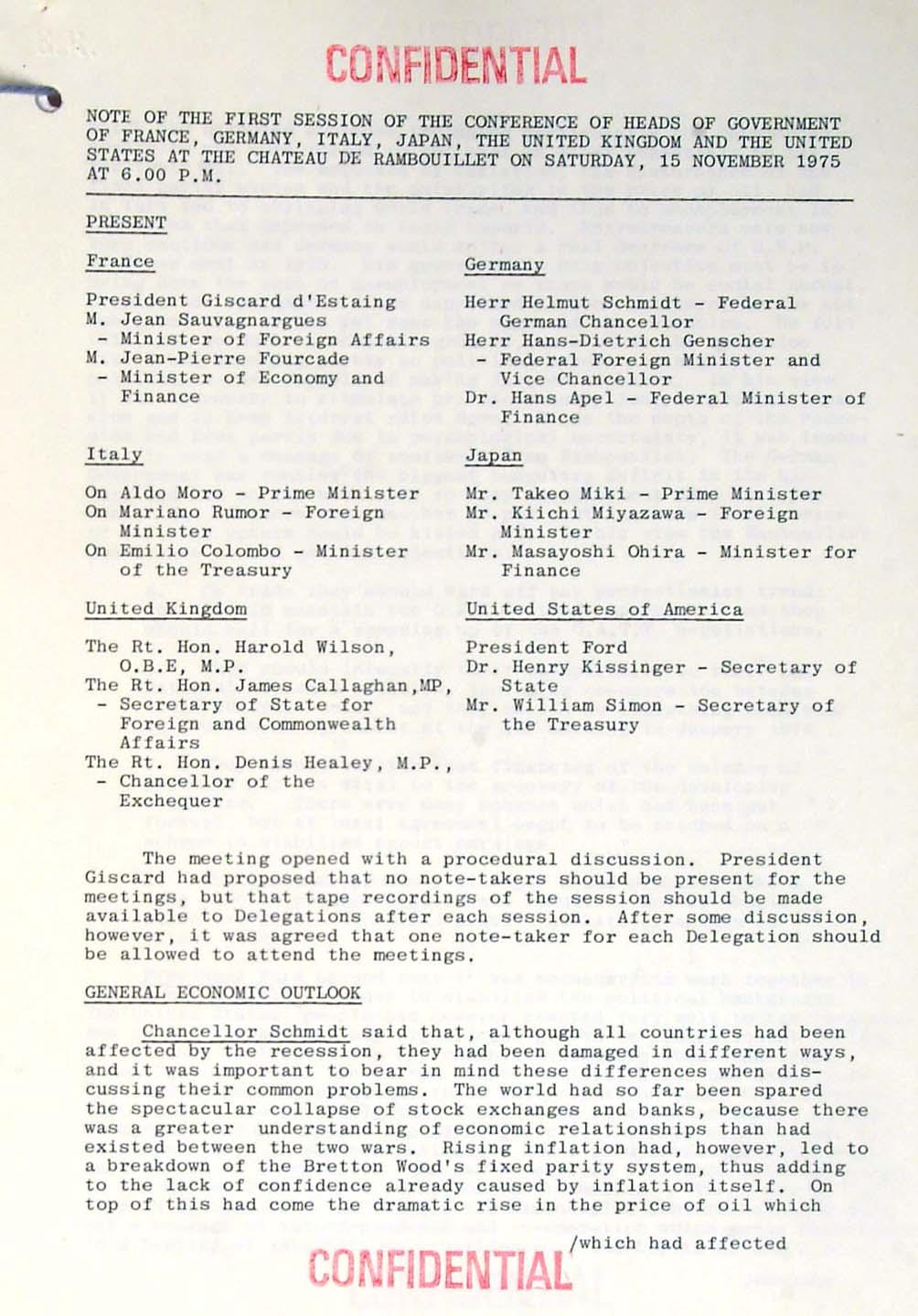
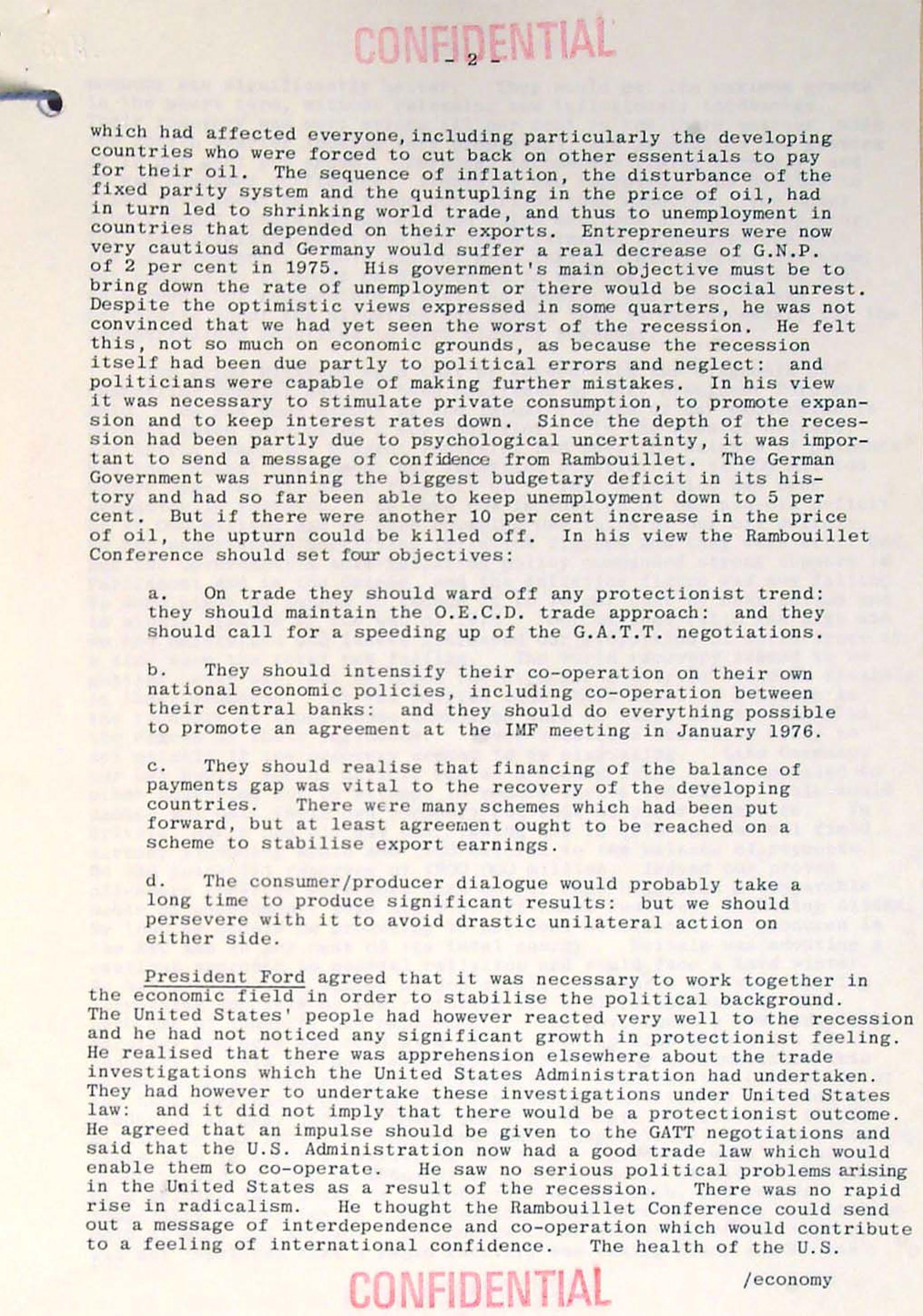

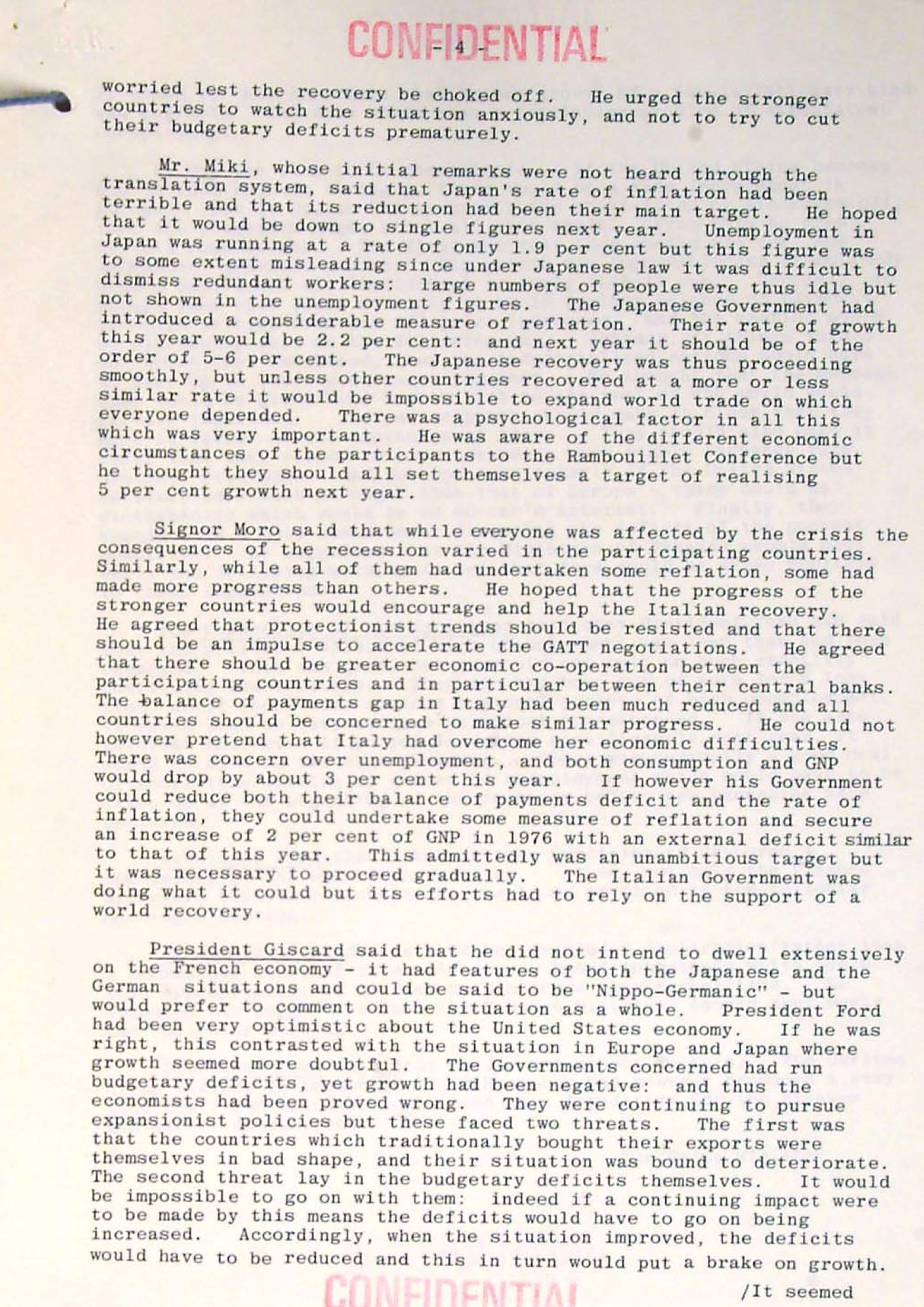



By Jenny Latchman-Atkins
When we think of paradise we often transport ourselves to a tropical island. A book in one hand and a cocktail in the other, while kicking back on a white sandy beach, inhaling the warm salty air and listening to the rhythmic musings of the beautiful blue ocean.
Islands in the Caribbean Sea, the Quintana Roo coastline in Mexico andpopular beaches along the Florida coast historically have earned the title of paradise.
Along with breathtaking beaches, this region boasts some of the most biologically rich marine environments in the North Atlantic Ocean, which includes extensive coral reefs, mangroves, seagrasses and thousands of species of fish and marine mammals. Each year, millions of visitors descend with the dream of enjoying a pristine environment, ripe for rest, relaxation and recreational sports such as sailing, fishing, snorkeling and diving.
However, since 2011 these precious coastal regions have come under threat from a 20 ton sea menace!
First noted by Christopher Columbus in 1492, the Sargasso Sea is the largest region of the North Atlantic Ocean, with an area of about 3.5 million km2. Sargassum, a brown pelagic macroalgae, or seaweed, has historically thrived in healthy quantities in the Sargasso Sea. It has provided critical support for a myriad of commercially viable, endangered and endemic marine species such as whales, sea turtles, frogfish, shrimp, tuna, swordfish and marlin. With a vibrant ecosystem, and an array of flora and fauna, the Sargasso Sea has been referred to as the “Golden Rainforest”. Because of its important biodiversity, the Sargasso Sea is protected by the Hamilton Declaration and overseen by the Sargasso Sea Commission.
To the bewilderment of everyone, in 2011 satellite imagery from NASA showed an explosion of sargassum growth in a new southern geographical location, creating wha is widely referred to as, the Great Atlantic Sargassum Belt, or the GASB.
Floating more than 5,000 miles from the west coast of Africa through the Caribbean Sea and into the Gulf of Mexico, the GASB is the largest and reportedly the most harmful algal bloom on the planet! Experts predict that during its most fertile months, the GASB contains an average of 20 million tons of toxic matter and it has caused a range of environmental, economic, and social problems, with implications for coastal communities, tourism, and marine ecology.
While the exact culminating factors that spurred the initial development of the GASB remain a subject for discussion, contributing factors that aid in the continued proliferation of sargassum have been identified as:
• Nutrient Influx: Agricultural runoff from the Congo, Amazon, Orinoco and Mississippi rivers.
• Dust from the Saharan Desert.
• Upwelling of nutrient dense water from the deep sea.
• Changes in natural ocean currents and wind patterns have pushed sargassum into areas where it was previously uncommon.
• Climate change provides an abundance of sunshine and warmer ocean temperatures are thought to facilitate the rapid growth of sargassum.
The GASBs magnitude causes migratory interference for native and non-native fish populations. Fisherfolk may find their regular catch is no longer plentiful or
available, while new varieties of fish and marine species may migrate into the area. Dr. Shelly- Ann Cox, Fisheries Officer, Barbados, notes that while there has been a decrease in flying fish and mature dolphin fish in Barbados, they’ve seen an increase in juvenile dolphin fish and small lobsters, which are normally uncommon.
Floating sargassum mats block essential sunlight, which is necessary for the healthy growth and development of coral reefs, seagrass and sea moss beds, and mangrove forests. These reefs, beds and forests not only help to shore up coastlines; they provide habitats for a myriad of marine species and aid in capturing carbon from the atmosphere.
Arriving seemingly overnight and smothering beaches at an accelerated rate, sargassum’s arrival requires a rapid response as decomposition begins within approximately 48 hours of making landfall. As it decays, sargassum changes the pH level of the water at the shoreline. Dr. Brian LaPointe, Research Professor at Florida Atlantic University’s Harbor Branch Oceanographic Institute, has been studying the changes and states that the resulting nitrogen/phosphorus imbalance causes additional stress to coral reefs and can lead to coral bleaching. “Dead zones” where decomposing sargassum sucks oxygen from the water are also common, leaving native plants and marine life struggling to survive. Sadly, it doesn’t stop there. Six of the seven sea turtle species are on the endangered species list and all are found in this region of the North Atlantic Ocean. Nesting sea turtles may have to travel miles to find a clean beach to lay their eggs, and incubating eggs are at risk of being crushed during beach clean-up. The sex of incubating sea turtles also may be altered, as sargassum strandings can change the temperature surrounding the eggs, a determining factor in the sex of the embryo.
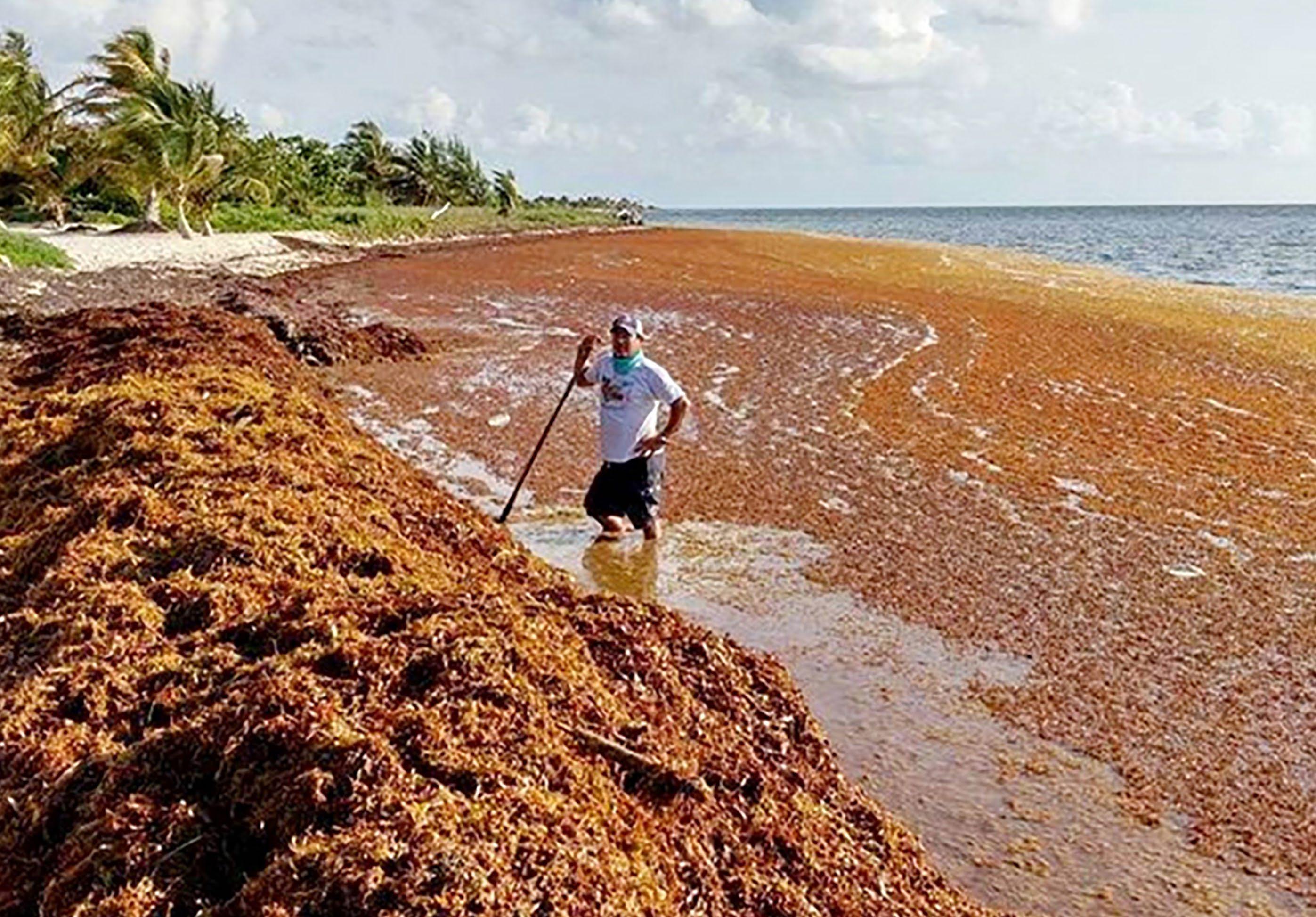
Once hatched, the journey out to sea and safety is thwarted. Hatchlings are at increased risk from sun exposure, disorientation and predators, as they inchmeal across mounds of washed up sargassum trying to make it to the ocean and safety.
As the GASB makes its 5,000+ mile journey, it absorbs carbon dioxide from the atmosphere, and toxins and heavy metals such as lead, arsenic and cadmium from the ocean. This is a favorable side effect, but sadly, collected sargassum is then often dumped on land in deep landfills. Further research has to be done, but this common practice raises the question of whether the potential now exists for these toxins and heavy metals to seep into the local groundwater. Dr. Brian LaPointe, Research Professor at Florida Atlantic University’s Harbor Branch Oceanographic Institute, works with several islands across the Caribbean. He shockingly states, “they have literally
taken the beach to the dump”. This is not an exaggeration, heavy machinery, such as bulldozers, used over several years to remove sargassum, have caused extensive beach erosion. The loss of shorelines have lasting impacts to tourism, recreational activities
With a vibrant ecosystem, and an array of flora and fauna, the Sargasso Sea has been referred to as the “Golden Rainforest”. Because of its important biodiversity, the Sargasso Sea is protected by the Hamilton Declaration and overseen by the Sargasso Sea Commission.
and, of course, causes the natural loss of coastal habitats and can lead to flooding. Arriving seemingly overnight and smothering beaches at an accelerated rate, grown men can almost get lost in it. Removal needs to take place rapidly as decomposition begins within approximately 48 hours of sargassum making landfall. As it rots, it releases hydrogen sulfide, which has the unmistakable stench of rotting eggs, ammonia and methane, which cause impacts to human health and adds to greenhouse gas emissions. Tourists and local residents have reported an increase in headaches, nausea, rash, upper respiratory irritation, sneezing and an inability to concentrate. Dr. Dabor Resiere, Intensive Care Unit, University Hospital of Martinique, has been the lead author of several papers citing the potential for even more serious medical conditions such as cardiovascular, ocular and neurocognitive symptoms with prolonged exposure to hydrogen sulfide and ammonia. →
→ Local residents have also complained of mental health stresses, as they are plagued with insomnia and are no longer able to enjoy their natural resources. A family day at the beach is hampered by the fly-infested mass on the beach, brown sludge at the shoreline and the unmistakable stomach turning stench. The corrosion of electrical appliances such as fridges, microwaves, AC units and jewelry have also been reported and are attributed to the off gassing of the decaying sargassum.
In 2015, the government of the Quintana Roo state of Mexico, hired 5,000 day laborers, working in four-hour shifts, to remove seaweed from more than 100 miles of beach. In tourist-haven Cancun, workers raked approximately a half-million cubic feet of seaweed which amounted to more than 1,000 truckloads.
“The greatest single threat to the Caribbean economy I can imagine”, Hilary Beckles, Vice Chancellor, University of the West Indies said on the issue of the sargassum influx.
According to the World Travel and Tourism Council’s 2019 report, the Caribbean is ranked as the most tourismdependent region in the world, with eight out of the ten most tourism-dependent countries located there. In 2022, $37.5 billion was reportedly generated from tourism alone. Tourism is the lifeblood of the Caribbean and with these statistics, it is not difficult to conclude that if tens of millions of visitors can no longer enjoy their vacations, over time the potential exists for a massive loss in tourism revenue with far-reaching, and potentially catastrophic results.
On a local, and much more personal level, fisherfolk will continue to experience a strain on their financial stability with:
• Fewer overall days at sea.
• Changes in available catch.
• Difficulty getting their boats through the sargassum mats.
• Increasing cost of repair to their boats and fishing gear because of sargassum damage.
Research is being conducted by the educational and scientific community, and a few private-sector companies are racing to develop solutions for valorization and mitigation. Solutions being discussed include:
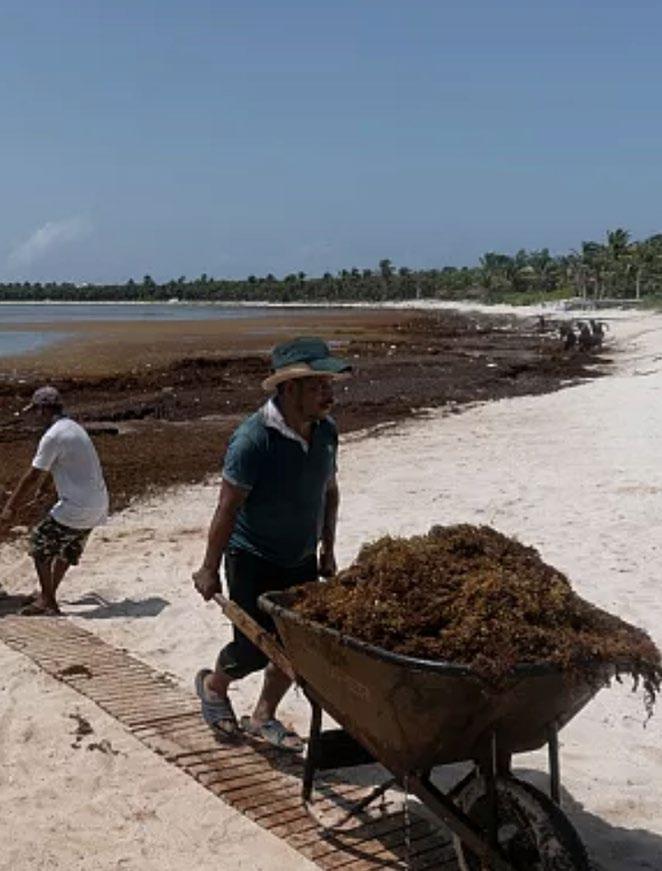
• Collect sargassum while it’s at sea. A costly endeavor, but one that mitigates beach erosion and several other issues associated with decomposing sargassum after it makes landfall. There are several companies that have developed specific boats, or re-engineered fishing boats, for open-sea sargassum collection.
• Remove sargassum from beaches by hand with rakes and carts, which reduces beach erosion and protects coastal ecosystems. This also provides employment opportunities for local residents.
• Remove harmful nutrients, then sink sargassum deep into the ocean. This sequesters carbon in the deep sea for hundreds, if not thousands of years. However, this also leaves questions about how this practice might impact the deep sea over the long run.
• Develop safe and sustainable onshore methods for storage and disposal.
• Valorize sargassum by repurposing it for industrial or cottage industry use, i.e. biofuel, plastics, fertilizer, paper and construction materials, such as bricks.
• Fund further research into the true root cause of the phenomenon to better understand the threat.
• Engage and hold accountable, specific countries and entities, whose practices aid in the development of the GASB.
• Anchor mesh barriers offshore to prevent sargassum from reaching the beaches, thus allowing safe collection out at sea.
• Implement wide use of SaWS - Sargassum
Warning System, a system using data from NASA and developed by one of sargassum’s leading researchers, Dr. Chuanmin Hu, Professor, University of South Florida, to better prepare for major influxes.
Without doubt this is a geo-political issue involving nations on the African and South American continents, the United States, Mexico and independent Caribbean nations, as well as the Caribbean territories of countries of the European Union.
Experts agree that the The Great Atlantic Sargassum Belt isn’t going anywhere for the foreseeable future. Therefore, innovation and financial aid to support sustainable clean up, disposal and repurposing efforts are vital to help preserve the region’s future and to avert further crisis. Of the seventeen SDGs established by the United Nations, the impact of the Great Atlantic Sargassum Belt relates to at least seven, and thankfully the UN is working through the UNEP and UNDP across the region on the issue, but more needs to be done. It is critical that all stakeholders are engaged, these include:
• International governments, including those involved with the G7, G20 and COP
• Regional governments
• Tourism industry
• Scientific and educational communities
• Environmental agencies
• Private sector
• Local residents
Ultimately, we are one interconnected and interdependent global community, and therefore a menace to one, is a menace to all.
The author, Jenny Latchman-Atkins, is of Caribbean descent. She is passionate about exploring the effects of the Great Atlantic Sargassum Belt and has written a featurelength documentary “Sea Menace”, to explore the four pillars of impact: Ecology, Environment, Public Health and the Economy. To meet Jenny and hear more about the topic, watch the Sea Menace Sizzle Reel. ■
To support the making of this film, please contact her directly at jennyla@goodgoblinproductions.com

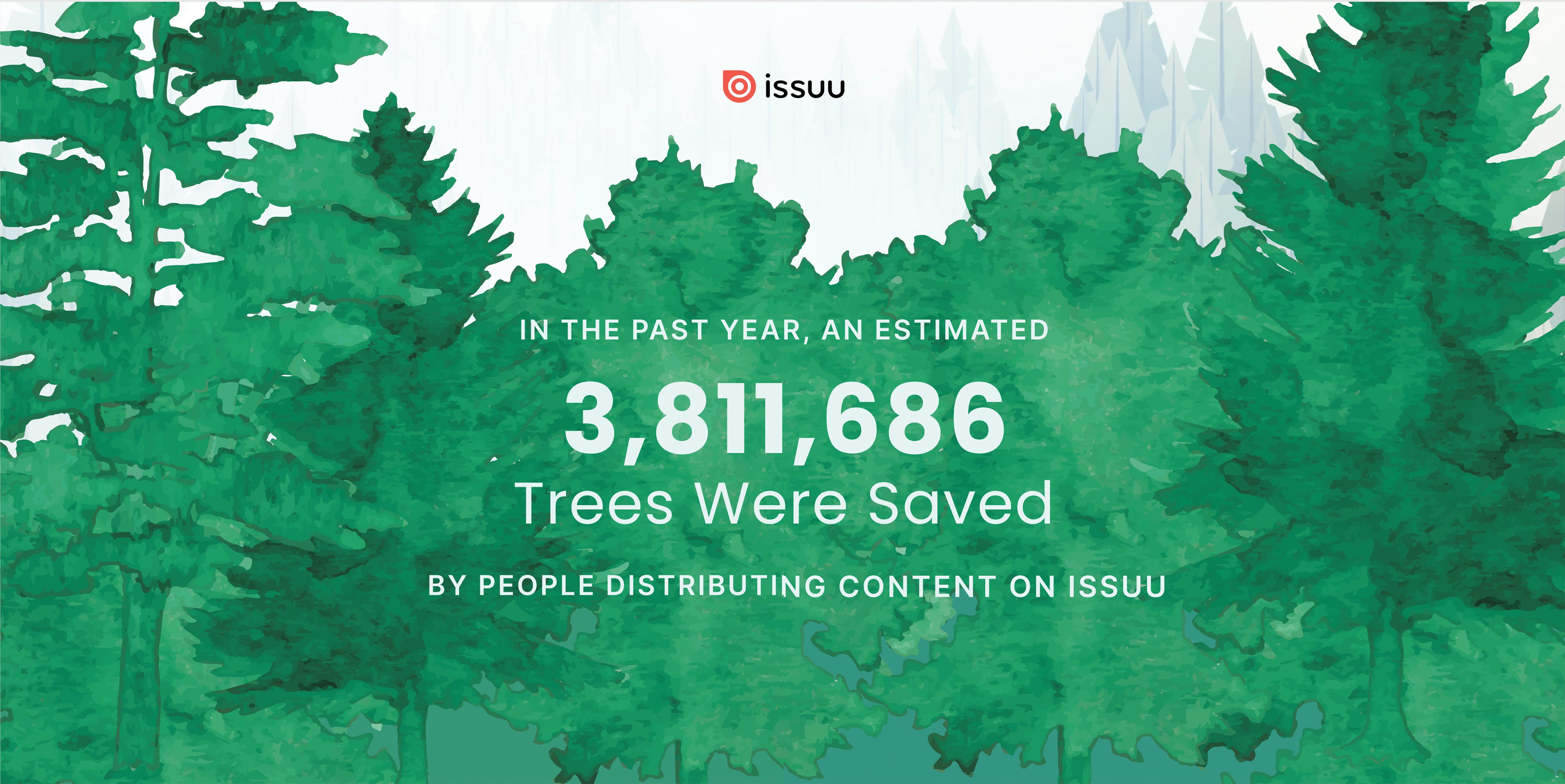





approach, which lies at the heart of everything we do, we’ve identified three key global topics – climate change, circularity, health and wellbeing as guideposts for our efforts.
We recognize that no one can solve this challenge alone. Collaborating with customers, suppliers, academia and other stakeholders is fundamental to what we want to achieve. It’s about pushing boundaries and finding

with the Paris Agreement – which aims to limit climate change and ensure the global temperature doesn’t rise more than 1.5˚C above pre-industrial levels – and are approved by the Science Based Targets initiative (SBTi).
For our own operations, we’re moving to renewable electricity and reducing our overall energy consumption. Across our value chain, we engage with our suppliers and develop sustainable
• Scope 3 downstream: the application and curing of our coatings accounts for 30% of our total carbon footprint, mainly due to coatings cured at elevated temperatures. VOC emissions make up 11% of our total footprint. We added this category to our SBTi commitment as VOCs are an important emission factor for the paints and coatings industry.

Scope 3 downstream: end-of-life emissions relate to the carbon in our products which is released at the end of their lifecycle, accounting for 11% of carbon emissions.
To achieve our target of reducing our carbon footprint in our own operations by 50% (Scope 1 and 2), we’re working on two enablers: increasing the percentage of renewable electricity to 100% and reducing the energy we consume by 30% by 2030 (versus 2018).
From an absolute reduction perspective, our combined Scope 1 and 2 reduced by 28% versus our 2018 baseline (absolute). Compared with 2021, we further reduced carbon emissions by 12% in 2022 (absolute). We’re well on track towards our 50% reduction target for 2030. From a relative perspective, our at since 2018, while our Scope 2 emissions reduced by 32%.
Part of reducing our carbon emissions from our own operations (Scope 1 and 2) is reducing the amount of energy we consume. We’re committed to reducing our relative energy consumption by 30% by 2030 (baseline 2018) and plan to do so through an ambitious 5% relative year-over-year reduction objective. For 2022, our absolute energy consumption reduced 7% versus 2021, while our relative energy consumption was 1% up compared with 2021, and reduced by 1% versus 2018.
We track the cumulative energy reduction impact of improvement projects such as shutdown management and LED installation. This helps us better understand our performance and adjust our strategy as we continue in a cycle of continuous improvement. Despite the programs in place, achieving the 5% relative reduction target has been challenging, partly due to changes in our product and portfolio mix. For example, changes in our product portfolio mix include increased demand for products that take a higher energy intensity to produce.
The current macro-economic environment has also impacted our volumes and therefore our relative energy consumption. In addition, the

WE’RE AWARE THAT CLIMATE CHANGE COULD AFFECT OUR OPERATIONS, OUR SUPPLY CHAIN AND OUR CUSTOMERS. SO, IN 2017, WE COMMITTED TO BECOMING A CARBON-NEUTRAL COMPANY BY 2050.
VOC emission abatement systems and solvent recovery units we’re installing to reduce VOC emissions and waste are relatively energy intensive.
While an overall relative energy consumption reduction of 5% was not achieved, we’ve implemented many energy reduction initiatives. For example, our Hull site in the UK installed CEMA lighting, which reduced the lighting system’s carbon emissions by 70%.
And in France, a renewal of Montataire’s compressor room and a warehouse LED project have reduced annual electricity consumption by more than 1.8 GWh. We’re continuing to investigate targeted investment for energy reduction programs, refine our energy monitoring management and implement a renewed governance structure.
Our total percentage of renewable electricity was 50% in 2022, well on track towards our target of 100% by 2030 and already achieving our 2025 interim target of 50%.
During 2022, we continued to install solar panels at several sites and purchase renewable electricity with certificates of origin. Generating renewable electricity on site alleviates pressure on the electricity grid and further reduces our carbon footprint. In total, 53 of our locations now use 100% renewable electricity and 26 sites are using solar panels as a supplementary source of energy.
Our Izmir powder coatings facility in Türkiye completed a major solar energy project in 2022, with more than 2,300 panels installed. Similarly, our Songjiang decorative paints facility installed over 5,000 solar panels during 2022.
Three rooftop solar PV systems at AkzoNobel sites in Malaysia and Thailand have been commissioned by Cleantech Solar under long-term agreements where Cleantech Solar has funded, built, and will operate and maintain the systems throughout the term of the agreement.
Two of the sites are located in Chon Buri and Samut Sakhon, Thailand and the third site is located in Nilai, Malaysia. The combined 1.6 MW solar power plants saw 7818 panels installed across the industrial coatings sites and are targeted to avoid about 28,000 tonnes of CO2 emissions across the term of the agreement. The solar power plants has helped AkzoNobel progress towards its target in sourcing 100% renewable electricity by 2030 as part of its RE100 commitment.
The production of solvent-based paints and coatings causes emissions of volatile organic compounds (VOCs). These emissions are included in our cradle-to-grave carbon footprint. In our own operations, we achieved a relative 7% reduction versus 2021 in VOC emissions per ton of product, and a total reduction of 45% versus the 2018 baseline.
We’re reducing VOC emissions in two distinct ways. Firstly, we implement abatement technologies such as thermal oxidizers or activated carbon →

→ filters. Secondly, we optimize our footprint by concentrating solventbased production in more efficient or automated factories to altogether eliminate emissions. In addition, we’re also actively working on transitioning from solvent-based to water-based solutions where possible.
Example: Increased capacity for sustainable solutions
We’ve invested in a new production line for water-based texture paints at our Songjiang site in Shanghai, China –boosting capacity for supplying more sustainable products. The site is one of four water-based decorative paints plants in China and among our largest globally. The new 2,500 square meter facility will produce Dulux products for various markets, such as interior decoration, architecture and leisure.
Recent projects include introducing new solar energy systems and a more automated high-speed filling line.
“As our largest single country market, China has huge potential,” explains Mark Kwok, Director of Decorative Paints North Asia. “The new production line will help enhance our leading position in paints and coatings in China by expanding new markets and further driving us towards our strategic
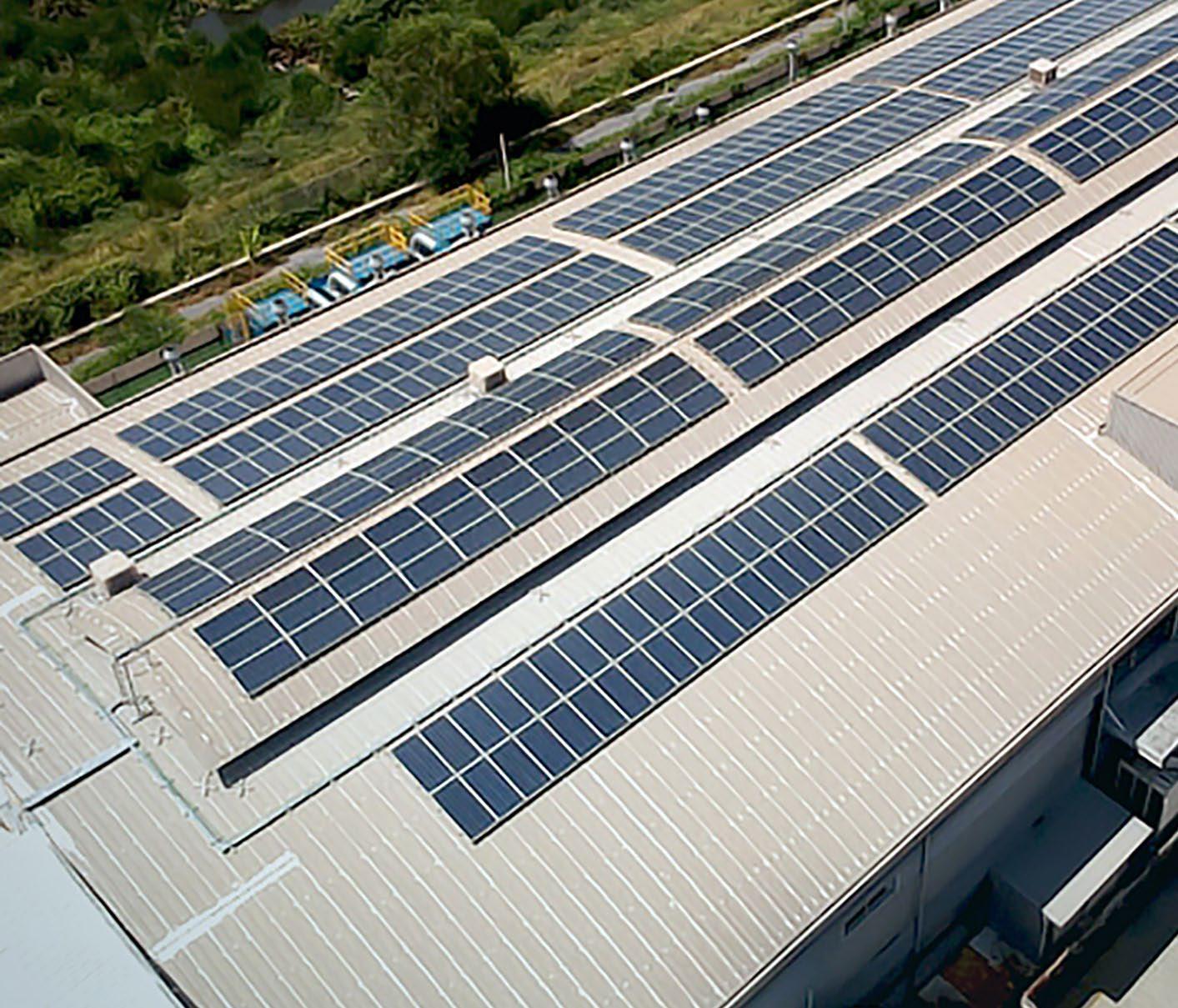
ambitions.” China is increasingly focusing on energy conservation and emission reduction, which in turn is being reflected in the type of products customers want to buy. The production of low VOC, water-based paints will therefore need to keep expanding to meet this demand.
2022 Sustainable product solutions to address climate change Energy efficiency: new low-curing powder coatings in the agriculture, construction and equipment market segment help our customers reduce energy consumption.
Reduced solvent emissions: we continued switching wood care and trim paints to water-based technology, which is making up more than half of our volume in Decorative Paints EMEA in 2022.
Circular solutions: we scaled up the use of bio-based renewable raw materials in our wood finishes for the furniture market.
Circularity: For AkzoNobel, the circular economy goes beyond recycling. It all starts with limiting the need to recycle. Therefore, we focus on zero waste, finding alternative sources for our raw
materials and repurposing and reclaiming materials. This commitment goes beyond our own operations. It’s a responsibility which stretches across the value chain. We work closely together with suppliers and customers, because collaborative innovation will play a crucial role in helping us to achieve our ambitions.
Paints and coatings make a vital contribution to extending the lifespan of substrates, which effectively means that circularity is built into the benefits they offer. Our products can make objects last longer, reducing the need for additional raw materials and resources, while also improving our customers’ productivity and reducing waste. Just think about how long buildings or cars would last without being coated.
Waste and Water Management: We’re on a journey towards achieving 100% circular use of materials in our own operations by 2030. To get there, we’re focused on reducing the amount of waste and increasing the circular use of materials. In 2022, we achieved circular use of materials for 56% of our obsolete material and waste streams. In line with our strategy of reducing, reusing and recycling materials, our material optimization process focuses on
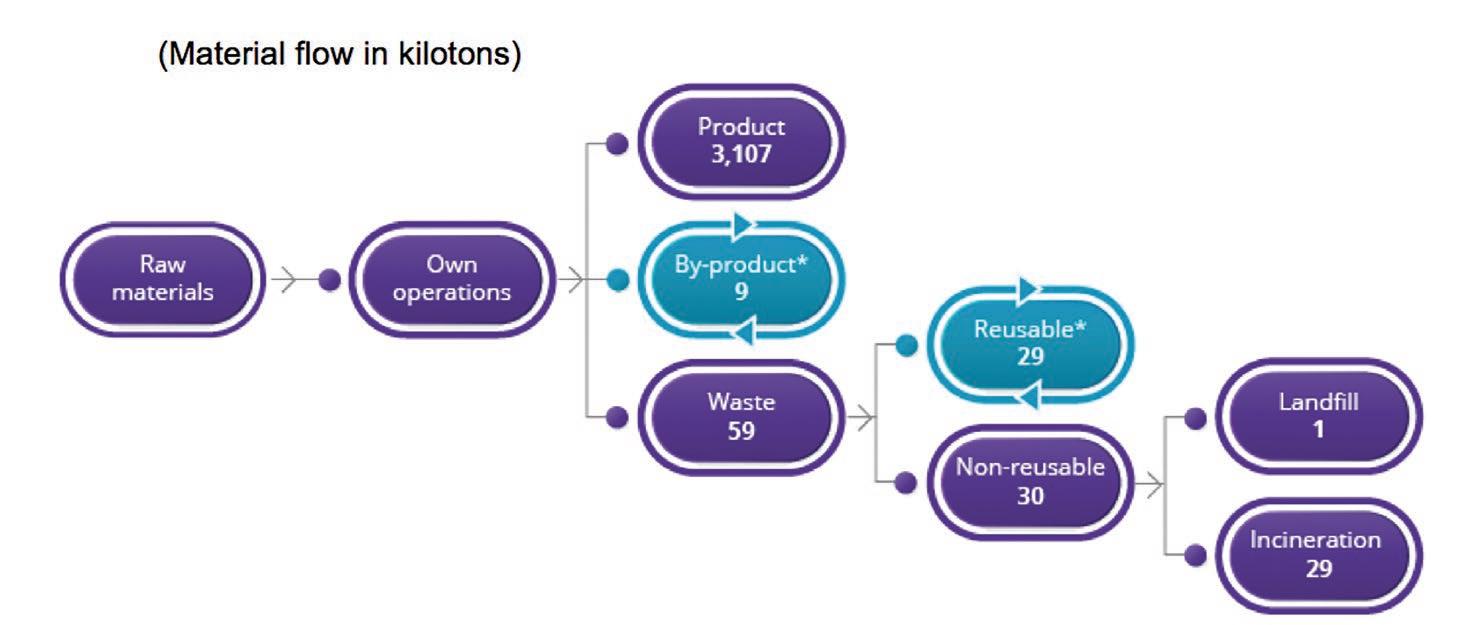
The amount of materials reused by AkzoNobel and third parties (reusable waste and by-products) divided by the total waste and by-products, provides the percentage of circular use of materials
diverting slow-moving and obsolete materials from incineration to internal reuse and third-party recyclers and outlets.
Over the last few years, we have managed to reduce our relative and absolute waste generation. While the disposal of slow-moving obsolete stock and legacy waste remains a continuous challenge, numerous waste reduction projects help to achieve the observed reduction. We’re driving various global programs, such as wash water recycling, solvent recovery units, and finding ways to avoid sending waste to landfill avoidance to further reduce our waste.
The bulk of our water use is for cooling (78% in 2022). This occurs at only a handful of our production locations in areas with a low water availability risk (assessed through the
Aqueduct tool). Water is also used as a raw material in paints and for cleaning. We concentrate our water consumption reduction efforts at our water intensive sites – which we define as a site that uses more than 15,000m3 per year, excluding cooling water. These sites are expected to meet our target of less than 250 liters of relative fresh water consumption per ton of product. As per our internal, best-in-class benchmark analysis, a site that consumes less than 250 liters per ton of product produced is considered to have “water reuse” measures in place. Currently 34% of our sites (42) meet the definition of a water intensive site, representing 76% of our total freshwater consumption. In 2022, 14 out of the 42 water intensive sites reached the target.

Recycled content in packaging
In 2022, we delivered towards our ambition to use at least 50% recycled content in the plastic packaging used by our Decorative Paints Europe business by 2025. Through collaboration with our packaging suppliers, we’ve been able to achieve up to 70% recycled content in our key packs without increasing the packaging weight or reducing its performance. In 2022, we updated most packs in the UK – our largest European market – and have further worked towards the roll-out in mainland Europe. Currently, almost one third of plastic packaging contains recycled content. We expect that to grow to more than two thirds of products in 2023, with the remainder to be changed in 2024.
Example: Paint the Future accelerates sustainable startup solutions
Three startups have signed letters of intent to continue working with us on sustainable business opportunities following our latest global Paint the Future challenge. The accelerator event was held in March, with the 2022 edition attracting a total of 245 submissions from 62 countries. The three winning startups were SolCold from Israel, Aerones from Latvia and the Czech Republic’s SprayVision.
SolCold’s solution is a sustainable, self-cooling coating based on antiStokes. It uses the sun’s energy to keep the inside temperature much cooler, without having to use any electricity.
Aerones brings a robotic solution to wind turbine maintenance. Their crawling robot allows technicians to safely and efficiently perform inspections, cleaning and repairs at height.
SprayVision’s solution brings a datadriven approach to optimizing spray application of paint, offering customers full control over the process. It helps to reduce environmental impact by saving material and improving quality.
The health and well-being of our employees, customers, end-users →

→ and other stakeholders in the communities where we operate is very important to us.
2022 sustainable solutions for health and well-being: Customers and end-users benefited from several sustainable solutions launched in 2022, designed with safety, health and well-being in mind.
Reduce harmful substances: launched new food packaging coatings that are free from BPA, including Aqualure G1 50.
Anti-bacterial benefits: a new all-inone decorative paint rolled out in North and South Asia offering anti-bacterial protection due to its silver ion technology.
Safer handling: launched a new exterior wood finishes primer for high moisture resistant MDF, which is safer for users as it contains fewer substances of concern.
As we work towards our ambitious targets, we benchmark ourselves versus peers and industry. We annually review
About Akzonobel
the benchmarks we actively participate in, taking into account stakeholder preference, such as investors, suppliers and customers. We prioritize active participation in those benchmarks that help to drive continuous improvement and rely mostly on publicly available information. We’re proud that we’ve remained at the forefront of the paints and coatings industry throughout 2022, based on these ESG rating agencies and benchmarks.
• EcoVadis: We were awarded a Platinum rating in the latest review, positioning us in the top 1% of our industry.
• FTSE4Good: We were included in the latest FTSE4Good Index Series – that makes more than 15 years we’ve been included in this influential ranking.
• MSCI: We’ve received the highest possible rating (AAA) for seven consecutive years.
• Sustainalytics: We’re assessed as “low risk” and ESG top rated in our industry.
We reiterate that these ambitious goals cannot be achieved alone and invite like-minded partners and customers to join us on this journey. ■
We supply the sustainable and innovative paints and coatings that our customers, communities –and the environment – are increasingly relying on. That’s why everything we do starts with People. Planet. Paint. Our world class portfolio of brands – including Dulux, International, Sikkens and Interpon – is trusted by customers around the globe. We are active in more than 150 countries and have set our sights on becoming the global industry leader. It’s what you’d expect from a pioneering paints company that’s committed to science-based targets and is taking genuine action to address globally relevant challenges and protect future generations.
For more information, please visit www.akzonobel.com

Pamela Phua has been General Director of AkzoNobel Decorative Paints Vietnam since 2017. At the beginning of 2021, she was appointed to be Product Management Director, Decorative Paints - SESA, being instrumental in developing and maintaining a product portfolio that satisfies market demands and maximizes margins at competitive costs.
Before moving to head Vietnam Paints business, Pamela was the BU R&D Director & Global Director, Exterior Walls. In her 18 years stint in R&D, she has driven the business with new technology development and product implementation across the region, especially in Vietnam market and has successfully launched many innovative products including Dulux Weathershield / Powerflexx, Dulux Pentalite, Dulux Wash & Wear / EasyClean, Dulux Inspire/ Catylac by Dulux and Aquatech.
In her global capacity, Pamela implements the functional and production innovation strategy for exterior wall paint. She spearheads the RD&I functional excellence, standards and capability, and the efficient delivery of processes as the approved standards and processes across the globe.
Together with a special passion for sustainable development, she has led her teams to innovate paintings products and solutions through increasingly sustainable benefits for AkzoNobel customers and the environment. She also actively gets involved in sustainable activities in projects to create inspiring living spaces for local communities and to promote green architecture trends.
Pamela’s expertise and experience has been instrumental in the setting up of industry standards in Singapore. She is the President and Technical Chairperson for the Singapore Paint Industry Association and a management member in the Chemical Standards Council of Singapore. She contributed to the development of various Singapore Standards such as SS 345 (Specification for emulsion paints for decorative paints), SS500 (Specification for elastomeric wall coatings), SS150 (Specification for Emulsion Paints for Decorative purposes), SS 579 (Specification for water- based sealer for interior and exterior uses) and many others. Pamela currently leads Working Group for Fine Ceramics (for photocatalysis) and Waterbased Standards and participates in the Working Group for Energy Efficient Coatings. She is also an A*Star certified auditor for accredited laboratories in Singapore.
With a special passion for sustainable development, Pamela is actively involved in projects to create inspiring living spaces for local communities and to promote green architecture trends. She is an author for the G7&G20 summit publication advocating green developments. She is also a keynote speaker in United Nation climate Change Conferences.
Email: Pamela.phua@akzonobel.com
Mobile: +65 90279663
Address: AkzoNobel House, 3 Changi Business Park Vista, #05-01 SDingapore 486051

Brunnbäck is a small community with about 23,000 inhabitants located in the southeast of Avesta, a municipality in Dalarna province in Sweden. Brunnbäck is a beautiful place up on the hill with forest and the big Lake Dalälven that stretches 541 km.
In 1521, there was a historic battle between Sweden and Denmark (War of Liberation 1521-1523) where Sweden won over Denmark. This was a massive victory for Sweden and Gustav Vasa. At Brunnbäck, there is a big Stone as the symbol for the 1521 victory, and the people can go there and read this historical memory on site.
Hence the name of this historic Water from Brunnbäck and where our Water is coming from. 16th May 2023 it has been 500 years since the historic battle was in Brunnbäck Sweden , in this day 16th May the Swedish army hold a ceremony in Brunnbäck to the memories.
“ Today’s Sweden was born at Brunnbäck “ - Börje Forslund.
The Water is approved by the Swedish Livsmedelsverket, a Report issued by
Accredited Laboratory and Eurofins with a pH 7.8, and minimal with salt in the water. It is a Quality water and one of the best in Sweden.
My name is Rickard Nilsson. I’m 37 years old, and I am the CEO & Founder of Brunnbäck Sweden Natural Mineral Water AB. I was born and raised in Avesta and live 2,5 miles from

Avesta now with my family.
I founded Brunnbäck Sweden Natural Mineral Water AB on February 20th, 2022. We are growing slowly but at a good pace. We are marketing a lot and we are been seen in DAZN streaming Service with Brunnbäcks collaborations with Muay Thai For Life Gala, among many other things. My vision is to start selling this fine Water worldwide, and I will also focus on helping vulnerable people who need Water by donating at least a million litres of Water each year to them.
We need to start rethinking and doing the right thing other than profitability. The earth and we as a species must start working together and contribute to a better world on all fronts, such as storage, solar energy, and transport. Switch to Green Energy, but it must be allowed to take time and don’t make a quick decision.
After a while, we will see that the decision to take time was wise; however, we still need to move fast.So we need to take a decisive conclusion.

Our water Factory will be 100% powered by solar energy, and our Water will be transported and distributed to our customers by electric trucks or vehicles. We are going to sell our Water in Pet and glass bottles, but we are looking for better options for bottles and labels.
We will focus very much on making everything much better for the environment. If you who read this article feel and think like me that you want to make a difference in this world, I am looking for the right investment partners to help me start to build the Factory and sell this quality water worldwide.
I plan to launch the products to the market in Q4 2025. I want to invite my future investment partner to come to Sweden and Brunnbäck, and I will show you the location and the plans. So you are most welcome if you are likeminded to me. I have had this vision/ call since 2013, and now is the right time to put Brunnbäck Sweden on the world map and help a better world. ■
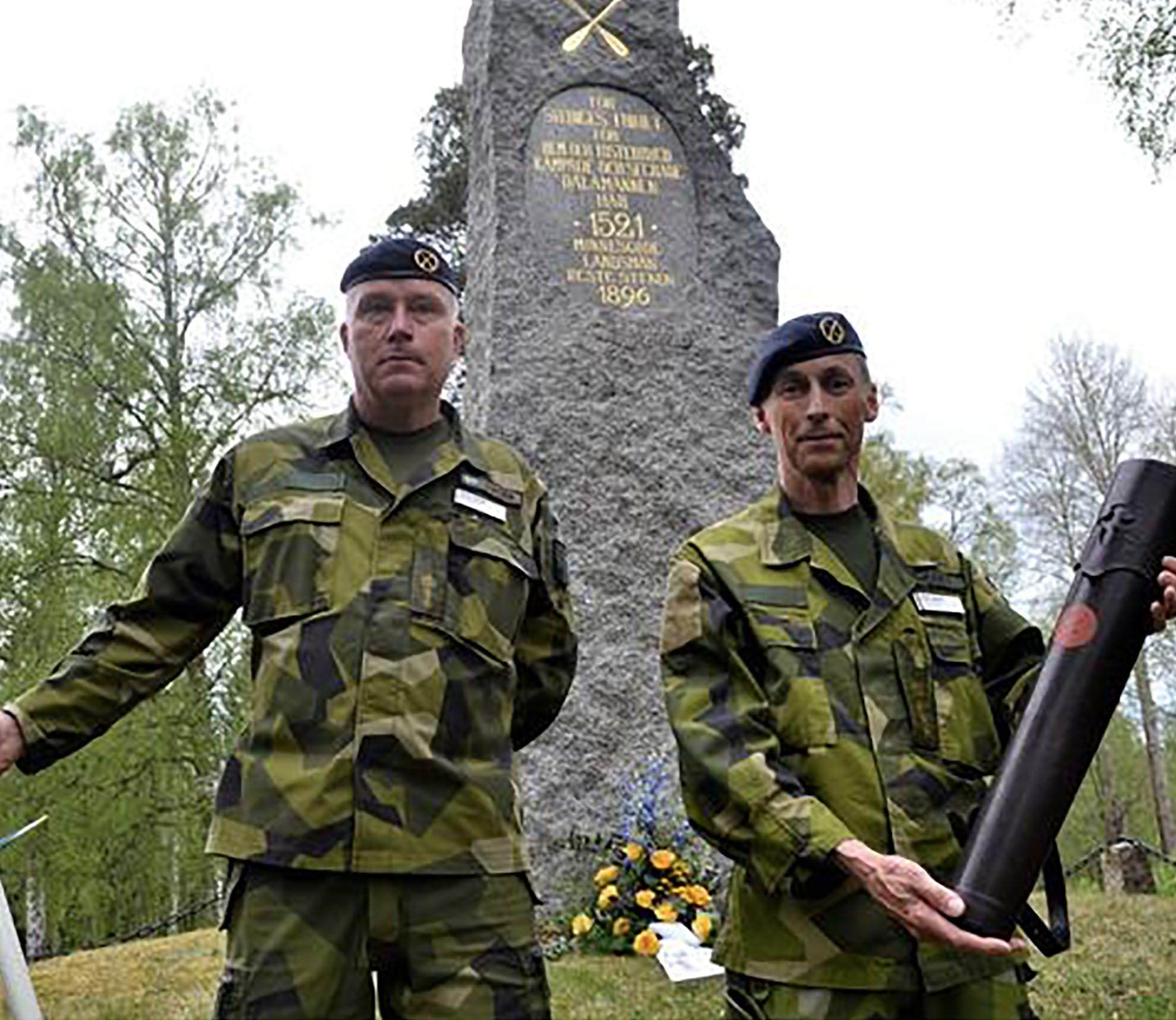
AUTHOR: Norma Quinto

In the vast expanse of our planet, where land meets sea, an extraordinary musical odyssey unfolds—a powerful harmonization of melodies and the secrets of the deep. Sounds of the Ocean, an immersive experience that combines marine life sounds, original music, poetry, dance, and visual art, grants its audience members a deeper connection with the ocean and marine life. This captivating fusion is not merely a testament to human creativity; it’s a vital call to action for preserving the oceans, Earth’s lifeblood. In this in-depth exploration, we venture into the heart of this revolutionary endeavor, guided by the visionary artist whose passion for music and ocean conservation has ignited a global movement.
The journey of our protagonist, the driving force behind Sounds of the Ocean, commences with a childhood steeped in musical curiosity. From an early age, Miller was filled with an unbridled curiosity to make sounds. He studied clarinet in the United States public school system where he realized that music had the ability to foster a sense of community and transcend verbal communication. Simultaneously, a deep connection with the ocean emerged during family vacations. Both of his parents were avid divers and during those family scuba diving trips Miller found a sanctuary of peace and serenity under the waves. These dual passions of music and
the ocean have since become the driving forces in Miller’s life, but it took going through a difficult time for his two passions to coalesce.
After witnessing the destruction of the ocean, the artist rekindled his relationship with music and discovered its therapeutic power. Miller explained, “It was during a transformative concert that the fusion of healing melodies and marine sounds came to be after a discussion with Dr. John Ryan, an eminent researcher from the Monterey Bay Aquarium Research Institute.” This encounter became the genesis of Sounds of the Ocean—a transformative auditory experience designed not merely for entertainment but as a therapeutic escape and a clarion call for conservation.

Sounds as Catalysts: The Power of Music in Conservation
The marriage of music and oceanic sounds is no arbitrary union; it is a deliberate choice rooted in profound psychology. Sound, as a medium, possesses unparalleled power. Through the artful composition, the audience is transported into the marine realm, where whales serenade, and dolphins dance. As Miller says, “When do we get the chance to be face-to-face with a humpback whale? For most of us, this will never happen. Our productions are designed with this in mind, to simply allow the audience to feel as-if the whales and dolphins are right in the room with us and we are swimming alongside these beautiful creatures.” This deep connection fosters empathy and

impact of Sounds of the Ocean extends far beyond concert halls. Collaborations with a multitude of nonprofit and forprofit environmental organizations have fortified their mission. Esteemed partner, everwave, exemplifies the collaborative spirit.
understanding, stirring the very core of human consciousness. Studies have shown that such immersive experiences trigger profound emotional responses, nurturing a sense of responsibility and encouraging proactive conservation efforts.
The impact of Sounds of the Ocean transcends the boundaries of traditional conservation campaigns. At the heart of their immersive experiences lies a dual purpose: to inspire the audience by the wonders of the ocean and to mobilize them into action. World Oceans Week 2022 witnessed Sounds of the Ocean echoing through the streets of New York City, resonating with climate activists and conservationists alike. Even seasoned environmental advocates, deeply familiar with the challenges our oceans face, were astounded by the immersive experience, broadening their understanding of marine life and emphasizing the urgency of preserving the oceans’ tranquility and purity.
The impact of Sounds of the Ocean extends far beyond concert halls. Collaborations with a multitude of nonprofit and for-profit environmental organizations have fortified
their mission. Esteemed partner, everwave, exemplifies the collaborative spirit. Their innovative approach involves removing plastic from rivers before it reaches the ocean, a proactive step in mitigating plastic pollution. Sounds of the Ocean patrons actively contributed to this cause, with every ticket sold ensuring the removal of 1 kg of plastic waste from rivers in Southeast Asia.
In addition to their collaboration with everwave, Sounds of the Ocean partners with organizations like Oceanic Global, known for organizing world-class events prioritizing the ocean, including World Oceans Day at the UN Headquarters in New York City. In collaboration with WHAIA of the Wisdom Keepers Delegation, Sounds of the Ocean proudly supports indigenous stewardship of the ocean.
Furthermore, Sounds of the Ocean collaborates with Whale and Dolphin Conservation (WDC), an organization that pioneers programs emphasizing the interconnectedness of marine life and the urgent need to protect it comprehensively. WDC offers various initiatives, such as protecting whales from ship collisions and providing people with the opportunity to adopt a whale, thereby defending marine habitats effectively. →

The immersive presentations crafted by Sounds of the Ocean are not mere performances; they are meticulously designed experiences, strategically weaving sounds and visuals into a tapestry of emotion. The integration of technology to support mental wellness has been at the core of Miller’s work when he created Embodied Sounds in 2019. Embodied Sounds creates original music to support a collective wellbeing by building connection with the natural world through sound. Miller and his team believe that technology works handn-hand to build a healthy connection with nature. They started to offer immersive sound installations that use a combination f headphones and vibrational cushions which allows participants to tune out any background noise and feel the power of sound throughout their bodies. The immersive sound installations can be part of a live performance or a standalone listening session that supports rest, relaxation and a deeper connection with the element of sound. Through binaural immersive audio, spatial sound, fulldome projections, and wireless headphones, technology is harnessed not as a distraction but as a bridge connecting humanity with nature. The fusion of art and technology is not just a creative endeavor; it’s a
gateway to fostering environmental consciousness and inspiring collective action. Sounds of the Ocean’s impact is evident from several personal anecdotes from past participants. Miller will always remember one performance where they had a child with cerebral palsy attend a concert and it in his wheelchair in the front row. After he concert, the child’s parents came up to Miller and told him that they had never seen their son so animated and joyful as he was when getting to listen and see the whales. While this heartwarming story shows the personal impact of Sounds of the Ocean, Miller is looking into delving deeper into the physiological and neurological effects of their immersive experiences. This qualitative feedback from testimonials and reviews helps their understanding of the audience’s response, enabling them to refine their presentations continually.
Climate advocacy, especially related to oceans, demands unwavering dedication. The complexities of environmental issues, coupled with skepticism and indifference, pose formidable obstacles. Sounds of the Ocean addresses these challenges through mindful activism, embracing diverse perspectives while nurturing a collective sense of responsibility. Their approach is not confrontational but inspirational, gently urging individuals to introspect and consider small yet impactful changes in their lives.
Miller explains, “As we peer into the future, Sounds of the Ocean is poised on he precipice of innovation.” Their foray into augmented reality, set to debut in an upcoming app, promises to revolutionize immersive experiences further. Miller states, “By integrating AR technology, the audience will have the unprecedented opportunity to interact with marine life virtually, deepening their connection with the ocean and fortifying their resolve to protect it.”
In closing, the message from Sounds of the Ocean resonates like a sonorous hymn—a call for action echoing across continents. Preserving our oceans is not a choice; it’s an imperative. As the CEO of Whale and Dolphin Conservation, Chris Buttler-Stroud, astutely noted, “our planet’s delicate balance hinges on restoring ecosystems and reviving dwindling animal populations. Every rainforest needs its jaguars, every ocean its whales. By supporting initiatives like Sounds of the Ocean, individuals can become stewards of this delicate equilibrium.”
When individuals are moved by a powerful performance or a moving piece of art, they are more inclined to engage in proactive efforts. Sounds of the Ocean, by immersing audiences in the beauty of marine life, inspires action by encouraging people to support conservation organizations, participate in clean-up initiatives, and make sustainable lifestyle choices. In essence, activism through the arts is a catalyst for social change. Initiatives like Sounds of the Ocean not only amplify the urgency of environmental conservation but also empower individuals to become advocates for the planet. By harnessing the transformative power of art, these activists ignite a collective passion for a more sustainable future.
The ocean, spanning over 70% of our Earth’s surface, is not just a repository of life; it’s our lifeline. To safeguard it is to safeguard our very existence. The path forward is clear—reduce plastic consumption, engage in local clean-up initiatives, and support organizations dedicated to ocean conservation. Join the symphony for conservation, be part of the movement, and together, let’s ensure that the melodies of the ocean continue to echo through generations, inspiring awe, respect, and action. ■



The majestic island of Bali, renowned for its vibrant culture and pristine landscapes, recently played host to a historic event that promises to reshape the landscape of global cooperation.
On May 20, 2024, amidst the dynamic atmosphere of the 10th World Water Forum, representatives from around the world gathered at the Bali International Convention Center for the signing of the G20 Bali Global Blended Finance Alliance Letter of Intent. This pivotal moment marked the initiation of a collaborative effort aimed at channeling blended finance to support environmentally friendly transitions for developing and island nations, as well as foster South-South Cooperation.
The Indonesian G20 Presidency under the leadership of President Joko Widodo had advocated the inclusion of the Global Blended Finance Alliance (GBFA) in the G20 Bali Leader’s Declaration, marking a significant moment in history for an emerging country in the global South to spearhead the establishment of an international organisation.
Indonesia’s steadfast commitment to championing blended finance within the G20 process reflects a shared vision of a world where prosperity is accessible to all. The G20 Bali Global Blended Finance Alliance initiative emerged as a beacon of hope in the fight against climate change and the pursuit of sustainable development. Nine countries comprising
Canada, the Democratic Republic of Congo, Fiji, France, Kenya, Luxembourg, Sri Lanka, the United Arab Emirates together with host country Indonesia signed the Letter of Intent as prospective founding members to set up the G20 Bali Global Blended Finance Alliance (GBFA).
The mission of the G20 Bali GBFA initiative is multifaceted, focusing on mobilizing blended finance to bridge the financial gap in climate projects and achieve the Sustainable Development Goals (SDGs). It will scale and replicate blended finance instruments for developing countries, reducing transaction costs, unlocking opportunities for transition finance,
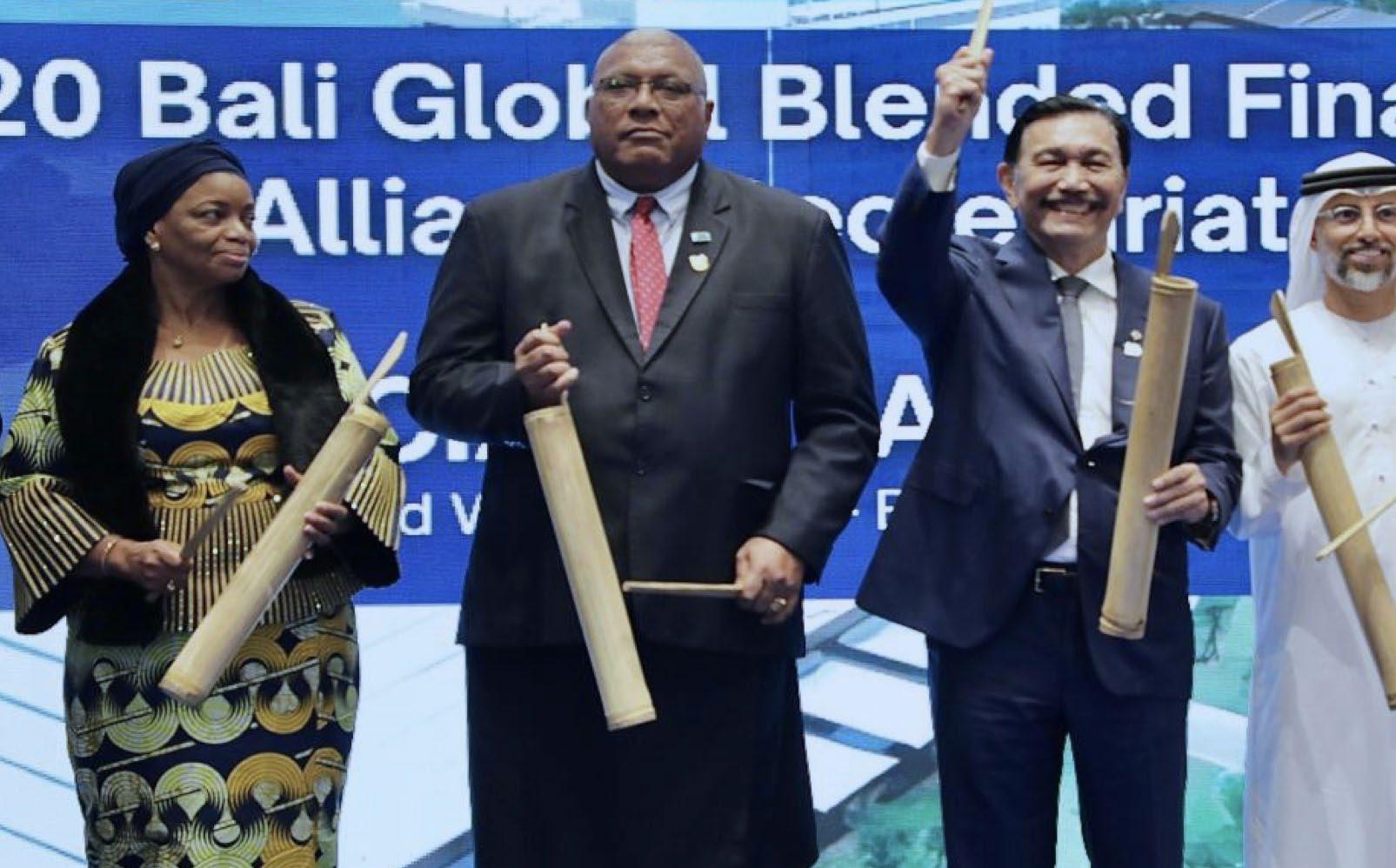
promote capacity building and strengthen network across relevant actors, while working on the premise of the G20 Blended Finance Principles with OECD. By harnessing the principles of South-South Cooperation, the alliance aims to leverage the strengths of diverse communities to drive progress towards shared goals. Through collaboration and solidarity, countries will work together to design and implement policies, develop institutional structures, technology, and financing solutions necessary for achieving the SDGs.
During the launch event, Coordinating Minister for Maritime Affairs and Investment Luhut B. Pandjaitan emphasized the urgent need for climate investment in developing countries, Least Developed Countries (LDCs), and island nations. He highlighted G20 Bali GBFA’s commitment to supporting countries in their transition towards sustainable development, particularly in areas such as energy, forests, the blue economy,

infrastructure, tourism, health, and water conservation.
Headquartered in Bali’s Sanur Special Economic Zone, the G20 Bali GBFA Secretariat will be led by Mari Elka Pangestu, Presidential Special Envoy for Climate Finance, under the coordination of Indonesia’s Coordinating Ministry for Maritime Affairs and Investment. The founding member countries through the Secretariat will prepare the process of the establishment of the G20 Bali Global Blended Finance Alliance to become an International Organization (IO). Prior to the establishment as an IO, the Secretariat can already start various activities in line with its mission, in collaboration with partners, including philanthropic entities, non-government organizations, other international organizations, and private sector. Minister Luhut Pandjaitan called upon all participating countries to strengthen international cooperation through various forums, including the upcoming G20 Summit in Rio de Janeiro, Brazil. He urged countries to join the G20 Bali GBFA and underscored the importance of collective action in catalyzing transformative change on a global scale to build a brighter and more sustainable future for generations to come.
The historic G20 Bali Global Blended Finance Alliance “Letter of Intent” Signing Ceremony can be viewed in this documentation video. https://www.youtube.com/ watch?v=VgGevMZBpC4
In parallel to the signing of the G20 Bali Global Blended Finance Alliance Letter of Intent at the 10th World Water Forum, the Secretariat has held a series of preliminary dialogues.
The G20 Bali Global Blended Finance Alliance Dialogue co-convened with the Tri Hita Karana Forum and World Economic Forum focused on a just energy transition, forests, the blue economy including mangroves and seagrass forests, infrastructure, tourism and health, including the Tri Hita Karana Investor Forum on Special Economic Zones and Golden Visa to support Better Business Better World and SDGs.
The Dialogues featured distinguished guests, Indonesia Coordinating Minister of Economic Affairs and Tri Hita Karana Forum Co-host, Airlangga Hartarto; Minister of Energy and Mineral Resource, Arifin Tasrif; Minister of Maritime and Fisheries, Sakti W, Trenggono; Minister of National Planning Development, Suharso Monoarfa; Minister of Tourism and Creative Economy, Sandiaga Uno; Vice Minister of State-Owned Enterprises, Kartika Wirjoatmodjo; Former Indonesia Ambassador to the US, Rosan Roeslani; OECD Secretary General Mathias Cormann; World Bank VP of East Asia and Pacific, Manuela Ferro; President Director PT PLN, Darmawan Prasodjo; President Director PT SMI, Edwin Syahruzad; and senior representatives from Ministry of Finance, Ministry of Environment and Forestry, Ministry of Communication and Informatics, Asian Development Bank, Green Climate Fund et. al. ■
INDONESIA’S STEADFAST COMMITMENT TO CHAMPIONING BLENDED FINANCE WITHIN THE G20 PROCESS REFLECTS A SHARED VISION OF A WORLD WHERE PROSPERITY IS ACCESSIBLE TO ALL. THE G20 BALI GLOBAL BLENDED FINANCE ALLIANCE INITIATIVE EMERGED AS A BEACON OF HOPE IN THE FIGHT AGAINST CLIMATE CHANGE AND THE PURSUIT OF SUSTAINABLE DEVELOPMENT.
On May 19th 2024, Indonesia and United Arab Emirates held the groundbreaking ceremony of the Mohamed bin Zayed-Joko Widodo International Mangrove Research Center, graced by the Indonesia’s Coordinating Minister of Maritime and Investment Affairs, Luhut B. Pandjaitan and UAE’s Minister of Climate Change and Environment Amna bint Abdullah Al Dahak, and Minister of Energy and Infrastructure, Suhail Mohamed Al Mazroui.
The International Mangrove Research Center located at the Kura Kura Bali Special Economic Zone, signifies the close collaboration between Indonesia and UAE, and the two countries’ commitment to tackle climate change. The two countries aim to restore and protect 15 million hectares of mangroves globally by 2030. The International Mangrove Research Center (IMRC) will play a key role in
driving the restoration of Mangroves ecosystem as nature-based solution to combat climate change and for coastal protection. The IMRC will conduct cutting-edge research on mangrove conservation, education and the use for biotechnology aided by high tech artificial intelligence and drones. The IMRC is expected to house conservation scientists, experts and researchers from around world, and fosters global community participation and promote knowledge exchange.
As a large archipelagic country, Indonesia has one of the longest coastline in the world, and home to the world’s largest and most diverse mangrove ecosystems, covering 23 percent of mangroves globally. Highly efficient at sequestering carbon dioxide from the atmosphere at a rate much higher than other types of forests, the mangrove ecosystems are vital to climate change adaptation.
Indonesia’s mangroves are estimated to store 3.14 billion tons of carbon dioxide, an amount equivalent to the emissions produced by approximately 2.5 billion vehicles driven for one year.1 Apart from protecting coastal communities from coastal erosion and storm surges, the mangrove ecosystems is critical for biodiversity conservation and sustaining livelihood of the coastal communities through fisheries, ecotourism and carbon economic value.
The IMRC Center will be part of the Bali Ngurah Rai Grand Forest Park for mangrove forest rehabilitation and conservation initiated by the Indonesian Ministry of Environment and Forestry, and will support Indonesia’s ongoing ambitious target of restoring 600,000 hectares of mangroves. ■
1. https://www.worldbank.org/en/news/feature/2023/11/30/ planting-mangrove-forests-is-paying-off-in-indonesia

Launched at the G20 Bali Global Blended Finance Dialogue preceding the 10th World Water Forum in Bali, the Blue Intelligence Resource Unit, or BIRU which means ‘blue’ in Bahasa Indonesia is a collaborative initiative between Conservation International, Konservasi Indonesia, Kura Kura Bali, in partnership with MAP Club.
The mission of BIRU is to serve as a center of excellence to highlight current and future conservation and sustainability initiatives thoughout Indonesia and Asia Pacific via its three pillars: communication, education and partnership with the community.
Through this multifaceted approach, BIRU will serve as a catalytic platform to boost nature-positive economy and conservation through knowledge exchange, capacity building, learning, and empowering individuals and
organisations in Indonesia and the region to make informed decisions and take meaningful action towards a more sustainable future. BIRU will engage various stakeholders like communities, youth, academics, businesses, government, and NGOs to encourage collaboration and innovation. Its goal is also to support the Indonesia Government and initiatives like Blue Halo S a ‘protection and production’ approach to conservation and sustainable fisheries, Coral Reef protection, and the blue-green economy.
Located strategically in Kura Kura Bali, an island microcosm representing Indonesia rich ecosystems of mangrove, wetland, biodiversity and coral reefs, BIRU is making the ecosystems experience accessible for youths and the community at large.
BIRU’s partnership with MAP Club
will pave the way for a more direct engagement with the populace and bringing actions closer to the consumers. MAP Club, with over 150 lifestyle brands, has the largest retail membership in Indonesia with over 4.2 million members. A percentage of members’ purchase using the MAP loyalty card will contribute to Konservasi Indonesia programs. Through MAP Club app, members will discover the range of conservation programs from sustainable fisheries; protection of forest, peatland, mangrove, coral reefs; social forestry; marine life conservation and development of Marine Protected Areas (MPAs). The partnership is a breakthrough for galvanizing individual actions into a collective force to make a real and lasting impact on environmental conservation. ■
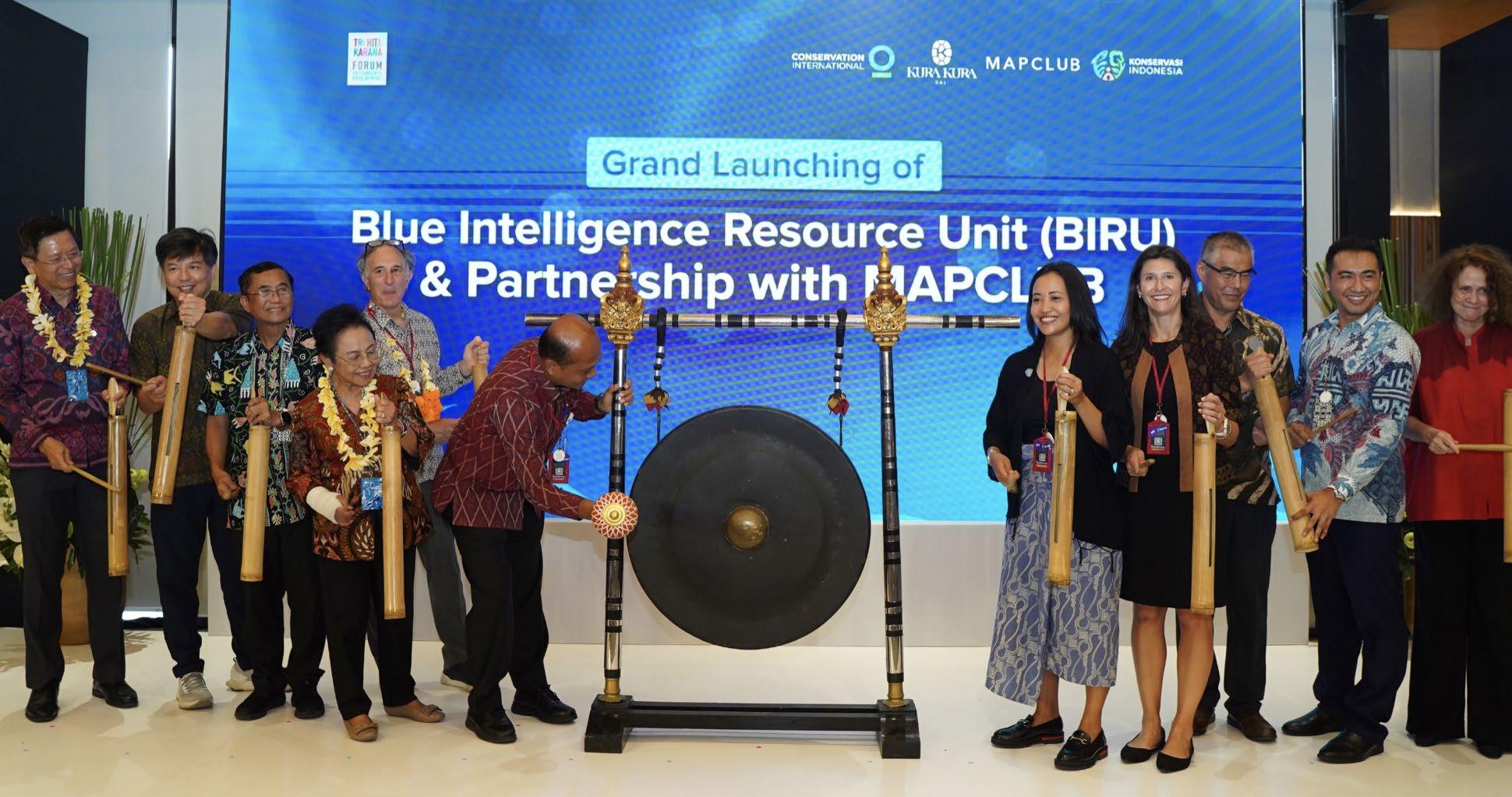
Despite the challenges posed by a weakened global economy, Indonesia’s economy has grown robustly and is set on a trajectory to become the fourth largest economy in the world by midcentury. The Government of Indonesia is committed to delivering this growth in a sustainable and inclusive manner, and to fulfill its Nationally Determined Contribution (NDC) target and working towards a net zero by 2060.
The commitment has been met with positive support from the global community, with initiatives such as the USD 20 billion Just Energy Transition Partnership (JETP) scheme pledged to catalyze green growth through decarbonization and delivering a just
transition for its energy sector. The partnership is expected to support the transition by retiring Indonesia’s coal power plants and shift significantly to renewable energy, reduce significant emission and drive sustainable development while protecting the livelihoods of communities in affected sectors. The economic opportunities for decarbonizing and transitioning Indonesia’s energy sector to renewables are huge but there are systemic barriers and challenges.
In support of the Government of Indonesia’s commitment towards low carbon development and net zero ambition, The Happy Energy Action Leadership (HEAL) initiative was
launched at the G20 Bali Global Blended Finance Dialogue in Bali.
Co-designed by the United In Diversity Foundation and Rocky Mountain Institution, HEAL is a novel approach to accelerate Indonesia’s just energy transition through multistakeholders learning and co-creation journey to address systemic barriers and challenges collectively.
The HEAL program will employ MIT system dynamic and system thinking, along with Theory U awareness-based system change approach for rethinking current patterns and mindset shifts for advancing energy transition solutions amongst stakeholders from across sectors: policy-makers, development
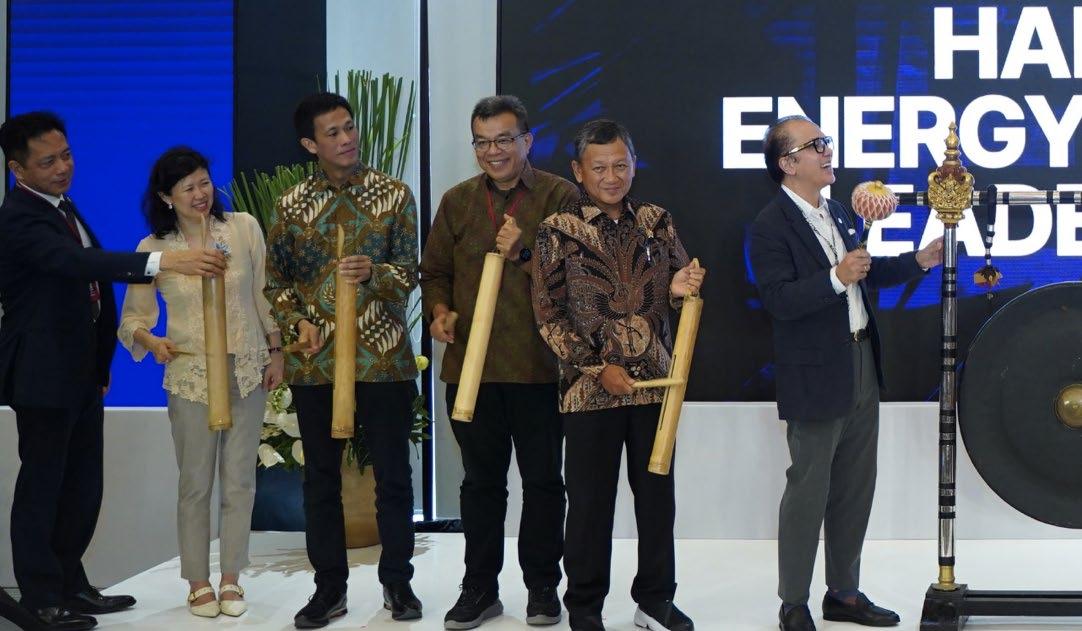

financial institutions, state-owned enterprises, independent power producers, investors, philanthropic organizations and think tanks.
HEAL’s six pillars for system transformation include using authentic learning projects; whole-system convening; stakeholders alignment; capacity building; collective leadership; and acceleration of energy transition.
The program is designed to support the just energy transition process through the co- creation of financial, technical, and policy solutions crucial for a productive implementation; acting as catalyst for cross-sectors stakeholders shared learning to build capacity and form strong partnerships, foster robust energy governance for an enabling environment to unlock investments
and accelerate private capital flows to ensure an effective just energy transition. By leveraging on its plentiful resources essential for greening the energy sector, expanding on policy framework conducive for decarbonisation with international support and collaboration, Indonesia could potentially be the beacon of hope for a global movement toward achieving net zero emissions. ■


In the evolving battle against climate change, the integrity of carbon credit markets stands as a critical frontier. EcoSpera emerges as a visionary force, poised to redefine this landscape with its innovative solution that ensures unparalleled transparency, traceability, and integrity. Rooted in the lessons of past projects and aligned with the latest regulatory standards, including the Corporate Sustainability Reporting Directive (CSRD), European Sustainability Reporting Standards (ESRS), and the Voluntary Carbon Market Integrity Initiative (VCMI), EcoSpera’s mission goes beyond remediation to set a new benchmark in environmental accountability. Through its unique approach, combining blockchain technology with a cooperative governance model, EcoSpera is not just addressing the climate crisis but is leading the charge towards a sustainable future with high-integrity carbon credits.
The Kariba REDD+ project, once a beacon of hope for carbon offsetting, aimed to protect forests and wildlife on the Zimbabwe-Zambia border. Despite its ambitious goals for sustainability and carbon sequestration, it faced criticism for its shortcomings in verifiability and long-term environmental impact. This case underscores a broader issue within the carbon credit market—a pressing need for verifiable, sustainable projects that deliver on their promises.
The regulatory landscape is evolving to address these challenges. The CSRD/ ESRS requirements and the VCMI’s new guidelines for high-integrity carbon credits represent significant strides toward ensuring that carbon offset projects are both environmentally and socially beneficial. These regulations aim to establish clear, stringent standards for transparency, accountability, and the real-world impact of carbon credits, pushing the
market towards more reliable and impactful practices.
This backdrop of ambitious projects falling short and tightening regulations highlights the urgent necessity for innovative approaches like EcoSpera’s. By leveraging advanced technologies and adhering to the highest standards of integrity, EcoSpera is positioned to address these shortcomings, offering a new paradigm that meets and exceeds the evolving demands of the global carbon credit market.
EcoSpera’s Mission and innovative approach
EcoSpera’s mission transcends the traditional boundaries of the carbon credit market, championing a future where integrity, traceability, and transparency are not just ideals, but foundational pillars. At its core, EcoSpera leverages cutting-edge blockchain technology to ensure every carbon credit is verifiable and secure,

eliminating doubts about authenticity and impact. This technological backbone is complemented by EcoSpera’s governance through a Liechtenstein Venture Co-operative (LVC), a structure that combines the agility of a venture-backed entity with the ethical and participatory ethos of a cooperative. This innovative governance model ensures that all stakeholders have a voice in the direction and decisions of the initiative, enhancing accountability and aligning with global sustainabilitygoals.
The Decentralized Autonomous Organization (DAO) further democratizes EcoSpera’s operations, enabling community members from around the world to contribute to its mission. This approach not only fosters a broad sense of ownership and involvement but also ensures that a diverse range of perspectives and expertise shapes the future of EcoSpera. By integrating community governance with blockchain’s
ECOSPERA’S MISSION TRANSCENDS THE TRADITIONAL BOUNDARIES OF THE CARBON CREDIT MARKET, CHAMPIONING A FUTURE WHERE INTEGRITY, TRACEABILITY, AND TRANSPARENCY ARE NOT JUST IDEALS, BUT FOUNDATIONAL PILLARS.

transparency and the strategic framework of an LVC, EcoSpera is pioneering a holistic approach to carbon credit verification.
This model addresses the market’s critical need for projects that can be thoroughly audited and trusted.
EcoSpera’s platform offers an end-toend solution from the initial certification of a carbon credit to its final retirement, ensuring that each step in the process is recorded, transparent, and aligned with the highest standards of environmental integrity. Through this comprehensive approach, EcoSpera is not just contributing to the global fight against climate change but is also setting a new standard for how carbon credits are generated, traded, and retired. The ultimate goal is to inspire confidence among all stakeholders—investors, environmental groups, and regulatory bodies—that the carbon credits represent real, tangible environmental benefits.
The EcoSpera Ecosystem represents an integrated approach to carbon credit verification, ensuring every step from seed planting to credit retirement is transparent, traceable, and aligned with the highest standards of environmental integrity. By weaving together specialized
components like EcoAdvis, Trees4CO2, Better Globe Forestry, Nzatu Food Group, TraceX, and the Spera Impact Blockchain (SPIT), EcoSpera not only adheres to but also surpasses the stringent requirements set by CSRD, ESRS, and VCMI.
• Spera Impact Blockchain (SPIT) is the backbone of the EcoSpera ecosystem and enhances it’s traceability, offering an additional layer of security and verification for every transaction within the EcoSpera ecosystem. By making all data related to carbon credits readily available and indisputable, SPIT ensures the integrity of the credits and the projects they represent.
• EcoAdvis offers expert project management and compliance services, guiding projects to align with international sustainability standards, ensuring that each initiative within the EcoSpera ecosystem contributes positively to the environment and society while adheringto regulatory requirements.
• Trees4CO2 embodies the direct action of reforestation and afforestation, translating carbon credits into real-world environmental benefits. This initiative focuses on planting species like mahogany and moringa, which are known for their high carbon sequestration rates, directly combating climate change.
• Better Globe Forestry focuses on sustainable forestry practices that promote biodiversity, prevent desertification, and provide sustainable livelihoods for local communities. Its operations generate verifiable carbon credits by maintaining healthy forests that act as carbon sinks.
• Nzatu Food Group integrates sustainable agriculture practices, ensuring that projects support food security and socio-economic development, emphasizing the socialsustainability aspect of carbon credit projects.
• TraceX leverages blockchain technology to provide a transparent and unalterable record of carbon credit transactions, from the initial issuance to their final retirement. →
→ This ensures that all stakeholders can trust the authenticity and impact of the credits. This comprehensive ecosystem approach ensures that every carbon credit issued by EcoSpera is backed by real, verifiable environmental actions. By exceeding the standards set by CSRD, ESRS, and VCMI, EcoSpera not only contributes to the fight against climate change but also sets a new benchmark for transparency and integrity in the carbon credit market. Through this model, EcoSpera demonstrates how innovative technologies and cooperative governance can be harnessed to create a sustainable future, showcasing a scalable, replicable solution for global environmental challenges.
Addressing challenges and setting a new standard for carbon and biodiversity credits
Expanding the content to triple its length while maintaining the essence and introducing more depth:
EcoSpera’s strategic approach is deeply informed by the insights gained from the analysis of past carbon credit initiatives, such as the Kariba project. Recognizing the critical need for genuine sustainability, reliable verification processes, and meaningful community engagement, EcoSpera has engineered its model to transcend these historical pitfalls.
Central to its strategy is an unwavering commitment to the principles outlined by the Voluntary Carbon Market Integrity Initiative (VCMI). Through meticulous alignment with VCMI’s Monitoring, Reporting, and Assurance Framework, EcoSpera ensures each carbon credit’s journey from issuance to retirement is meticulously documented and verified, setting a precedent in the industry.
Further advancing the standard, EcoSpera embraces ‘Scope 3 Flexibility’ within its operational framework. This innovative approach allows for a more inclusive and comprehensive accounting of carbon credits, enhancing the scope and credibility of claims. By meticulously adhering to and expanding upon VCMI guidelines, EcoSpera is not merely participating in the market; it is actively redefining the paradigms of
accountability, transparency, and environmental stewardship.
EcoSpera’s holistic model, built on the lessons of past endeavors and the rigorous standards of current environmental integrity frameworks, positions it as a vanguard in the carbon credit market. The initiative’s forward-thinking approach—marrying technological innovation with stringent adherence to global sustainability standards—illustrates a blueprint for future projects. EcoSpera’s commitment to exceeding existing standards and setting new benchmarks reflects a broader mission: to cultivate a carbon credit market that is not only robust and reliable but also a true catalyst for global environmental change.
To fully articulate EcoSpera’s vision and its strategic direction for a sustainable future, it’s essential to highlight the initiative’s commitment to deepening its impact on the global carbon credit market through innovation, collaboration, and expansion. EcoSpera is poised to extend its reforestation and afforestation projects, incorporating a broader array of species and ecosystems, thus enriching biodiversity and EcoSpera exemplifies a revolutionary stride towards sustainability in the carbon credit market, setting new benchmarks for transparency, integrity, and environmental stewardship. Its comprehensive approach and innovative solutions underscore a commitment to addressing climate change, fostering biodiversity, and promoting sustainable development. As EcoSpera advances, its model of collective action, underpinned by cutting-edge technology, offers a beacon for global efforts towards a greener future. This initiative not only highlights the potential for impactful change but also inspires a broader movement towards sustainable practices worldwide, making EcoSpera a paragon for future endeavors in environmental conservation and carbon reduction.enhancing carbon sequestration capacities. The initiative’s expansion into new territories is strategically planned to ensure that
ECOSPERA STANDS AS A GROUNDBREAKING LEADER IN THE CARBON CREDIT MARKET, UNIQUELY OFFERING PLANT-LEVEL VERIFICATION AND CERTIFICATION WITH A DETAILED AUDIT TRAIL FROM SEED TO RETIREMENT. THIS UNPARALLELED APPROACH MARKS ECOSPERA AS NOT JUST A PARTICIPANT IN THE MARKET BUT AS THE VANGUARD OF A SUSTAINABILITY REVOLUTION.

each project aligns with local ecological conditions and community needs, fostering environmental resilience and sustainable development.
Moreover, EcoSpera envisions leveraging its blockchain technology to further enhance the traceability and verification of carbon credits, setting new industry benchmarks for integrity and reliability. This technological advancement will enable EcoSpera to offer unparalleled transparency in its operations, reinforcing stakeholder confidence and driving the adoption

of high-integrity carbon credits globally. Through collaborative efforts with governments, NGOs, and local communities, EcoSpera aims to amplify its contribution to combating climate change, promoting sustainable land management practices, and supporting socio-economic development in underserved regions. This comprehensive approach underscores EcoSpera’s dedication to not just mitigating global carbon emissions but also to fostering a more equitable and sustainable world. ■
EcoSpera stands as a groundbreaking leader in the carbon credit market, uniquely offering plant-level verification and certification with a detailed audit trail from seed to retirement. This unparalleled approach marks EcoSpera as not just a participant in the market but as the vanguard of a sustainability revolution. By joining the EcoSpera’s 100% Together Community, members become integral to a movement setting new global standards for environmental integrity. This opportunity to be part of such a pioneering venture is a call to action for those looking to make a tangible impact on our planet’s future. EcoSpera is not just inviting members; it’s inviting change-makers to be at the forefront of an environmental revolution, making a real difference in the fight against climate change.
AUTHOR: Simon Tribelhorn CEO at Liechtenstein Bankers Association (LBA)


In our fast-moving world, two terms are always in the headlines: Digitalisation and sustainability. Both are not just trends, but also decisive factors that will shape our future. In the world of finance in particular, artificial intelligence (AI) and blockchain play a central role in promoting sustainable finance. But how exactly does it work?
Artificial intelligence and sustainability
Artificial intelligence, often simply referred to as “AI”, is a field of computer science that enables machines to mimic human-like thought processes. In the financial world, AI can be used to identify investment opportunities that are both profitable and sustainable. With the help of AI, banks and financial institutions can analyse huge amounts of data and find out which companies and projects offer the best opportunities to generate both financial profit and a positive impact on the environment and society.
Blockchain: more than just cryptocurrency
When people hear about blockchain, the first thing that comes to mind is Bitcoin or other cryptocurrencies. But the technology behind these digital currencies has the potential to go far beyond finance. Blockchain generally helps to bring transparency and trust to the financial sector by ensuring that every transaction is verified and immutable. This can be particularly useful when it comes to ensuring that investments are actually sustainable.
Why is this important?
The world is facing numerous challenges, from the climate crisis to social injustice. As the interface between investors on the one hand and capital recipients on the other, the financial industry has an important steering function and therefore the opportunity to exert a positive influence on these problems by investing in sustainable
projects and companies or launching corresponding products on the market. At the same time, digitalisation offers the tools to make these investments more efficient, transparent and trustworthy.
Blockchain and AI: at odds with sustainability?
At first glance, it may seem as if blockchain and AI are at odds with sustainability, especially when you think about the energy consumption of large blockchain networks or the resources required for advanced AI models. At least, this is the argument repeatedly put forward by critics. But in reality, these technologies can help to reduce energy consumption and utilise resources more efficiently. Blockchain, for example, can help to reduce paper consumption by replacing physical documents with digital contracts. AI can be used to analyse energy consumption patterns and make
suggestions to increase efficiency. These technologies are therefore not only compatible with sustainability, but can also help to promote it.
Why courage is needed now
As a banking industry, we are at a crucial point. The world is changing and we need to have the courage to embrace these changes - especially with regard to blockchain and AI. It’s not just about moving with the times, but also about offering our customers real added value. By integrating these technologies into our core business and developing new products, we can offer more efficient, secure and transparent services. Even though we are still at a very early stage and many things need to be tried out and experimented with blockchain, tokenisation and AI first, this is not just a gimmick - it shouldn’t be - but an investment in the future. Of course, courage also requires a willingness to invest in these technologies and take the risk of making mistakes. But only through such courage and the acceptance of mistakes as learning opportunities can we grow and develop as an industry.
Role and stance of the LBA
Digitalisation and sustainability are the two core pillars of our banking centre strategy, Roadmap 2025. We are deeply convinced of the importance and potential of increasing digitalisation and sustainability as well as digitalisation for sustainability. However, this is not easy, does not happen overnight and, of course, we want to do it “right”. We are therefore in a double transformation phase, so to speak. Why? Because we believe that these two factors have the power to fundamentally change the way we think about money and investments. However, this also means that sustainability and digitalisation are the two key competitive factors and will determine in the medium to long term whether a financial centre, a banking centre or an individual institution will still be competitive at all. In short, we see digitalisation and sustainable financing as the future of the financial sector.
DIGITALISATION AND SUSTAINABILITY ARE THE TWO CORE PILLARS OF OUR BANKING CENTRE STRATEGY, ROADMAP 2025. WE ARE DEEPLY CONVINCED OF THE IMPORTANCE AND POTENTIAL OF INCREASING DIGITALISATION AND SUSTAINABILITY AS WELL AS DIGITALISATION FOR SUSTAINABILITY.
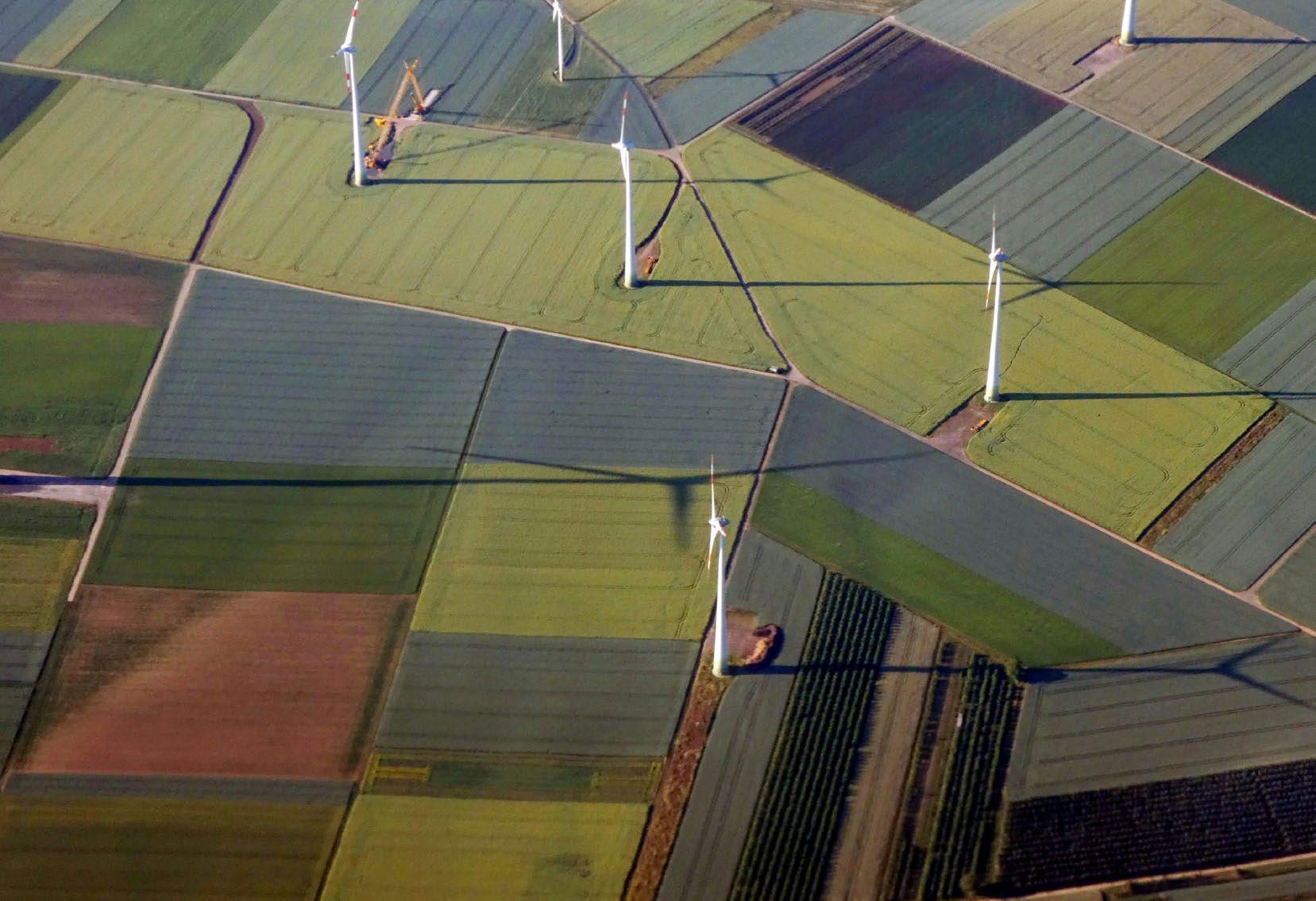
And that is precisely why we are involved in both areas at all levels at the Bankers Association itself and, above all, why we are looking for the connection, because ‘no sustainability without innovation and no innovation without sustainability’. And the same applies to the various projects we have launched in this area over the past 12 monthsfrom the climate-neutral non-fungible tokens (NFTs for short) to the various
About Liechtenstein Bankers Association (LBA)
collaborations in the blockchain and AI sector. These collaborations and projects in particular allow us to learn and experiment.
Overall, AI and blockchain have the potential to revolutionise the way we think about sustainable finance. We want to help ensure that our financial centre is at the forefront of this revolution and that our future is both digital and sustainable. ■
The Liechtenstein Bankers Association was founded in 1969 and is the voice of Liechtenstein banks at home and abroad. It is one of the most important associations in the country and plays an important role in the successful development of the financial centre. As a member of the European Bankers Federation (EBF), the European Payments Council (EPC), the European Parliamentary Financial Services Forum (EPFSF), the Liechtenstein Bankers Association is an important member of key bodies at European level and plays an active role in the European legislative process. Since 2017, the Liechtenstein Bankers Association has also been a member of the Public Affairs Council (PAC) with offces in Washington and Brussels, and since 2018, a member of the international network “Financial Centres for Sustainability” (FC4S). With the Roadmap 2025, the LBA has placed an even stronger focus on the two major topic «sustainability» and «digitalisation». As a consequence, the LBA joined the following two initiatives in 2021, each of which is a leader in its field: firstly, it has become an official supporter of the UN Principles for Responsible Banking and the Net-Zero Banking Alliance and secondly, it has become an affiliate member of the Canada-based Blockchain Research Institute (BRI), an independent, global think-tank dedicated to inspiring and preparing private- and public-sector leaders to be the catalysts of the blockchain transformation.
About LBA’s Roadmap 2025, the strategy for the entire Liechtenstein banking cente
The Roadmap2025 is the multi-year strategy of the Liechtenstein banking centre. It is all about “growth through sustainability and innovation”. Ongoing climate change is one of the greatest global challenges. We are the first generation to sustainably destroy our planet and probably the last to prevent it. The financing needed to achieve the Paris climate goals as well as the broader Sustainable Development Goals (SDGs) of the United Nations is enormous. According to PWC, the annual global investment required to achieve the SDGs amounts to 7 trillion US dollars. Currently, only one seventh of this is financed by the public sector. A substantial part must therefore come from the private sector. The financial sector, and banks in particular, can and must therefore play a central role in mobilising and channelling these financial resources. This means a great responsibility, but also brings with it a great opportunity. If we successfully accompany this transformation, we will create the necessary growth to continue to create prosperity. Increasing digitalisation has a huge potential to accelerate the needed transformation for the benefit of our future generations.
We can collectively help accelerate the rate of building renovation

In the European Union and the United States, major policies are defining efforts to reduce greenhouse gas emissions and achieve energy efficiency.
The European Climate Law, for example, establishes a goal of net zero greenhouse gas emissions by 2050 and includes legal requirements for EU countries to set intermediate targets for reducing emissions. In the United States, the Inflation Reduction Act commits to achieving a 40% reduction in economy wide GHG emissions by 2030.
As the momentum for achieving net zero economies increases, building renovation has emerged as a central emphasis due to several factors:
• Building operations, the building construction industry, and building and infrastructure materials generate 40% of annual global GHG emissions
• According to the US Department of Energy, residential and commercial buildings use about 40% of the nation’s energy for lighting, heating, cooling, and appliances while commercial buildings consume 70% of all electricity
• In Europe, the buildings sector consumes 40% of the continent’s energy demand.
• Building materials such as concrete, steel, and aluminum lock carbon emissions in place and contribute 23% of the total global CO2 emissions per year
• Projections indicate that the largest wave of building growth will occur from 2020 through 2050
Building renovation offers an environmental and economic way forward
Several methods exist for increasing energy efficiency and reducing the carbon footprint of commercial buildings. Design optimization based on reducing carbon emissions minimizes the use of materials that embody carbon and transitions to integrating sustainable materials or decarbonized conventional materials into building designs. Using recycled materials reduces the carbon footprint of buildings. Advanced connected and interoperable technologies allow equipment and
systems to communicate with one another and conserve energy while meeting the lighting, security, safety, cooling, and heating needs of residents. For example, Installing LED lighting systems and then connecting those systems to other building control systems reduces energy consumption and costs.
Upgrading buildings for reduced environmental impacts also produces a promising economic outlook for commercial property owners. Renovations focused on green buildings that include replacing outdated lighting fixtures with connected lighting systems, installing energy-efficient HVAC systems, and using low-carbon building materials reduce energy costs. In turn, improving indoor environmental quality and sustainability promotes the health and well-being of employees and residents. Sustainable, human-centric workplaces attract tenants and respond to the expectations of staff returning to the office.

Green building projects produce higher economic returns
Certainly, a building renovation project requires an investment. However, improving the energy efficiency and occupant satisfaction of a property can yield a higher return-on-investment.
Several analyses of new green building and renovation projects compared to standard construction practices show a higher ROI within a shorter time span. Profitability increases through improved energy efficiency and decreases operating costs. The ability to attain healthy/green building certifications demonstrates the commitment to sustainability that tenants, clients, and employees seek.
Sustainable finance options offset |the challenges of acquiring the capital needed for green building and renovation projects. Blended financing allows owners to increase the scale of projects while controlling risk. Building owners may also implement renovation plans through innovative financing methods that include light-as-a-service

AS THE CONSEQUENCES OF CLIMATE CHANGE BECOME MORE APPARENT EACH DAY, THE LEVEL OF URGENCY—AND UNCERTAINTY—INCREASES. MITIGATING THE EFFECTS OF CLIMATE CHANGE REQUIRES COMMITMENT FROM EVERY INDIVIDUAL, CORPORATION, AND GOVERNMENT.
(LaaS), energy-efficiency-as-a-service (EEaaS), and energy services company (ESCO) models. Each addresses market barriers, enables energy efficient technologies through monthly payments rather than large up-front capital costs, and encourages owners to invest in energy efficiency without immediately receiving the benefit.
Mitigating climate change requires an immediate response and long-term planning
As the consequences of climate change become more apparent each day, the level of urgency—and uncertainty— increases. Mitigating the effects of climate change requires commitment from every individual, corporation, and government. While international policies set long-range targets for achieving net zero economies, efforts to reduce carbon emissions and energy consumption must continue and increase. As a result, construction companies must commit to replacing materials that contribute to emissions
sustainable building materials.
Encouraging this commitment begins with increased resolve at the corporate level to reduce emissions through green building renovations and new building designs.
Interoperable, connected technologies offer a solution for reducing greenhouse gas emissions and energy consumption. Within those technologies, LED lighting systems serve as the starting point through flexible design options, low operating costs, and excellent heat dissipation. The capabilities offered through LED lighting systems that connect with other building operations allow design teams to create sustainable office environments that appeal to tenants and occupants. Focusing on such critical solutions at COP28 can help accelerate climate change mitigation. ■
To learn more about how connected technologies align with global energy policies, read our white paper Good connectivity: A key to decarbonizing the building sector.


Welcome to your private island home where magic and memories go hand in hand. Rooted in honoring the Fijian way of life, creating a world community, and preserving the environment - on Turtle Island it’s easy to imagine the world the way it should be.
The Island is powered by solar energy, produce is locally grown, and the accommodations are hand-crafted by Fijian artisans.
With just 14 villas, acres of serene forests and 12 private beaches, Turtle Island serves as an idyllic sanctuary for travelers seeking connection, community, culture, and consciousness.
